
Graduate cover letter examples
As a recent graduate, you need to effectively showcase your degree and relevant skills on your CV and cover letter.
But when you’re just starting out in your career, it can be tough to know where to begin.
In the guide below, we’ll teach you how to create a clear, concise and professional application using our graduate cover letter examples and handy top tips.
CV templates
Graduate cover letter example 1
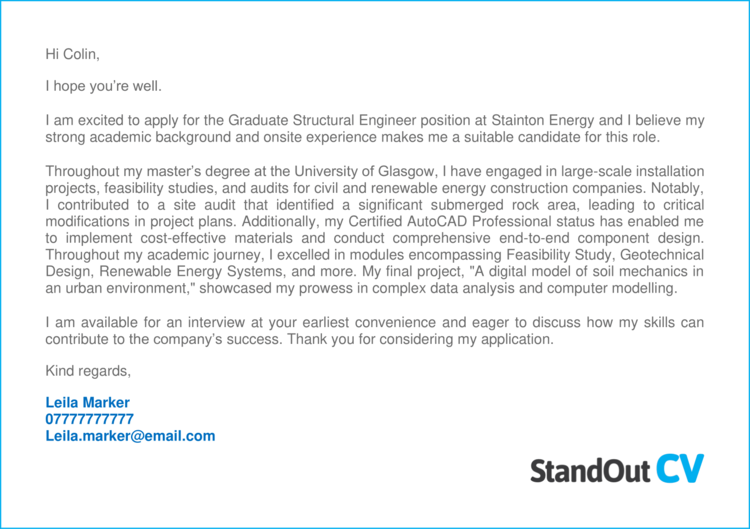
Build your CV now
Graduate cover letter example 2
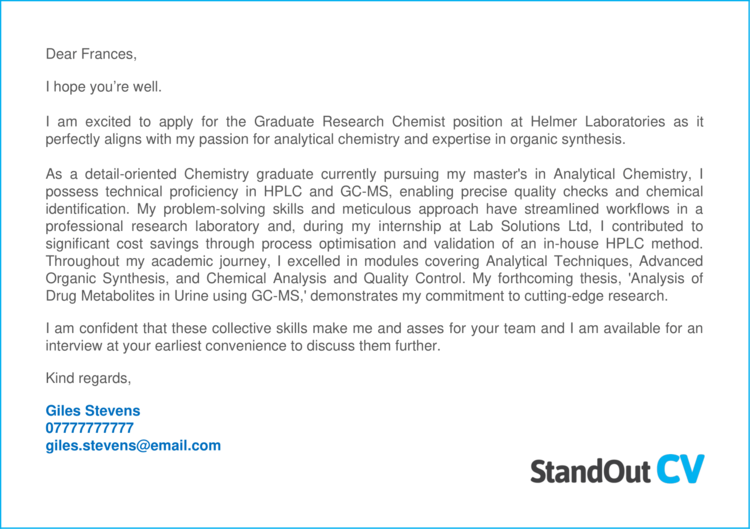
Graduate cover letter example 3
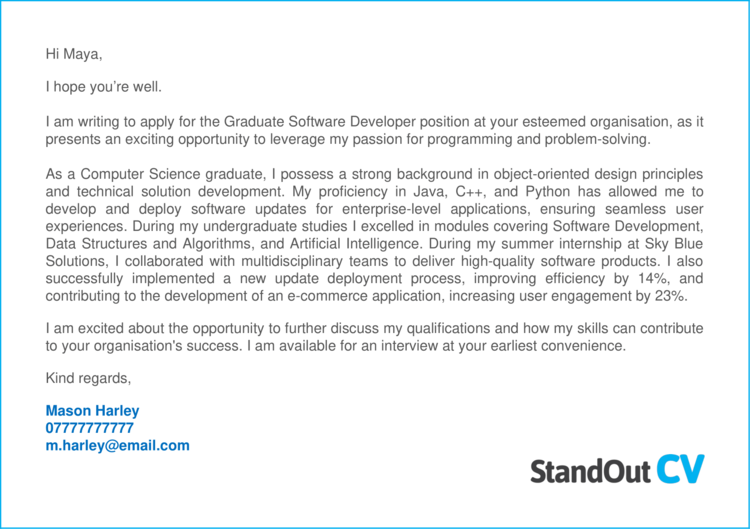
These 3 Graduate cover letter examples will provide you with some good ideas on how to format a cover letter, along with the type of message you should be trying to put across to recruiters .
To further understand exactly how you can write a cover letter that will get you noticed, check out our further guidance.
How to write a Graduate cover letter
Here’s how to write your own winning Graduate cover letter

Write your cover letter in the body of an email/message
When writing your Graduate cover letter, it’s best to type the content into the body of your email (or the job site messaging system) and not to attach the cover letter as a separate document.
This ensures that your cover letter gets seen as soon as a recruiter or employer opens your message.
If you attach the cover letter as a document, you’re making the reader go through an unnecessary step of opening the document before reading it.
If it’s in the body of the message itself, it will be seen instantly, which hugely increases the chances of it being read.

Start with a friendly greeting

To kick your cover letter off, start with a friendly greeting to build rapport with the recruiter instantly.
Your greeting should be personable but professional. Not too casual, but not too formal either
Go with something like…
- Hi [insert recruiter name]
- Hi [insert department/team name]
Avoid old-fashioned greetings like “Dear sir/madam ” unless applying to very formal companies.
How to find the contact’s name?
Addressing the recruitment contact by name is an excellent way to start building a strong relationship. If it is not listed in the job advert, try these methods to find it.
- Check out the company website and look at their About page. If you see a hiring manager, HR person or internal recruiter, use their name. You could also try to figure out who would be your manager in the role and use their name.
- Head to LinkedIn , search for the company and scan through the list of employees. Most professionals are on LinkedIn these days, so this is a good bet.
Identify the role you are applying for
Once you’ve opened up the cover letter with a warm greeting to start building a relationship, it is time to identify which role you want to apply for.
Recruiters are often managing multiple vacancies, so you need to ensure you apply to the correct one.
Be very specific and use a reference number if you can find one.
- I am interested in applying for the position of *Graduate position* with your company.
- I would like to apply for the role of Sales assistant (Ref: 406f57393)
- I would like to express my interest in the customer service vacancy within your retail department
- I saw your advert for a junior project manager on Reed and would like to apply for the role.
See also: CV examples – how to write a CV – CV profiles
Highlight your suitability
The sole objective of your cover letter is to motivate recruiters into to opening your CV. And you achieve this by quickly explaining your suitability to the roles you are applying for.
Take a look at the job descriptions you are applying to, and make note of the most important skills and qualifications being asked for.
Then, when crafting your cover letter, make your suitability the central focus.
Explain why you are the best qualified candidate, and why you are so well suited to carry out the job.
This will give recruiters all the encouragement they need to open your CV and consider you for the job.

Keep it short and sharp
A good cover letter is short and sharp, getting to the point quickly with just enough information to grab the attention of recruiters.
Ideally your cover letter should be around 4-8 sentences long – anything longer will risk losing the attention of time-strapped recruiters and hiring managers .
Essentially you need to include just enough information to persuade the reader to open up your CV, where the in-depth details will sit.
Sign off professionally
To round of your CV, you should sign off with a professional signature.
This will give your cover letter a slick appearance and also give the recruiter all of the necessary contact information they need to get in touch with you.
The information to add should include:
- A friendly sign off – e.g. “Kindest regards”
- Your full name
- Phone number (one you can answer quickly)
- Email address
- Profession title
- Professional social network – e.g. LinkedIn
Here is an example signature;
Warm regards,
Jill North IT Project Manager 078837437373 [email protected] LinkedIn
Quick tip: To save yourself from having to write your signature every time you send a job application, you can save it within your email drafts, or on a separate documents that you could copy in.

What to include in your Graduate cover letter
Here’s what kind of content you should include in your Graduate cover letter…
The exact info will obviously depend on your industry and experience level, but these are the essentials.
- Your relevant experience – Where have you worked and what type of jobs have you held?
- Your qualifications – Let recruiters know about your highest level of qualification to show them you have the credentials for the job.
- The impact you have made – Show how your actions have made a positive impact on previous employers; perhaps you’ve saved them money or helped them to acquire new customers?
- Your reasons for moving – Hiring managers will want to know why you are leaving your current or previous role, so give them a brief explanation.
- Your availability – When can you start a new job ? Recruiters will want to know how soon they can get you on board.
Don’t forget to tailor these points to the requirements of the job advert for best results.
Graduate cover letter templates
Copy and paste these Graduate cover letter templates to get a head start on your own.
I hope you’re well.
I am excited to apply for the Graduate Structural Engineer position at Stainton Energy and I believe my strong academic background and onsite experience makes me a suitable candidate for this role.
Throughout my master’s degree at the University of Glasgow, I have engaged in large-scale installation projects, feasibility studies, and audits for civil and renewable energy construction companies. Notably, I contributed to a site audit that identified a significant submerged rock area, leading to critical modifications in project plans. Additionally, my Certified AutoCAD Professional status has enabled me to implement cost-effective materials and conduct comprehensive end-to-end component design. Throughout my academic journey, I excelled in modules encompassing Feasibility Study, Geotechnical Design, Renewable Energy Systems, and more. My final project, “A digital model of soil mechanics in an urban environment,” showcased my prowess in complex data analysis and computer modelling.
I am available for an interview at your earliest convenience and eager to discuss how my skills can contribute to the company’s success. Thank you for considering my application.
Kind regards,
Leila Marker ¦ 07777777777 ¦ [email protected]
Dear Frances,
I am excited to apply for the Graduate Research Chemist position at Helmer Laboratories as it perfectly aligns with my passion for analytical chemistry and expertise in organic synthesis.
As a detail-oriented Chemistry graduate currently pursuing my master’s in Analytical Chemistry, I possess technical proficiency in HPLC and GC-MS, enabling precise quality checks and chemical identification. My problem-solving skills and meticulous approach have streamlined workflows in a professional research laboratory and, during my internship at Lab Solutions Ltd, I contributed to significant cost savings through process optimisation and validation of an in-house HPLC method.
Throughout my academic journey, I excelled in modules covering Analytical Techniques, Advanced Organic Synthesis, and Chemical Analysis and Quality Control. My forthcoming thesis, ‘Analysis of Drug Metabolites in Urine using GC-MS,’ demonstrates my commitment to cutting-edge research.
I am confident that these collective skills make me and asses for your team and I am available for an interview at your earliest convenience to discuss them further.
Giles Stevens ¦ 07777777777 ¦ [email protected]
I am writing to apply for the Graduate Software Developer position at your esteemed organisation, as it presents an exciting opportunity to leverage my passion for programming and problem-solving.
As a Computer Science graduate, I possess a strong background in object-oriented design principles and technical solution development. My proficiency in Java, C++, and Python has allowed me to develop and deploy software updates for enterprise-level applications, ensuring seamless user experiences. During my undergraduate studies I excelled in modules covering Software Development, Data Structures and Algorithms, and Artificial Intelligence. During my summer internship at Sky Blue Solutions, I collaborated with multidisciplinary teams to deliver high-quality software products. I also successfully implemented a new update deployment process, improving efficiency by 14%, and contributing to the development of an e-commerce application, increasing user engagement by 23%.
I am excited about the opportunity to further discuss my qualifications and how my skills can contribute to your organisation’s success. I am available for an interview at your earliest convenience.
Mason Harley ¦ 07777777777 ¦ [email protected]
Writing an impressive cover letter is a crucial step in landing a Graduate job, so taking the time to perfect it is well worth while.
By following the tips and examples above you will be able to create an eye-catching cover letter that will wow recruiters and ensure your CV gets read – leading to more job interviews for you.
Good luck with your job search!
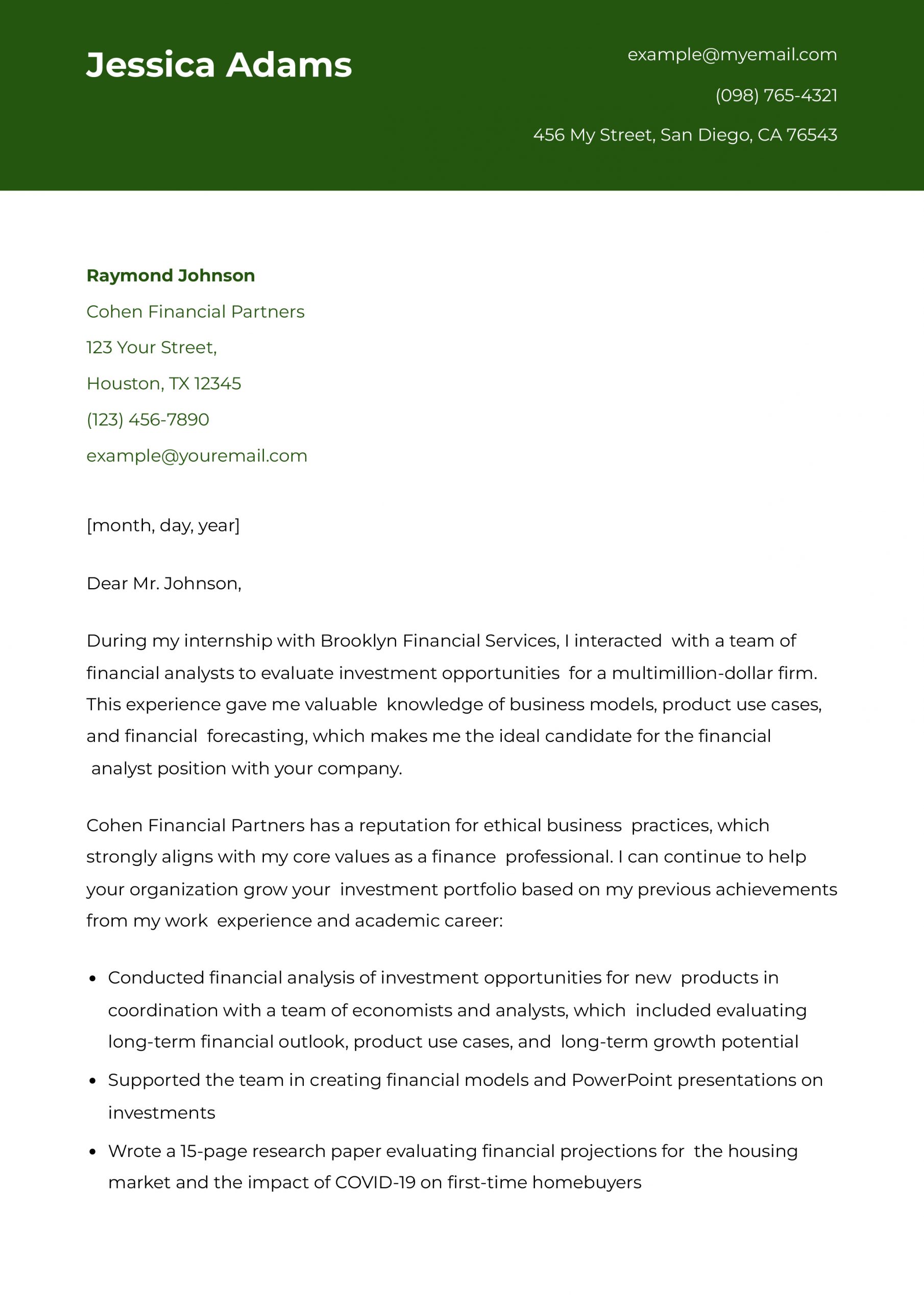
Recent Graduate Cover Letter Examples and Templates for 2024

- Cover Letter Examples
- Cover Letter Text Examples
How To Write a Recent Graduate Cover Letter
A great recent graduate cover letter can help you differentiate yourself from the competition during the job search. Even if you lack hands-on experience, you can still make a lasting impression on prospective employers by highlighting your academic achievements and industry knowledge. This guide provides examples and expert tips to help you build a winning recent graduate cover letter and land your first entry-level job.
Recent Graduate Cover Letter Templates and Examples
- Entry-Level
- Senior-Level
Recent Graduate Text-Only Cover Letter Templates and Examples
Curtis Jones Software Developer | [email protected] | (123) 456-7890 | Portland, OR 12345 | LinkedIn
Jan. 1, 2024
Caroline Matthews Hiring Manager Solaris Software Inc. (987) 654-3210 [email protected]
Dear Ms. Matthews,
As an intern at Portland Technology Inc., I collaborated with a dynamic team of software developers and engineers to design innovative mobile applications for the education industry. While supporting the development of three separate applications, I gained valuable knowledge and training in Agile methodology and software development lifecycles. My internship and academic experience will allow me to deliver valuable contributions to your organization.
Solaris Software Inc.’s reputation for creating value for users draws me to apply for this position. My bachelor’s degree in software engineering from the University of Portland and my experience as a software developer intern will allow me to aid your teams in designing scalable applications based on the following achievements from my career:
- Supported the software development team in designing a mobile Android application to aid college students in comparing prices for used college textbooks and subscription services, which garnered over 500,000 downloads following the launch
- Executed an academic project to design an application platform for users to improve vocabulary across 10 different languages by providing a database of common colloquial phrases
- Completed coursework in Python, Ruby on Rails, SQL, Jira, and JavaScript, graduated with summa cum laude distinction, and achieved a 3.8 GPA
I look forward to speaking with you further regarding how my application development experience can aid Solaris Software Inc. in continuing to create value for users. You may contact me via phone or email at your earliest convenience. I appreciate your time and consideration.
Curtis Jones
Jessica Adams Financial Analyst | [email protected] | (123) 456-7890 | New York, NY, 12345 | LinkedIn
Raymond Johnson Hiring Manager Cohen Financial Partners (987) 654-3210 [email protected]
Dear Mr. Johnson,
During my internship with Brooklyn Financial Services, I interacted with a team of financial analysts to evaluate investment opportunities for a multimillion-dollar firm. This experience gave me valuable knowledge of business models, product use cases, and financial forecasting, which makes me the ideal candidate for the financial analyst position with your company.
Cohen Financial Partners has a reputation for ethical business practices, which strongly aligns with my core values as a finance professional. I can continue to help your organization grow your investment portfolio based on my previous achievements from my work experience and academic career:
- Conducted financial analysis of investment opportunities for new products in coordination with a team of economists and analysts, which included evaluating long-term financial outlook, product use cases, and long-term growth potential
- Supported the team in creating financial models and PowerPoint presentations on investments
- Wrote a 15-page research paper evaluating financial projections for the housing market and the impact of COVID-19 on first-time homebuyers
I would like to schedule an interview to discuss further how my experience in financial analysis and risk management can benefit your organization. Feel free to contact me at your earliest convenience with any additional questions you may have about my background. Thank you for your time and consideration.
Jessica Adams
Arthur Morris Marketing Professional | [email protected] | (123) 456-7890 | Boston, MA 12345 | LinkedIn
January 1, 2024
Sarah Taylor Hiring Manager New England Marketing Inc. (987) 654-3210 [email protected]
Dear Ms. Taylor,
As a marketing intern with the Falmouth Marketing Consulting Agency, I coordinated with a team of specialists to enhance social media presence and web marketing for clients. I also attended meetings with creative teams to define brand messaging based on target audiences. Through these experiences, I developed an advanced understanding of social media marketing, which will allow me to thrive in the marketing specialist position with your organization.
New England Marketing Inc.’s reputation for driving customer success draws me to apply for this position. My expertise in brand messaging and social media marketing will allow me to provide valuable contributions to your organization based on my career achievements:
- Supported the marketing team in executing social media campaigns on Facebook, LinkedIn, and Twitter platforms and utilized Hootsuite to schedule posts based on key performance indicators (KPIs), resulting in a 500% increase in followership on LinkedIn
- Collaborated with copywriters and search engine optimization (SEO) specialists to create engaging copy and brand messaging for clients, which resulted in a 10% increase in page views for a customer website
- Served on a student marketing team to manage Twitter, Facebook, and LinkedIn social media pages for the University of Columbia under the supervision of the marketing manager
I hope to speak with you further regarding my expertise in social media marketing and how it can benefit your organization. You may contact me via phone or email at your convenience. I appreciate your time and consideration.
Arthur Morris
To write a great recent graduate cover letter that can truly help you break into your industry, the key is to show the most compelling aspects of your academic career and internships. Carefully analyze the role you’re applying for and identify how your unique skill sets align with the company’s needs. By tailoring your document towards individual opportunities, you’ll maximize your chances of landing an entry-level position. Below, we’ll walk you through each step of building your recent graduate cover letter:
1. Contact information and salutation
List all essential contact information at the top of your recent graduate cover letter, including your name, phone number, email, and LinkedIn URL. Be sure to address the hiring manager by name — Mr. or Ms. [Last Name]. If you can’t find the hiring manager’s name, use a variation of “Dear Hiring Manager.” This is preferable to salutations such as “To Whom It May Concern,” as these types of greetings are largely considered outdated.
2. Introduction
Open your recent graduation cover letter with a powerful introduction to grab the hiring manager’s attention and convey your interest in the job. Feature an eye-catching achievement from your resume and highlight key skills the organization is looking for. If you don’t have an internship you can point to, showcase academic achievements that demonstrate your qualifications for the job.
In the example below, the candidate has a unique advantage due to their experience interning at a large financial institution. This adds a certain level of credibility to the knowledge and skills they gained. That said, even if you haven’t had a similar opportunity, you can still hook the reader in the opening paragraph of your recent graduate cover letter by carefully tailoring it toward the job description.
3. Body paragraphs
In the body paragraphs of your recent graduate cover letter, continue to focus on achievements from your internships. If you haven’t had the opportunity to work in your field, draw attention to your academic projects. Using a list of bullet points to break up the monotony of the text on the page is helpful here, as this will improve the overall readability of your document. It’s also important to mention the organization’s reputation or mission statement and how it aligns with your background and professional values.
- Supported the marketing team in executing social media campaigns on Facebook, LinkedIn, and Twitter platforms and utilized Hootsuite to schedule posts based on KPIs, resulting in a 500% increase in followership on LinkedIn
- Collaborated with copywriters and SEO specialists to create engaging copy and brand messaging, which resulted in a 10% increase in page views for a customer website
- Served on a student marketing team to manage Twitter, Facebook, and LinkedIn social media pages for Columbia University under the supervision of the marketing manager
4. Recent graduate cover letter skills and qualifications
To compensate for a lack of hands-on industry experience, leverage the skills and knowledge you’ve gained from your academic career in your recent graduate cover letter. Instead of providing a comprehensive list, focus on integrating relevant key terms from the job description into your paragraph. Emphasize how you’ve utilized these skill sets in your internships and academic projects. Below, you’ll find a range of potential skills across a variety of industries:
| Key Skills and Qualifications | |
|---|---|
| Academic research | Analytical |
| Business analysis | Business strategy |
| Client relations | Cloud technology |
| Communication | Computer science |
| Content writing | Cross-functional collaboration |
| Data analysis | Data analytics |
| Financial analysis | Marketing |
| Nursing | Patient care |
| Sales | Team leadership |
5. Closing section
Include a call to action in the conclusion of your recent graduate cover letter. Invite the hiring manager to bring you in for an interview or reach out for more information on your background. Emphasize how your skill sets can translate effectively to a professional industry setting. Be sure to thank the hiring manager for their time and consideration in the last sentence.
Recent Graduate Cover Letter Tips
1. leverage your internships.
One of the best ways to grab the hiring manager’s attention is by leveraging your internships. This shows potential employers you’ve acquired hands-on experience, which can be exactly the type of information that advances you to the next phase of the hiring process. Be sure to provide context and numbers for any notable achievements, as this will heighten the impact of your positive contributions.
2. Feature academic achievements and certifications
If you haven’t had the opportunity to pursue an internship, you can still make a strong impression on the hiring manager by featuring your academic achievements. Instead of only mentioning coursework, call out impressive projects that demonstrate how you’ve applied industry skills while completing your degree.
3. Showcase volunteerism and community service
Another way to compensate for a lack of hands-on work experience is by highlighting community service and volunteerism on your cover letter. Even if this isn’t relevant to your field, in some instances, this can help show potential employers you’re the right culture fit for their organization. It also sends a positive message in regard to your personal values.
Recent Graduate Cover Letter FAQs
Why should i include a recent graduate cover letter -.
While not every job will require a cover letter during the application process, including one can help bolster your chances of landing the interview, especially as a recent graduate. This allows you to make a strong introduction and display your most relevant qualifications using a more personal approach than you would on your resume.
How do I make my cover letter stand out? -
To make your cover letter stand out, carefully research the company you’re applying to. Think about how your academic background and experience match the needs of the organization. Mention something specific about the company and why it drew you to pursue the opportunity. This shows you’re a serious candidate who’s truly engaged in the hiring process.
How long should my cover letter be? -
Keep your cover letter concise and focused, limited to no more than three or four paragraphs. This ensures your document is centered on your most relevant academic achievements, internships, and industry-related skills. Avoid padding your cover letter with fluff and generic buzzwords, as this doesn’t provide any valuable information that would interest the hiring manager.
Craft a new cover letter in minutes
Get the attention of hiring managers with a cover letter tailored to every job application.

Frank Hackett
Certified Professional Resume Writer (CPRW)
Frank Hackett is a professional resume writer and career consultant with over eight years of experience. As the lead editor at a boutique career consulting firm, Frank developed an innovative approach to resume writing that empowers job seekers to tell their professional stories. His approach involves creating accomplishment-driven documents that balance keyword optimization with personal branding. Frank is a Certified Professional Resume Writer (CPRW) with the Professional Association of Resume Writers and Career Coaches (PAWRCC).
Check Out Related Examples
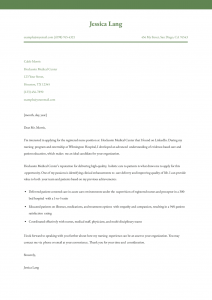
Grad Nurse Cover Letter Examples and Templates
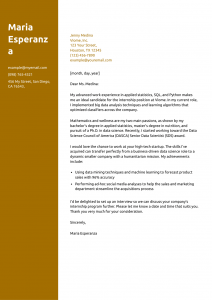
Internship Cover Letter Examples and Templates
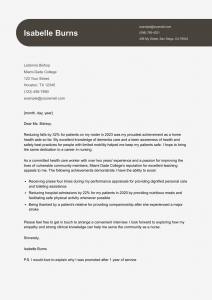
Nursing Student Cover Letter Examples and Templates
Build a resume to enhance your career.
- How To Get an Internship Learn More
- How To Include Extracurriculars on an Entry-Level Resume Learn More
- How To Include Personal and Academic Projects on Your Resume Learn More
Essential Guides for Your Job Search
- How to Write a Resume Learn More
- How to Write a Cover Letter Learn More
- Thank You Note Examples Learn More
- Resignation Letter Examples Learn More

Dear Recent College Grads, Here's How to Write a Great Cover Letter

A job search can quickly become a full-time job on its own. As a recent graduate looking for your next step, you might be tempted to attach your resume and click apply without bothering to send an accompanying cover letter. But taking the time to write one is worth the effort. This is the only place where you have free rein to explain why you’re interested in the job and how exactly you’re a good match. A compelling letter makes it so much easier for the reader to think, “ Yes! Let’s interview them!”
In my experience as a hiring manager, a cover letter can make or break my interest in moving forward with a candidate. If an application doesn’t include one, I’m almost certain to pass unless the resume is pretty much a perfect match. Admittedly, there are other recruiters and hiring managers who don’t look at the cover letter at all—but it’s best to assume that they will (it certainly beats wondering if you didn’t make the cut just because you didn’t send one!). And even if they don’t read it, you’re still ahead of the game in your preparation if you get called for an interview.
The basics of a cover letter boil down to this outline:
- An introductory paragraph (who you are, why this company and this job, and a bridge between the two)
- One or two themed paragraphs (highlighting and showing you have skills that match the job)
- A closing paragraph (some quick additional highlights and a request to speak further)
Four paragraphs should be a breeze—I bet you’ve written plenty of assignments longer than that to earn your degree! So how can you leverage your letter to effectively win over the recruiter or hiring manager even as a new grad who doesn’t have much experience?
Here are seven tips along with an example of what a recent college graduate cover letter could look like.
1. Tell Them Who You Are
Right off the bat, the person reading your letter is going to want to know some basic information in the introductory paragraph—like a quick synopsis of who you are, what you’re applying for, and why you’re interested in this opportunity. Sharing up front that you’re a recent grad signals that you’re likely able to be onboarded quickly, which is great if they need an expedited hiring process (or if they’re looking to train new talent). Here’s what a quick opening might look like:
Dear Mr. Fortman,
I am excited to submit my application for the UX Designer opening at CompanyDesign. As a recent graduate with a software engineering degree from Big State University, I am confident I could contribute to the success of your team.
2. Highlight Why This Company
Once you introduce yourself, it’s time to tell the reader why you’re trying to land a job at this specific organization. Showing them clearly and explicitly why you’re interested, excited, or passionate about the work they do and explaining how you’re connected to it can help convince them to add you to their interview list.
If you have some sort of contact at the company—someone at the company referred you, you spoke to a recruiter at your college’s career fair or info session, or you have a friend who interned there—mention what you learned from them and how what they shared makes you feel this would be an exciting opportunity and a good fit. Be specific where you can. If you were applying for that UX design role, you might say:
In February, I had the pleasure of speaking with Allison Ro from the product team at a career panel on campus. After learning about the company’s focus on human-centered design and your multidisciplinary team approach to creating products that improve the world, I knew CompanyDesign was where I wanted to work.
If you don’t have any “ins” at the company or first-hand information like this, don’t worry! You can do a bit of sleuthing and research in other ways. What can you find on their website or Muse profile about their work that excites you? Do they have values that are top priorities for you—like sustainability? Check out their mission page to find out! Is their work culture the type of environment where you can thrive and contribute? Have they been in the news recently for innovation or a new product? Find some nuggets of information that resonate with you and weave those specifics into answering the all-important “ Why this company? ” question.
No matter where you got your information, you want to show you understand the company and what you can add as a new hire. Conveying an interest and excitement for working specifically for this job at this company—rather than a desire to get any job at any company that’ll pay you a salary—can go a long way. After all, it can be easier to hire someone who is super into the work you do and needs a bit of training over someone with all the skills who doesn’t care about the work or mesh with the team.
3. Identify Their Needs for This Role
Once you’ve connected at a higher level with the company, the next two paragraphs can help you stand out as a top candidate if you align yourself and your skills closely with what the company needs. Unlike cover letters you may have written when applying to internships , where it may make sense to talk about being excited for the learning opportunity, your focus as a new grad seeking full-time employment should shift to how you can meet the company’s needs. It’s all about how you can contribute to their success rather than the other way around.
The best way to do this is to identify the top skills and qualities for the role and explicitly match those with what you have to offer. Use the job description as your blueprint. Typically, the most important attributes of the role will be mentioned higher up in the description. Pay attention to themes that are repeated throughout, too. If they mention design skills, or aspects of design, in multiple spots that’s an area you should highlight. If they mention collaboration, teamwork, and communication, that’s another clue for a theme you should address.
Unfortunately, not all job descriptions are detailed. If you need more information to figure out what recruiters and hiring managers are looking for, see if you can find a person currently (or previously) in this role—or a similar role—at the company by searching on LinkedIn. You’re likely to get some good insights from their experience entries or the recommendations their colleagues or clients wrote for them. If you have any connections at the company you may be able to get a better sense of what they look for through an informational interview . However, be mindful not to wait too long to get your application in!
4. Demonstrate Your Value—Show, Don’t Tell
Once you’ve done some reconnaissance, pick three or four of the main themes you identified that correlate to the skills, strengths, and attributes you have. Your goal in the next couple of paragraphs of your cover letter will be to share a few stories that demonstrate how you’ll bring those skills, strengths, and attributes to the position.
Having recently graduated, you may be applying to your very first full-time job or trying to get your foot in the door in a role or field you don’t have direct experience in. That’s OK! College classes, internships, research experiences, part-time jobs, work-study programs, extracurricular activities, volunteer work, and personal projects can all be used as examples to back up and show your value to the employer. And you can always highlight transferable and additive skills .
If you’re applying to a marketing job and you didn’t land a marketing internship before you graduated, for example, you may have had a relevant class project or gained experience using a similar skill set when you advertised events as a Resident Assistant. Maybe you had a work-study job at the campus bookstore and you maintained its social media pages, or you were in charge of recruiting new students to your student club and increased the membership. Perhaps you had a job where you had to be a data whiz in a fast-paced and collaborative environment and that could be an added benefit to this employer. Find the connections between some of the skills you used in these situations—advertising, telling a story to reach your audience, increasing engagement, and making data-informed decisions—and explain how they can transfer into what was outlined in the job description.
One common pitfall to avoid as a new grad is highlighting things you don’t specifically have yet. If you’re leading with a negative like, “Although I don’t have…”—skip it! Jump right to what you were going to say next. So instead of saying:
Although I don’t have experience with Tableau, I have experience leveraging analytics to make data informed decisions using Looker.
You should just say:
I have experience leveraging analytics to make data informed decisions using Looker.
Remember, with these paragraphs you want to tell a compelling story. Don’t just reiterate the facts on your resume. Take time to highlight the theme(s) you’re focusing on at the beginning of the paragraph. Next, show you have these qualities instead of just saying you have them with nothing to back it up. Share an example that highlights the value you added and connects back to the job opportunity. So if you’re applying for a data analyst role, your paragraph might look like this:
I have experience using business intelligence software and leveraging analytics to make data-informed decisions. While interning at Startup, I used Looker to analyze customer service ratings and identified trends that correlated with high satisfaction ratings. I presented the data to my team along with three key recommendations that I predicted could increase overall customer service ratings by 10%. I discovered that I most enjoy trying to understand the “why” behind the data and translating that into strategies for improvement. I would be thrilled to apply this same motivation to help A-Company manage and gain insights from their data to drive innovation.
5. Show Off Those Soft Skills
When reviewing the job and deciding what to highlight, remember that soft skills , like collaboration and communication, are often highly sought after as well. Technical skills are no use to an employer if you can’t communicate with a client or lead a project to completion. If these skills frequently show up in a job description you may choose to highlight them in a separate paragraph. You can also demonstrate them within stories that showcase your technical themes.
Group projects for internships or classes are prime experiences that can help you highlight many interpersonal skills . Collaborative work, like being on athletic teams or in student clubs, are also gold mines to draw upon as examples.
A word of caution: I often see new grads relay the entire story from the group “we” perspective, which can be detrimental as the employer doesn’t know what you did. It’s important to give context about the makeup of the team, and certainly give credit where credit is due, but then it’s most useful to transition and describe what responsibilities you had, how you contributed to the overall project, and what the outcome was. Here’s an example of how to set up that transition:
Through my Business Insights class, I was part of a team of four students tasked with developing and pitching a new business idea. Once we landed on an idea for a new food delivery service targeting college students, I led our efforts on market analysis...
6. Keep Connecting Back to the Company
Instead of calling it quits after highlighting relevant past experiences and demonstrating your skills and qualities, be sure to tell the reader how what you’re sharing matches with the role and company. This takes the guesswork out of how or if you might be a fit. Don’t assume they’ll make the connections themselves. Spell them out and make them impossible to miss!
You might be noticing a theme here: You should keep looping back to the specific role and company you’re applying for at every turn. From the intro to the experience paragraphs to the closing, you can only strengthen your cover letter by directly aligning yourself with this opportunity.
7. Watch Your Formatting
The content of your letter is most important, but here are some helpful formatting tips for traditional cover letters if you’re new to writing them.
The top of your document should include the following information:
- Your name, address, and contact information
- The company’s address
If you’re writing the cover letter directly in an email, then you can skip those details at the top. But either way, try to include the name of the person to whom you are writing in your greeting. It’s always best if you can find the recruiter or the supervisor for the position so you can address your cover letter to them. If you can’t, then go with something more general like, “ Dear Hiring Manager,” or “ Dear Editorial Team .” Just stay far away from, “ To Whom It May Concern ”!
A few additional pointers:
- Don’t go over the one-page mark.
- Margins are usually between one and 0.7 inches.
- Make sure your font and font size are easily readable. Think Times New Roman or Arial at a font size of 11 or above.
- Sign off formally (“Sincerely” is always solid) and include your contact information below your signature if you didn’t include it elsewhere.
What Does a Good Recent Grad Cover Letter Look Like?
So what does all of this actually look like in practice? Below is a sample cover letter for an entry-level job. Anything in bold directly aligns this candidate with the job description.
Dear Hiring Manager,
I am excited to apply for the Content Specialist (Req. #04321) opening at Consumer P. Company. As a recent graduate from Local College with a communications major and a digital media concentration, I have a passion for elevating consumer products that change the world . After speaking with Tanya Jones at our spring career fair and learning about CPC’s fast-paced environment, collaborative spirit, and goal to reach its audience in creative ways, I knew this role would be perfect. I admire CPC’s mission to design five-star products that make life easier and believe my knowledge and experiences would allow me to add value to the marketing team.
Through my internship at ContentCo I gained hands-on experience in understanding consumer insights, building partnerships with influencers , and developing content strategies . Working on a tight deadline prior to a new product launch, my fellow intern and I gathered early user testimonials, stories, and media . I also developed a short video mockup for a social media campaign that I’m proud to say was selected to be part of the launch. I would be eager to bring these same skills and passion for storytelling to CPC’s brand and world-class products.
During my time at Local College I also gained experience interpreting data and leading social media campaigns. As part of a semester-long project, my group collaborated with a local bakery on their marketing strategies . I led our efforts to launch a new Instagram account and was responsible for data collection and interpretation . Our client implement ed several of our recommendations, which resulted in an increase in social media traffic and purchases. I was particularly motivated by the bakery’s commitment to the community—donating daily to local food pantries—and am excited to know CPC similarly values giving back to the community.
Through my internship and academic experiences in communications, along with my involvement in our college chapter of the American Institute of Graphic Arts (AIGA), where I learned new trends for innovation in design , I have developed a strong skill set to add value as a CPC Content Specialist. I would be thrilled to speak with you further about how I can contribute to the marketing team. Thank you for your time and consideration, and I look forward to hearing from you.
Patrick Lai
- Resume Templates Simple Professional Modern Creative View all
- Resume Examples Nurse Student Internship Teacher Accountant View all
- Resume Builder
- Cover Letter Templates Simple Professional Modern Creative View all
- Cover Letter Examples Nursing Administrative Assistant Internship Graduate Teacher View all
- Cover Letter Builder
Graduate cover letter example

A few writing rules
Getting the tone right, cover letters examples for:, resumes examples for:.
Congratulations on finishing your college degree! Patience, determination and years of hard work have culminated in this moment of success. Now, it’s time for your next challenge: landing a job, fellowship or other opportunity.
One of the first tools you’ll need for success as a recent grad is a highly-polished resume and the knowledge of how to write an exceptional graduate cover letter. If you haven’t finished perfecting your resume, we’ve got you covered. Check out resume.io’s tips and tricks in our profession-specific resume examples , templates and general resume writing guide .
Once you’ve got your resume in top shape, this guide will show you how to knock your cover letter out of the park. We’ll focus primarily on the right qualities to convey for entry-level positions and how to beef up your resume when you’re just starting out. Since “recent graduate” isn’t actually an occupation, it’s a good idea to check out our other profession-specific cover letter guides for even more useful tips in your field of interest. This guide, along with an effective cover-letter example will:
- Explain the importance of creating a knockout cover letter when it comes to landing your first position
- Outline the details of professional cover letter formatting and provide free examples, samples and templates to work from
- Teach you how to use persuasive psychology to boost the body of your letter
- Help you convey the personality traits applicable to entry-level jobs in ANY field.
What is the purpose of a fresh graduate cover letter?
A cover letter for a fresh graduate, also called an application letter or letter of interest, is one of the most commonly requested job application materials. The primary purpose of your graduate cover letter is to work alongside your resume to create a complete picture of personality, experience and strengths as a candidate.
Whereas a resume has clearly defined sections that are constructed based on your actual education and work history, a cover letter is a bit looser. While this can be overwhelming for some recent grads, flexibility is one of the application letter’s biggest advantages. You’re encouraged to discuss your goals, perspectives and successes and let your charisma shine.
One of the biggest challenges recent graduates face when applying for positions is a lack of concrete or relevant work experience. It can be hard to convince an employer that you have the skills for the job if you don’t have much on your resume to prove it. That’s where an exceptional cover letter can work wonders. A well-organized and deliberate application letter for a fresh graduate lets you highlight the qualities you do have to convince an employer that you’re worth a shot.
A cover letter is usually between 200 and 400 words long, or the length of one page. Recent graduates often try to make up for a lack of resume experience by writing long, expounding cover letters that dive into every possible corner of their educational journey. Unfortunately, this can be an automatic “out” in the eyes of many employers.
Instead, focus on creating a strong argument by selecting only a handful of convincing points and carrying these themes throughout the letter. It’s also very important to adhere to the right formatting and font principles when drafting your cover letter. Stick to trusted font styles like Georgia, Calibri, Helvetica and Arial with a size between 10 and 12 points. A whimsical font like Comic Sans might seem tempting, but it’s a big no-go. You can find more details about style in this general cover letter writing guide.
Remember, at the end of the day a cover letter is all about maximizing your chances. Any spelling or grammar errors, wacky fonts or messy formatting will distract a hiring manager from your main purpose and bring down the likelihood of landing the position.
Do I NEED a cover letter?
We’ve all been there – an online application offers a spot to upload a cover letter, but the description doesn’t specify whether it’s truly a requirement. Technically, you could just upload your resume and move on with your life, right? That would be a big mistake.
If you truly want a position, why would you throw away one of your biggest chances to make a great first impression for success? Unless a posting specifically asks you NOT to submit a cover letter, you should always write and send one. You never know – your letter just might make all the difference when it comes time for a hiring manager to make some decisions.
It takes the average recent grad three to six months to find a job after graduation. Moving back home with your parents might seem cliché, but a lot of other graduates are in the exact same position. Today’s recent graduates are more likely to be underemployed (i.e. working at a job that doesn’t require a college degree) than they were in 1990, according to the Harvard Business Review . Recent grads are also more likely to be clustered in certain roles, primarily as advertising managers, actuaries, news reporters and law clerks. Add to that the fact that the average starting salary in 2020 was more than $5,000 below that of 2019, CNBC found , and it may look bleak. It doesn't help that hat figure has risen 2.5 percent in 2022, much lower than the rate of inflation, according to a National Association of Colleges and Employers (NACE) survey .
But there’s also some positive news: More and more students are opting to major in creative fields and fields that interest them. And people with college degrees are much better protected against economic recessions than their degree-less counterparts. This data points to two things: 1. you’re not alone in this potentially confusing post-grad phase and 2. the job search hunt, especially for fresh graduates, takes patience and positivity. A strong cover letter and resume are essential tools to landing not just any job, but the job YOU want.
Best format for a graduate cover letter
The good news is that no matter which field you studied or plan to work in, the format for a great graduate cover letter is roughly the same. While an application letter might seem structureless, these sections can help you stay on track and make the most of your one-page allowance.
Plus, these are the sections hiring managers expect to see so you can rest assured you haven’t thrown the employer any curveballs. Key components include:
- The cover letter header
- The greeting
- The introduction
- The letter body
- The conclusion
- The signature
Let’s take a look at each of them, but first, here is a graduate cover letter example to give you an idea of how to write your own letter:
Dear Mrs. Lastwell,
As a recently graduated biotechnology major at the University of California, I am excited for the opportunity to work with you at PreGen. My university biotech assignments centered around the food production industry and I firmly believe that technology will help to feed the world of the future. After leaving with a GPA of 3.8 from Jefferson College, I immersed myself in the academic side of college life. We enjoyed close research links with the local agritech community, and I undertook five separate work placements. I was fascinated by molecular diagnostics and even worked part-time on a project to improve crop yields in Kenya. Your international focus is exactly where the world needs to be focusing its efforts right now. A junior research associate role with you would provide an ideal starting point. Your track record of developing the brightest of young scientific minds is unmatched in the industry and I yearn to follow in the footsteps of your award-winning agritech magicians. My education and work experience have combined to give me a solid understanding of laboratory procedures and industry best practice including greenhouse operations and the maintenance of research and chemical application equipment. I saved one work experience employer over $240k by creating a unified operational manual for all employees. I have spent years immersing myself in the theory of genomics and I look forward to putting my knowledge to use. I enclose a portfolio of my academic research work and have over 20 letters of recommendation from the scientists that I have assisted. I can’t wait to hear about the potential projects where my contribution may make a difference – an interview to explore the possibilities would be a dream. Yours sincerely, Christine Holtz
Cover letter header
The header can be one of the most challenging sections for recent graduates. It can be difficult to decide what information is necessary. When mailing a letter, the name and address of the company and date the letter was written are essential. For online applications, including your graduate cover letter, brief is better.
The more you pack into your header, the less space you have to convince an employer of your unique qualities in the rest of the letter. Keep in mind that the primary purpose of the header in an online application will be to identify the document and keep your contact information at the hiring manager’s fingertips.
In large companies, an applicant’s folder can circulate within the HR department, making the header even more important. In the past, headers contained the applicant and company address. Now, information like your email, phone number and even your LinkedIn account is much more useful.
Getting creative with your header
In addition to conveying your identifying information, the header also serves a role in the formatting of your document. It allows for some white space so the letter doesn’t start abruptly at the top of the page.
If you want to present an even more polished look, you might opt to use a cover letter template. A template has the advantage of being professionally designed, and can even allow you to align the formatting of your resume and cover letter for maximum visual appeal.
The goal of this section: Identify the document, keep your name and contact info easily accessible and create visually appealing formatting.
Cover letter greeting
As a fresh graduate, you’ll most likely start your career by working your way up from junior level positions. That means you’ll need to use a greeting in your graduate cover letter that is respectful and mindful of the organization’s hierarchy.
There are some exceptions, however. A growing number of youthful brands and startups are opting for a more familiar tone both internally and externally. In these rare circumstances, it may be appropriate to use a greeting like “Hi” or “Hello” along with a first name instead of the more traditional “Dear Mr./Mrs./Ms” Informal greetings often work much better if you’re submitting your cover letter via email.
The goal of this section: Start the letter off right with a warm and friendly salutation greeting that’s also professionally appropriate for your field and experience level.
When you have a name – and when you don’t
Addressing the recipient by name is one of the best strategies for catching a hiring manager’s attention right from the start of your letter. Many job postings even list the name of the hiring manager or contact person giving you every reason to include it in your letter.
However, in some large companies or organizations hiring is done by a large team and it may be impossible to figure out who will be reading your letter. In this case, you might have to opt for a general greeting like “Dear XYZ Company Hiring Manager.” “Team” can also be a great non-specific word to use when a name is not an option.
After a few minutes poking around the internet searching for the hiring manager’s name, you might be tempted to throw your hands up in the air and go with “To Whom It May Concern:” However, this greeting is not just impersonal, it feels outdated and even cold. Using the company name, even in a general greeting, conveys that you are a human being speaking to other real people.
Cover letter introduction
Getting your graduate cover letter introduction off to an attention-grabbing start is one of the best things you can do to set your application up for success. By using a personal anecdote, emotive sentence or definitive statement, you’ll be miles ahead of candidates who opted for “I am writing to inquire about your recent vacancy for…”
You get the idea – if you haven’t already fallen asleep.
One of the biggest advantages a company gains when hiring recent grads is the creativity and innovation that comes from young minds. Simply put, a boring introductory paragraph introduction is selling yourself short. Convey your personality, spunk and unique qualities, just make sure to keep the tone professionally appropriate for your field and prospective employer.
The goal of this section: Introduce yourself in a unique and exciting way, set yourself up for success in the body section.
Dear Mrs. Lastwell, As a recently graduated biotechnology major at the University of California, I am excited for the opportunity to work with you at PreGen. My university biotech assignments centered around the food production industry and I firmly believe that technology will help to feed the world of the future.
Cover letter body (middle part)
The body section of your graduate cover letter is the meat and potatoes. It should provide enough detail that the hiring manager feels satisfied after reading it, but it should also leave them wanting to get in touch to take the conversation further.
What you choose to highlight in the body of your cover letter will depend somewhat on the most desirable skills and experiences in your field. However, a good strategy is to use the STAR/CAR method (Situation, Task, Action, positive Result) to convey your successes in previous work experiences. As a recent grad, you’ll likely need to talk about your previous internships and on-campus experiences. Focus on the most professionally-relevant activities and responsibilities to convey just how transferable your skills are.
There are some skills that are applicable across entry-level jobs. The ability to take feedback and learn from others and your mistakes is invaluable in any job. Depending on the position, teamwork may also be of the essence.
The goal of this section: Use anecdotes and examples of your strengths and skills, as related to your field, to highlight your professional competence. Prove that you have the right personality traits to be a good listener, quick learner and great team member.
After leaving with a GPA of 3.8 from Jefferson College, I immersed myself in the academic side of college life. We enjoyed close research links with the local agritech community, and I undertook five separate work placements. I was fascinated by molecular diagnostics and even worked part-time on a project to improve crop yields in Kenya. Your international focus is exactly where the world needs to be focusing its efforts right now. A junior research associate role with you would provide an ideal starting point. Your track record of developing the brightest of young scientific minds is unmatched in the industry and I yearn to follow in the footsteps of your award-winning agritech magicians. My education and work experience have combined to give me a solid understanding of laboratory procedures and industry best practice including greenhouse operations and the maintenance of research and chemical application equipment. I saved one work experience employer over $240k by creating a unified operational manual for all employees.
How to close a recent graduate cover letter (conclusion and sign-off)
You’ve written the bulk of your letter, but how do you close the letter professionally? You want to be memorable without making the assumption that you will land the interview. The closing paragraph of your graduate cover letter can be more challenging than it appears.
As you move through the body section, think about how you’ll bring your themes back together in a way that leaves a hiring manager feeling optimistic and confident about your abilities. Then, it’s time for the call to action. This writing technique invites a hiring manager to get in touch and continue the conversation. Your tone should be respectful and polite, but also approachable and friendly. The call to action should be a natural extension of the rest of the letter. “Sincerely,” “Best regards” or simply “Best” are some of the most popular sign-offs that can work with a variety of situations or companies.
The goal of this section: Create a natural and friendly call to action that entices the hiring manager to get in touch, close the letter with an appropriate good-bye.
I have spent years immersing myself in the theory of genomics and I look forward to putting my knowledge to use. I enclose a portfolio of my academic research work and have over 20 letters of recommendation from the scientists that I have assisted. I can’t wait to hear about the potential projects where my contribution may make a difference – an interview to explore the possibilities would be a dream. Yours sincerely, Christine Holtz
Writing psychology – cover letter tools and strategies
As a recent graduate in any major, you’ll want to express a few key personality traits that will make you a valued coworker across the board.
- Trustworthiness: younger coworkers often develop a bad reputation when they can’t keep office gossip or even private work-related information to themselves. Highlighting your professionalism when it comes to demeanor and speech will build trust with a hiring manager right from the start.
- The ability to receive criticism: A junior employee who can not only take feedback well but implement it into their future performance will rise quickly through the ranks. If you can, show how you managed this in previous positions and how it led to even better outcomes.
- The right balance of confidence and humility: This is one of the trickiest parts of writing your first cover letters as a fresh graduate. You don’t want to brag but there’s no point in being so modest that a hiring manager can’t figure out the benefit of having you at their company. Assert yourself as a leader and hard worker who’s also willing to learn.
The laws of specificity
In their book, “Made to Stick,” brothers Chip and Dan Heath discuss the principles and strategies behind ideas that linger in our minds. These principles have a variety of applications and purposes, including in marketing, writing and persuasion. One area where recent grads struggle when crafting a convincing cover letter is credibility. With limited years of hands-on experience, how can a hiring manager be sure you truly have the skills for the job? That’s where the Heath brothers’ principle of specificity comes into play. Hiring managers know that it is much easier to write sweeping statements about your personality traits and perspectives than it is to show solid facts about how you initiated and effectuated a positive change.
That’s why specific examples, quantifiable statements and concrete numbers give you the best chance of impressing a hiring manager and landing an interview. Specificity doesn’t just have to come in the form of results. You can also use this principle, for example, in naming an industry-leading company you interned for. You might include the size of a team you led, the name of the published project you worked on or the location of your foreign language training. A sprinkling of the most relevant, specific details helps you make up for the credibility you might lack as a recent graduate and keeps a manager interested in what you have to say.
Recent graduate cover letter common mistakes (and how to avoid them)
Some good news: The more cover letters you write, the easier they get. You can give yourself a leg up on other recent grads by checking out these cover letter tips: avoiding these common pitfalls:
- The one-size-fits-all letter. Every company and job opportunity is a unique opportunity and your cover letter should reflect an understanding of this fact. What’s more, hiring managers are hardly fooled when candidates simply swap out one company’s name for another without tailoring the content of the letter. While you might create a basic letter to work off of, you’ll need to make sure you customize each letter for the specific position, using skills and information from the company website and job description.the exact skills needed for the job at hand.
- Generic and fluffy wording. Hiring managers know that you’re a recent grad. It’s no use trying to cover up that fact with elevated language that boils down into nothingness. Plus, no one ever said you shouldn’t have a personality. Proofread your As long as your grammar and spelling. As long as there are no typos is correct, it’s OK to be yourself.
- Too much or irrelevant information. If you don’t know what to talk about when seeking your first job, you might find yourself going a little overboard. Instead, try to keep the conversation friendly, but geared strictly toward your professional experience, activities and coursework and experiences. There will be a time and place for the fact that you developed the university’s first ping-pong club, but your cover letter probably isn’t it.
- Formatting errors. It can be tricky to hit the right balance of professionalism and individuality when it comes to cover letter format formatting. Odd or childish fonts can throw off a reader and misaligned formatting can come off as amateur. One way to avoid these all-too-common problems is with a professional formatting tool, like this one from resume.io.
Key takeaways
- An exceptional cover letter is one of the best ways to make yourself stand out from the competition by expressing your personality and unique advantages.
- It’s important to follow the expected cover letter length and style conventions to present a professional image and avoid taking a hiring manager by surprise.
- Numbers, facts and figures can help you build credibility and make up for any gaps in experience.
- Don’t try to fight against your recent grad status with fancy wording and eccentric formatting. It’s always a better idea to keep your letter clean, professional and error-free.
Now it’s time to get started on your exceptional cover letter. Land your dream job Get the job done right with resume.io’s professionally designed templates and easy-to-use builder tool . Go out there and win!
Other education cover letters and resumes examples from the same industry:
Need more inspiration before you can start crafting your own cover letter writing and resume? See our related education cover letter examples below.
- Scholarship
- Library Assistant
- Elementary teacher
- Substitute Teacher
- Teaching Assistant
- Apprenticeship
- Early Childhood Educator
- College Student
- High School Student
- Academic Librarian
- Health Educator
- ESL Teacher
- Teacher Assistant
- Middle School Teacher
- Elementary School Teacher
- College Professor
- High School Teacher
- Academic Tutor
- College Admissions
Free professionally designed templates

- Graduate Cover Letter
- Career Advice
Graduate Cover Letter Template
If an employer requests a CV to apply for a vacancy you should always include a graduate cover letter. This is your opportunity to introduce yourself and explain your suitability for the role. You must take time over your cover letter and make sure they are immaculate. Spell checkers are not enough. Be sure to use the cover letter examples provided to give you the best chance of grabbing your dream job!
Writing a graduate cover letter
What is a cover letter? It's an accompanying document to your graduate CV and often they are an important method of communication. They can provide an informal and friendly view of personal events to people, or they can be formal documents offering factual information to people you have not met. This is your chance to tell them what skills you have and why you want to work specifically for that company. Unlike email, letters are tangible and layout is as important as content.
Graduate cover letters have a standard format and this is shown in the cover letter examples attached. If you are writing to a named person then it is 'Yours sincerely', if you write 'Dear Sir/Madam' the correct ending is 'Yours faithfully'.
A graduate cover letter should:
- Introduce them to your personality and your commitment to them
- Give compelling examples of your suitability to the company as well as the role
- Make references to key requirements they look for
- Suggest there is even more to learn about you over a call or in person
- Make the employer want to talk to you
- Demonstrate your written communication skills

Some golden rules
Never put anything in your cover letter that cannot be backed by your graduate CV or application form. The human resources staff will look for discrepancies and for any mistakes that show a lack of attention to detail. Also anything you write can be brought up during graduate interviews , so make sure you can back up what you write with good examples. Don’t forget it is actually a criminal offence to lie on your cover letter for a CV, so always be honest but convincing about what you know or the skills you have.
There are some conventions about letters of application. Generally letters sent with CVs or graduate job applications should:
- be addressed to a named person;
- state why you are writing, what you are applying for and what you are currently doing;
- flag up the most important/relevant thing you want the employer to know about you;
- use eye catching key words that the employer is likely to be looking for. You can work it out by thinking about the job spec and by doing your research;
- refer the reader to your CV or job application form;
- show that you know something about the company;
- make a connection between your skills and abilities, and company needs or wants;
- identify the career you are seeking;
- be reasonably brief.
Remember if the covering letter for a job application is poor, the employer may not bother to read your CV. This also applies to application forms as well so remember this keeps you in the race for the job, it is essential to not stumble at the first hurdle.
Attached are two examples of cover letters of a job application. Both are acceptable. Use these examples only as a guideline; your covering letter should show your originality and if you are serious about working for a particular company it should not be difficult to adapt these examples. Our cover letter guide is to help you start writing your own letter, so yours should be bespoke to the company. You're telling them you want to work for them specifically and anything generic will only decrease your chances. Remember, you will have to justify what you say and why you said it at a job interview.
Format of a graduate cover letter:
Personal statement.
The personal statement can be used as a heading to a CV or as an additional statement on an application form.
The personal statement is not solely for telling the employer what a great person you are, it is about telling the employer what you hope to achieve in the future, that you will fit into their structure and you have transferable skills which will be useful for them. This is your chance to show what you have found out about the company and why you want to work for them. Even more important is to show why you would be a good asset for the team. For example:
"My career objective is to enter research in the ... industry. I have demonstrated strong research skills during university project work and much of my experience has been within a team environment. I am able to take responsibility for my own work as well as being able to demonstrate leadership when required. Meeting deadlines has been a consistent part of my academic and working life and I have learned how to communicate with people in situations which require tact. My academic skills have given me the ability to communicate effectively on paper as well as through presentations."
Personal profile
The personal profile reflects the type of person you are. It offers the employer a taste of your character and your goals, and many CVs use a skills profile. Show why you think this role is perfect for you. For example:
"I am an outgoing person who can talk to people at all levels and have been complimented on my ability to listen to other people. I can take responsibility for my own work and my own goals, but I also enjoy working with other people to reach a common goal. Reflection is an important part of my personality and this has led me to develop a strong feeling for detail without losing sight of the whole picture. ... holds strong fascination for me and my objective is to work in research within this field."
"My academic and work experience has taught me to work well with other people and to take responsibility for my own work. I have an outgoing personality and am keenly interested in good health through exercise and diet. One of my most important assets is my ability to listen to people."
Skills profile
Skills profile identifies your competence in a variety of skills and these can be shown through bullet points or by a short sentence linked to specific skills. Keep this concise, but include everything relating to the job spec. They will want to see as many directly relatable skills to the job as possible. For example:
"During my academic study and work experience I have developed skills such as:
- problem solving
- time management (etc)"
Or you might support them with a short sentence, for example:
"Problem solving
My university project work has demanded that I undertake investigation into a specific topic and analyse the information before putting recommendations forward in a presentation."
"Time management
During my time at university I have undertaken full-time study, part-time paid work and enjoyed my sport with the basketball team. I have prioritised each of these activities successfully."
The best skills to write about are the ones that have achieved something positive. Any examples you have that a skill you applied to hit a target or anything positive will stand out on a cover letter. The main thing is that it must be concise. Let them see why they should want meet you, so make it personal and tailored towards their business. Whatever style you adopt remember what you say in your profile is open for questioning at an interview.
Email cover letters
When submitting a cover letter for a job applications there are a few things that you must remember to check. Firstly check that your cover letter and CV, for that matter, is attached. Be careful and check the formatting of the email and cover letter. Ensuring the font is the same all the way through. Try to keep the font consistent throughout your CV, cover letter and email. This will just look more professional. Make sure your read the job specification when applying; they may want something specific in the email subject.
The final advice
- make your graduate cover letter tailored to the company.
- make it concise.
- make it persuasive and eye catching.
- proof read. Read it once, then read it again and then read it again. If possible get someone else to read it for you to catch every little typo or grammatical error.
- use an appropriate format; it must look professional i.e. for business purposes.
- make it generic.
- waffle! Think about what is relevant to the company and particularly the actual position/role.
- make it more than one side of A4.
- leave errors that will make it easy for the company to reject your application.
- forget to put the address of the company at the top of the cover letter and to sign it with you name. It is a formal letter so it must be in the correct format.
Opt for a creative approach
It is diffiuclt to make your application stand out from the crowd. However, in some instances you could opt for a creative approach! Take this example bellow of an applicant using a spotify playlist to apply! This may not be appropiate to use in some applications however it is some food for thought.
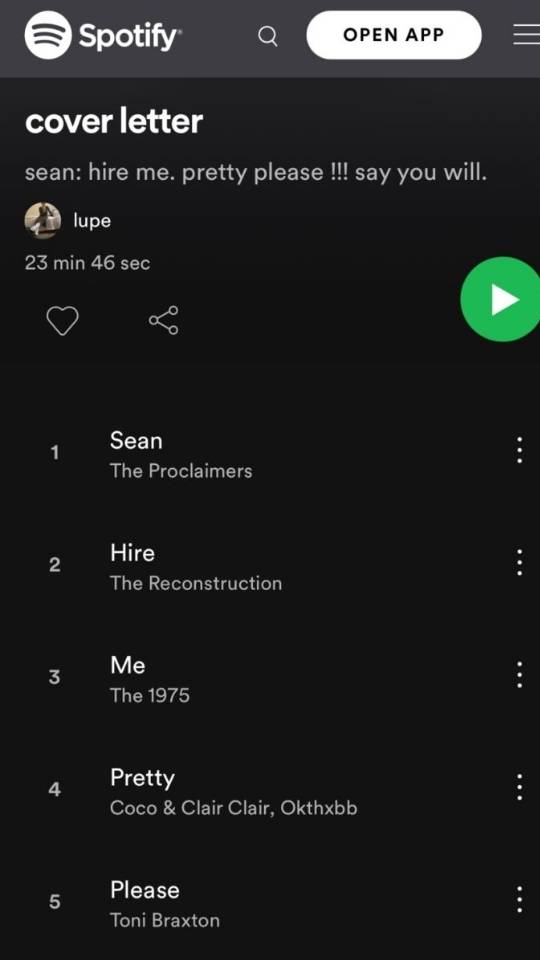
Latest Blog Posts

Celebrating Learning Disability Awareness Week 2024 with GRB
Celebrating Learning Disability Awareness Week 2024, we explore how graduates with learning disabilities can be seen, heard, and valued while navigating the job market.

The Ultimate Guide to Landing a Graduate Job in Operations
Explore the vibrant world of graduate jobs in operations, uncovering opportunities, skill requirements, and career paths for 18-24-year-old students entering the workforce.
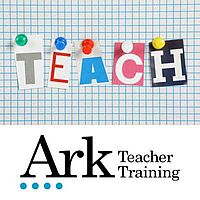
Why STEM Graduates Should Consider a Career in Teaching
Discover the benefits of teaching. Learn how STEM graduates can utilise transferable skills to transform education. Pursuing a career in teaching can be a fulfilling and impactful choice.
Related Pages:
- Graduate CV
- Graduate Self Assessment
- Graduate Job Applications
- Personal Branding
- How To Make a Graduate Video CV
- Graduate Psychometric Testing
- Following Up Graduate Job Applications
- Graduate Assessment Centres
- When to Apply for UK Graduate Jobs
Please Login
Login and apply now.
- Search Search Please fill out this field.
- Career Planning
- Finding a Job
- Cover Letters
Sample Cover Letter for a Recent College Graduate
:max_bytes(150000):strip_icc():format(webp)/ADHeadshot-Cropped-b80e40469d5b4852a68f94ad69d6e8bd.jpg)
What to Include in Your Cover Letter
- Tips for Writing a Cover Letter
- Recent Graduate Cover Letter Example
How to Send an Email Cover Letter
Emilie Dunphy é The Balance
Writing a cover letter as a recent college graduate can seem complicated because you have limited work experience. However, there are ways to show the employer that you are an ideal candidate for the job.
Read below for advice on writing a cover letter for an entry-level position as a college graduate, as well as an example letter.
Introductory Paragraph: In the first paragraph of your cover letter, express your interest in both the job and the employer, mentioning the company by name. Cite the source where you discovered the job announcement. If you have a connection at the company who you know would support your candidacy, mention their name here .
Do not use a generic cover letter for all of your job applications. Each one should be reworked to speak directly to the identity and needs of the employer to whom it is sent.
Body Paragraphs: Use two or three short paragraphs in the body of your cover letter to “sell” your candidacy to the employer. While you should definitely mention the name of your college and your major (especially if this is directly related to the job), your cover letter shouldn’t be a simple biography of your academic history.
Instead, try to persuasively demonstrate how your college studies, internships, temporary / seasonal work experiences, and / or extracurricular experiences have given you the primary qualifications listed on the employer’s job posting.
Closing Paragraph: In your closing paragraph, reiterate your enthusiasm for the job opportunity and thank the employer for their consideration. This is the best place to request a personal interview and to explain how you intend to follow up on your application .
Tips for Writing a Recent College Graduate Cover Letter
Use keywords. Take a careful look at the job description, noting any skills or experiences that the description indicates. Try to include some of those keywords in your cover letter. This will show the employer a connection between your experiences and the job.
Focus on activities and responsibilities. In the body of your cover letter, emphasize the skills and experiences that make you a good candidate. Avoid focusing on your GPA or grades, or other metrics related to college. Instead, focus on activities you did, and the responsibilities you held. Maybe you had an internship or were a leader in a school organization. These examples go beyond showing that you were a good student. They show you have what it takes to be a good employee.
Sell yourself. Avoid talking about how much you want the job; instead, focus on how you will help out the company. Emphasize ways that you can add value at the company, and why you are a good fit for them.
Show your knowledge of the company. Research the company before writing the cover letter. If possible, explain what you know about the company (or the department the job is in). Perhaps you’ve read an article about the company’s recent successes, or you’ve read and believed in the company’s mission statement.
Knowledge of the company will put you a step above the competition.
Edit, edit, edit. Make sure you thoroughly read through your letter, editing any typos or grammar errors. Keep your message short and to-the-point, using language that is easy to understand. Ask a friend or career coach to read it for you as well.
Recent College Graduate Cover Letter Example
You can use this cover letter sample as a model. Download the template (compatible with Google Docs and Word Online), or read the text version below.
Recent College Graduate Cover Letter Example (Text Version)
Your Name Address City, State Zip Code Phone Number Email
Name Title Company Address City, State Zip Code
Dear Mr./Ms. LastName,
I am writing to apply for the position of Media Relations Assistant Manager, which I saw advertised on MediaJobs.com. ABCD is a fast-moving global institution and an outstanding communications pioneer, now poised to guide the direction of print journalism. I believe that my extensive experience in media makes me an ideal candidate for this position at your company.
As a recent graduate of the State University, I have a significant background in media. As a media major, I held multiple internships, including Media Relations Coordinator Intern at XYZ Company. I also served as president of the Media and Marketing Club at school. We successfully developed and pitched an advertisement campaign for a local nonprofit, which helped increase donations to the nonprofit by 22 percent.
You state in your job listing that you are looking for someone with strong writing skills and an attention to detail. Throughout all four years of college, I worked part-time as a copy editor for an online journal. This job required great attention to detail in writing and editing. I would love to bring my editing skills to a position with your company.
These strengths, combined with deep and varied academic, internship, and employment experience, have prepared me to make a strong and immediate impact at ABCD.
I am excited about the opportunity to join the ABCD team as it moves to the center of the print media conversation. Thank you for your time and consideration.
Your Signature (hard copy letter)
Your Typed Name
If you're sending your cover letter via email , list your name and the job title in the subject line of the email message. Include your contact information in your email signature, and don't list the employer contact information. Start your email message with the salutation.
Key Takeaways
YOUR COVER LETTER IS YOUR “SALES PITCH”: Your cover letter is far more than an expression of your interest in a job opening. Ideally, it should be a powerful marketing document that summarizes the unique qualifications that you could bring to the employer.
FOCUS ON THE EMPLOYER: Every statement you make in your cover letter should serve to respond to the needs of the employer (as these are expressed in their job announcement). Don’t write extensive biography here. Instead, highlight the skills you offer.
MAKE YOUR COVER LETTER LETTER-PERFECT: Most hiring managers view carelessly written, generic cover letters as a red flag. Carefully edit your letter to eliminate all grammatical, spelling, and formatting errors. Ask a grammar-savvy friend to proofread it for you as well.
Cover Letter Examples for Students and Recent Graduates
The Balance / Luyi Wang
- Cover Letters
- Skills & Keywords
- Salary & Benefits
- Letters & Emails
- Job Listings
- Job Interviews
- Career Advice
- Work-From-Home Jobs
- Internships
What to Include in Your Cover Letter
College graduate cover letter example, student / recent graduate cover letter templates, student and recent graduate cover letter samples, how to write a cover letter, cover letter format and presentation tips.
If you're a student or a new grad, you may not have much experience in the workforce. This can make building a resume and writing a cover letter challenging. After all, if you haven't worked previously, what information can you include in these two documents?
Fortunately, on-the-job experience is not the only thing that shows your abilities. Here's guidance on what to include in your resume and cover letter, along with cover letter examples and cover letter templates are designed especially for high school students, as well as for college students and recent graduates seeking employment.
Academic Achievements and Extracurricular Activities
You can mention volunteer work, academic achievements, participation in clubs or activities (particularly those in which you held leadership roles), and internships. Your academic background is also an asset. Include details that are relevant to the position you want (use the job description as your guide to the qualities and training the employer seeks).
GPA and Honors
If you are an honors student with a GPA higher than 3.5, it is a good idea to mention this on a cover letter as well, along with any honors societies you have been inducted into.
Skills and Abilities
Other things you can mention are soft skills—interpersonal “people” skills like creative thinking, communication, teamwork, or time management that will help you to adapt easily to the people and clients or customers you will be working with.
Your goal in this cover letter is to show how you would be an asset to the company, describing the skills you bring that would allow you to perform well in the position.
Below, you'll find a list of student cover letters, listed by position and level of experience, to help you develop your own cover letter.
Watch Now: 7 Tips for Finding Your First Job
You can use this sample as a model to write a college graduate cover letter. Download the template (compatible with Google Docs and Word Online), or read the text version below.

College Graduate Cover Letter Example (Text Version)
Lucy Applicant 123 Main Street Anytown, CA 12345
555-555-5555 lucy.applicant@email.com
October 18, 2021
Eric Lee Media Director Kansai Collaborative Arts 123 Business Rd. Business City, NY 54321
Dear Mr. Lee:
I am writing to you to express interest in the graphic design position as advertised on Indeed.com. As a recent graduate with experience in 3-D animation software and the Adobe suite of software, I believe I am a strong candidate for a position at Kansai Collaborative Arts.
During my time at the University of Northern State, I was awarded the top prize in the student design competition for my version of an app that would allow students to learn Japanese characters on their own time.
In addition to graduating with a 3.75 GPA, I spent a semester at a university in Japan, and I have strong conversational skills in the Japanese language. I believe this would be an asset, as I know your studio does a lot of collaborations with major design studios in Japan.
Although I am a recent college graduate, my maturity, artistic skills, ability to work with others, and knowledge of the Japanese language and culture will make me an asset to your studio.
I have enclosed my resume and will email you within the next week to see if we can arrange a time to speak further. Thank you for your time and consideration.
Signature (hard copy letter)
Before you can begin writing your cover letter, it's important to know the guidelines governing these letters. Unlike a casual email to a friend, there are set standards for how to greet recipients, organize the letter's content, and much more. That's where templates can help: they allow you to know what information to put where, and they help you format your letter correctly. Review the templates below:
- Cover Letter Format
- Cover Letter Template
- Email Cover Letter Template
- Email Cover Letter Sample
- Cover Letter Sample: General
- Cover Letter Sample: Block Format
- Microsoft Word Cover Letter Templates
These lists of cover letters include both general examples that will help you format your letter, as well as sample cover letters used to apply for specific positions, such as roles as a nanny or a marketing assistant.
Do not copy these sample letters—instead, use them as a guide to help you know what kind of information to include, and how to format your letter.
Entry-Level Cover Letters
Have a look at these samples to see how best to present your experience when applying for an entry-level job.
- Entry Level Inquiry Letter
- Cover Letter Sample: Entry-Level
Student Cover Letters
As a student, the information you should emphasize in your cover letter will vary depending upon your level of education. Here are examples of effective cover letters created for students at the high school, college, and graduate levels.
- Recent College Graduate Sample #1
- Recent College Graduate Sample #2
- Response to Job Posting
- College Senior
- Graduate Student
- Networking Letter
Job-Specific Cover Letters
These cover letter samples target specific career fields. They demonstrate how to incorporate industry-specific keywords into your narrative.
- Email Cover Letter - Psychology Job
- Internship Cover Letter
- Finance Internship Program
- Entry Level Marketing
Cover Letters for Summer and Part-Time Jobs
Being able to write an enthusiastic and informative cover letter will set you apart from your competition when you apply for summer or part-time jobs while you’re still in school.
Make sure you send your cover letter and resume as soon as possible after a job is announced—these opportunities are snatched up quickly.
These samples can be modified to both summer and part-time work.
- Part-Time Job
- Summer Assistant Job
- Email Summer Job
- Summer Job #1
- Summer Job #2
- Summer Job Email Message
- Camp Counselor
- Email Editorial Assistant
- Sales Associate
- Summer Camp
This guide to writing a cover letter will walk you through everything you need to know to write a cover letter, including what to include in the letter, how to write it, and the proper cover letter format. Plus, find out about how to write a targeted cover letter and browse through additional cover letter samples and examples.
Here are cover letter tips and techniques for writing top-notch cover letters to send with your resume, including information about cover letter format and presentation, choosing a type of cover letter, writing custom cover letters, and cover letter examples and templates.
- Teacher Cover Letter Example and Writing Tips
- Special Education Cover Letter: Example and Writing Tips
- Speech Pathologist Resume and Cover Letter Examples
- Software Engineer Cover Letter and Resume Example
- Summer Hotel Job Letter Example
- Sample Job Cover Letter for a College Summer Assistant Job
- Sample Cover Letter for a Summer Camp Job or RA Position
- Admissions Counselor Cover Letter and Resume Examples
- Sample Cover Letter for a Job in the Arts
- Cover Letter Samples for Teachers
- Hair Stylist Cover Letter and Resume Examples
- Photographer Cover Letter and Resume Examples
- Administrative Assistant Cover Letter Examples
- Receptionist Cover Letter Examples and Writing Tips
- Academic Advisor Cover Letter Sample and Writing Tips
- Finance Internship Cover Letter Example
- Graduate School
Graduate School Cover Letter Examples
With writing tips and a step-by-step guide.
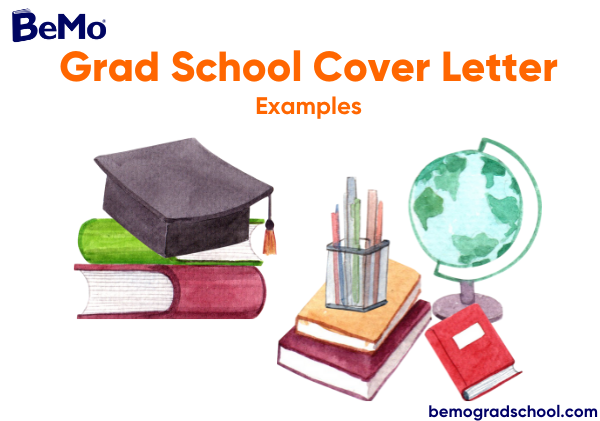
Looking at graduate school cover letter examples is a good idea if you plan on applying to a graduate school program, as you may be required to include a cover letter with your CV for graduate school and other application components. Even though it is not a required document for all grad school programs, a well-written graduate school cover letter can help you stand out to the admissions committee and improve your chances of being accepted into your chosen program. This is especially true if you are applying to a highly selective institution or trying to get into graduate school with a low GPA.
This blog will discuss everything you need to know about writing a cover letter for graduate school. You will learn why cover letters are important, learn tips to make your graduate school cover letter stand out, and you will get to review cover letter samples that will inspire you to write your own.
>> Want us to help you get accepted? Schedule a free initial consultation here <<
Article Contents 10 min read
What is a graduate school cover letter.
A graduate school cover letter is a brief letter that applicants attach to their graduate school application. Much like a work cover letter, such as a research assistant cover letter , for example, graduate school cover letters are meant to introduce you and your application to the reader. They give you an opportunity to make an excellent first impression, tell the admission committee that you are interested in their graduate school program and why you believe it is a good fit for you.
Graduate school cover letters have become less popular as graduate schools typically ask students to fill out their personal information and submit materials online. If you are sending specific application materials or your entire application by mail, then you will need to include a graduate school cover letter. Additionally, a few institutions, like the University of Illinois graduate college, for example, require students to submit a graduate school cover letter with their application, even when it is online.
Furthermore, even when a graduate program does not explicitly ask for a cover letter, including a well-written and informative letter can help differentiate you from the other students by leaving a lasting impression on the admission committee, thus increasing your chances of admission. That said, before you start writing a cover letter for such a program, you should verify the school's admissions website to ensure that the school accepts additional documents.
It should also be noted that many graduate students look for work and research opportunities at the school that they will be attending. If that is the case for you, then you will need a graduate school cover letter with your application for that school-related internship, job, or research opportunity. For example, if you’re interested in conducting research with a specific professor while you complete your master’s, then it would be a good idea to send them your application with a cover letter attached so that you can communicate your suitability for their research project.
Graduate school cover letters are academic letters, meaning that they need to be formatted in a way that is professional, clear, and concise. Your graduate school cover letter should be no longer than a page, written in a classic font that is easy to read, such as Times New Roman or Calibri, sized 11 or 12.
The text of your letter should be organized and separated into paragraphs. Keep in mind that your letter may go through several readers, and not all of them may be experts in the field you intend to study, so do not use overly technical language or industry-specific jargon. Keep your language succinct, clear, and consistent throughout the letter.
Lastly, your letter needs to provide a quick introduction to you as a candidate and pique the reader's interest so that they want to read the rest of your application. This means that you should not use your cover letter to list all of the experiences and skills that make you perfect for this graduate program. Simply express your interest in the program, select one or two experiences, skills, or values to focus on, and relate those to your suitability for the program you're applying for.
Wondering how to get into grad school with a lower GPA?
Step 1: Brainstorm & plan
The first thing you want to do before you start working on your cover letter, or any graduate school admission essay, is make a plan. Think about what you want to say in your cover letter and write it down. Remember that you only have a few paragraphs to work with, and you do not want to repeat information from your personal statement or other application components.
Once you know what you want your cover letter to say, organize it so that it flows nicely, and it is easy to follow. Your graduate school cover letter should follow the structure of a typical letter. It should have an introductory paragraph, the main body, and a closing paragraph.
Step 2: Address your letter
As mentioned earlier, your graduate school cover letter is, in fact, a letter! Therefore, you should begin by addressing it the way you would in a formal letter. Write your full name and mailing address at the very top. We also recommend including your email address and phone number, but this is optional. On the following line, write out the date, and then write the recipient's name (typically, this is the name of the head of the department or just the name of the school you are applying to) and their address. You should verify the school's admissions webpage for this information. If it is unclear and you are unsure whom to address in the letter, contact the school and ask for this information to ensure that your documents get to the right person.
This first section of your letter should follow this template:
1234 Imaginary Lane
NameofCity, TN 34421
December 12, 20XX
Dr. John Smith
Department of Psychology
BeMo Academic University
66 University Circle
NameofCity, TN 34457
Once again, because this is a formal letter, you want to open your letter with the appropriate greeting or a personal salutation. If you have the name of a specific recipient, you can use the most common salutation for graduate school cover letters, which is "Dear [recipient's name]." Do not forget to include the recipient's title if you have it. If you do not have the name of a specific recipient, then you can simply address the letter "To Whom It May Concern".
Step 4: Introduce yourself and express your interest in the graduate program
The reader will already have your name at the top of the page, but your introductory paragraph should tell them why you're writing this graduate school cover letter. You should use it to state your interest in your chosen graduate program and briefly mention your academic background and accomplishments thus far.
Take a look at this example for context:
I am pleased to submit my application for the Master of Applied Psychology program at X university. As a recent psychology graduate of YZ university, this graduate program is the perfect next step toward achieving my goal of becoming a clinical psychologist.
Step 5: Talk about your suitability for this program
This is the main body of your graduate school cover letter. You should try to limit this to one paragraph, but you can use up to two of them if necessary. You should briefly touch on why you chose this particular school and program, what skills you have that have prepared you for this program, and what makes you an ideal applicant.
You can talk about what you intend to do after this degree or specific professors and faculty members you wish to work with. The information you share here will be personal, so there is no golden template. Just ensure that it is written in an organized fashion that is easy to read and understand.
Step 6: Conclude and close your letter
In your last paragraph, make sure you thank the recipient for their time and consideration. You should also encourage them to reach out to you if they need additional information, or if they have any questions. Then finally, You can close your cover letter with a warm, professional closing salutation. "Sincerely" or "Warm Regards" followed by your name are some acceptable closing salutations you can use.
Step 7: List enclosed documents
This section of your graduate school cover letter will look different depending on the school you are applying to, and the application format used. If you are applying by mail, you should list the enclosed documents in the same envelope as your cover letter. If you are applying online or by email, verify that all of the documents listed on your cover letter are attached and ready to send.
This section should be at the very bottom of the page. It should list the documents in a bullet point format, in the order in which they are enclosed. The list should look something like this:
Sincerely,
Jane Doe
- Program application form
- Statement of purpose
- Academic transcripts
Letters of recommendation
Graduate school cover letter examples
Graduate school cover letter example #1.
Candice Williams
1234 Dream St.
Winnipeg, MB R3J 8T6
[email protected]
204-990-887
August 12, 20xx
Dr. Trevor Thorne
Department of English, Theatre, Film & Media
Toronto, ON M4C 2Y9
Dear Dr. Thorne,
I am excited to submit my application for consideration for the English literature master's program at BeMo Academic University. I have spent the past four years learning the basics of literature analysis through my bachelor's degree in the field, and I am eager to take this next step in my educational journey in order to further my training.
My undergraduate studies allowed me to explore and learn about different forms of literature from around the world. Still, I often found myself drawn to the impressive works of Shakespeare, Milton, Bronte, and many other great English writers. I had the opportunity to study in London for a year, where I attended a seminar on the impact of Charlotte Bronte's work on modern feminism led by none other than Prof. Jane Smith. She is one of the many brilliant professors in the English, Theatre, Film & Media department at BeMo that I hope to learn from.
You will find enclosed the required application documents, including my academic CV, which provides more information on the research I have been able to do and publish so far in my short academic career. I am especially interested in the role that authors such as William Shakespeare played in the development of modern English, and I wish to explore that further through research. I feel that the rigorous curriculum this program offers will inform my future writing and research efforts, and allow me to achieve my goals.
Thank you for your time, attention, and consideration. It is truly appreciated. Please do not hesitate to contact me if you require any additional information.
Program application form
Statement of purpose
Graduate CV
Official undergraduate transcripts
Angela Wong
102-9876 Mainland Rd.
New Haven, CT 44567
[email protected]
April 8, 20XX
University of BeMo
175 Academy lane
New York, NY 34567
To whom it may concern,
It is my pleasure to submit my application for the Master's degree in Early Childhood Development in the Psychology department at The University of BeMo. I am currently completing my bachelor's degree in psychology and plan to graduate in the fall. Since my goal is to pursue a career as an educational psychologist, this particular program is the perfect next step toward achieving my goal.
My undergraduate degree includes coursework in childhood psychology, special needs education, school and family crisis intervention, and many other courses that have given me the basics required to keep up with the thorough coursework that awaits me in your rigorous program.
I have also gained valuable knowledge in the field through shadowing and internships in different schools in my community. Observing other child educators at work confirmed that this is the right career path for me, and it motivated me anew to learn how I can best help children develop a love of learning from the early stages of their educational careers. I know that there is only so much I can learn from observing, and the fact that this program provides six months of hands-on training is one of the many reasons why I am hoping to be a student at BeMo next year.
Thank you for your time and consideration. Please do not hesitate to contact me if you require any additional information or documents. I look forward to hearing from you soon.
Research Interest Statement
Cover letters are supposed to be a brief introduction to your application, so unless otherwise specified by the school, they should not be longer than one page. We recommend sticking to three to four paragraphs, as this is long enough to share substantial information without losing your audience. Keep in mind that your reader will also be reviewing your other application components, so you do not need to address everything in this one letter. The information in your other application components, such as your statement of purpose , will complement your cover letter. So, treat your cover letter like a summary of your candidacy; keep it short but impactful.
Be genuine & professional
The individual or committee that will review your application will probably be people that help run the program you're applying to. It is, therefore, best that they get a sense of who you genuinely are. Communicate honestly and let your personality shine through. This will help make your cover letter more memorable. That said, keep in mind that this is a professional document and that genuine does not mean informal or unprofessional. Your tone should still be courteous and consistent throughout the letter.
Proofread & edit carefully
We cannot stress how important this is. Remember that your graduate school cover letter will be one of, if not the first, document that the admissions committee will see from your application. You do not want their first impression of you to be negative. Your letter should be easy to read and follow, and it should be error-free.
Take the time to review your letter multiple times and edit for flow, grammar, spelling, punctuation, and typos. Better yet, reach out to a grad school essay tutor for assistance. They can review your cover letter and help you edit it to make sure it is up to par.
Grad school essay tutors can also help you with other tricky written application components, such as grad school career goals statements . So, do not hesitate to contact one if you need grad school application help. ","label":"Bonus tip","title":"Bonus tip"}]" code="tab1" template="BlogArticle">
It is a brief letter that you attach to your graduate school application. This letter should state your interest in the program, and briefly explain why you chose it, as well as why you are a good fit for it.
Many programs do not request graduate school cover letters, but they are more common than most people think. Additionally, several programs accept grad school cover letters even when not required, so you can still submit a cover letter to help your application stand out.
That depends on the program that you are applying to. Some schools may request a cover letter for online applications, and others may not require one, but they allow students to submit them as an optional component.
Graduate school cover letters are not replacements for admission essays like a personal statement or statement of intent . So if your school requires a graduate school cover letter, do not assume that this means you will not have to write any grad school admission essays.
Unless you are given the name of a specific member of the admission committee, you should address your graduate school cover letter to the "Admissions team," "[subject] Head of Department," or "To Whom It May Concern."
You can make your graduate school cover letter stand out by making sure your personality shines through in your writing, telling a short anecdote or interesting fact about you in the body of the letter, and detailing your relevant skills and experience.
Graduate school can be pretty competitive, but the level of competition depends on the specific program you will be applying to. Some programs have acceptance rates as high as 60%, while others admit less than 10% of applicants.
Graduate school advisors are admission experts who help students plan and prepare for graduate school applications.
Want more free tips? Subscribe to our channels for more free and useful content!
Apple Podcasts
Like our blog? Write for us ! >>
Have a question ask our admissions experts below and we'll answer your questions, get started now.
Talk to one of our admissions experts
Our site uses cookies. By using our website, you agree with our cookie policy .
FREE Training Webinar:
How to make your grad school application stand out, (and avoid the top 5 mistakes that get most rejected).

Fresh Graduate Cover Letter
Cover letter maker.
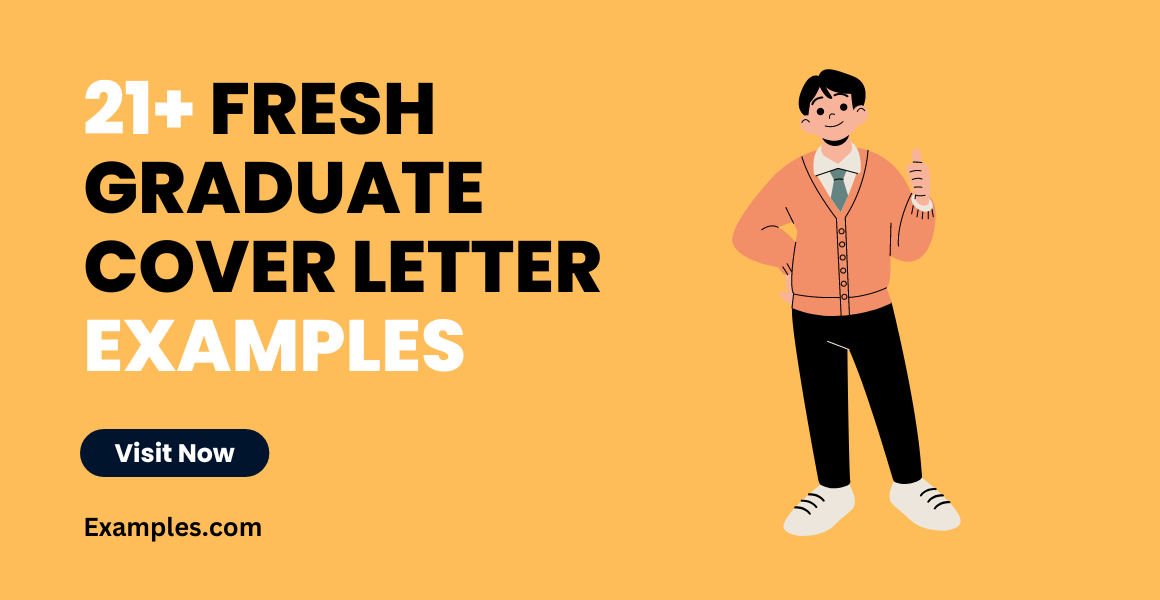
Applying for your first job or internship after graduation can be challenging, especially when you have little to no experience in the workforce. A well-crafted cover letter can significantly increase your chances of landing that dream job. This article will guide you on how to write an effective fresh graduate cover letter, provide examples, and offer practical tips to help you stand out from the competition.
What is a Fresh Graduate Cover Letter?
A Fresh Graduate Cover Letter is a document accompanying a resume, specifically written by recent graduates seeking their first job or internship opportunity. This letter focuses on their academic achievements, internship experience, coursework, and relevant skills that align with the job’s requirements.
What is the Best Example of a Fresh Graduate Cover Letter?
The best cover letter example of a fresh graduate seamlessly merges academic accomplishments, relevant skills, and any internships or volunteer work to demonstrate a candidate’s potential to succeed in the targeted role. The key is to focus on transferable skills and highlight how you can contribute to the company.
Dear Hiring Manager,
I am excited to apply for the junior analyst position at XYZ Company, as advertised on your careers page. As a recent Business Administration graduate from ABC University, I am eager to apply my academic knowledge in a practical setting.
During my time at ABC University, I majored in Finance and completed an internship with DEF Firm. I worked directly under the senior analyst and assisted with data analysis and presentation. This experience, combined with my academic background, makes me a strong candidate for this position.
I am confident that my passion for data analysis and strong analytical skills would allow me to make a significant contribution to the XYZ team. Thank you for considering my application. I look forward to the opportunity to discuss how I can contribute to your team.
Yours Sincerely, [Your Name]
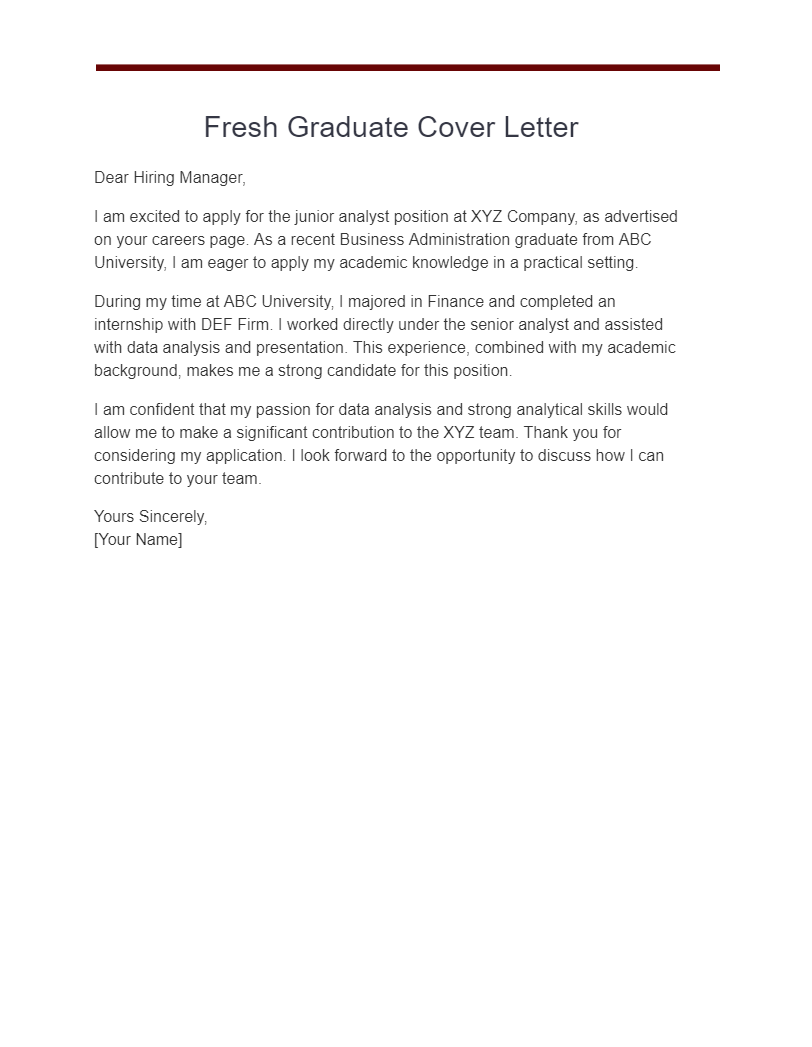
Size: 27 KB
Free Fresh Graduate Cover Letters – Copy & Paste
We understand that writing a cover letter can be daunting, especially when you’re fresh out of college. Here are some free templates to guide you. You can copy, paste, and customize them to suit your specific circumstances and the job you’re applying for.
Fresh Graduate Cover Letter with No Experience Example
Writing a cover letter with no work experience can be a challenge, but it’s certainly not impossible. In such a case, your aim should be to highlight your academic achievements, volunteer work, internships, and transferable skills. The example below is a guide on how to write a compelling cover letter even with no work experience:
Dear [Hiring Manager’s Name],
I am writing to apply for the [Job Title] position at [Company Name], as advertised on [Job Advertisement Source]. As a recent graduate from [Your University] with a degree in [Your Degree], I am eager to start my career in [Industry Name] with an innovative company such as yours.
During my time at university, I [talk about a project or accomplishment]. Additionally, I developed strong [mention specific skills] skills, which I believe are highly applicable to the role of [Job Title].
I am excited about the opportunity to bring my unique blend of skills and experience to your esteemed company and am confident in my ability to become a productive member of your team.
Thank you for considering my application.
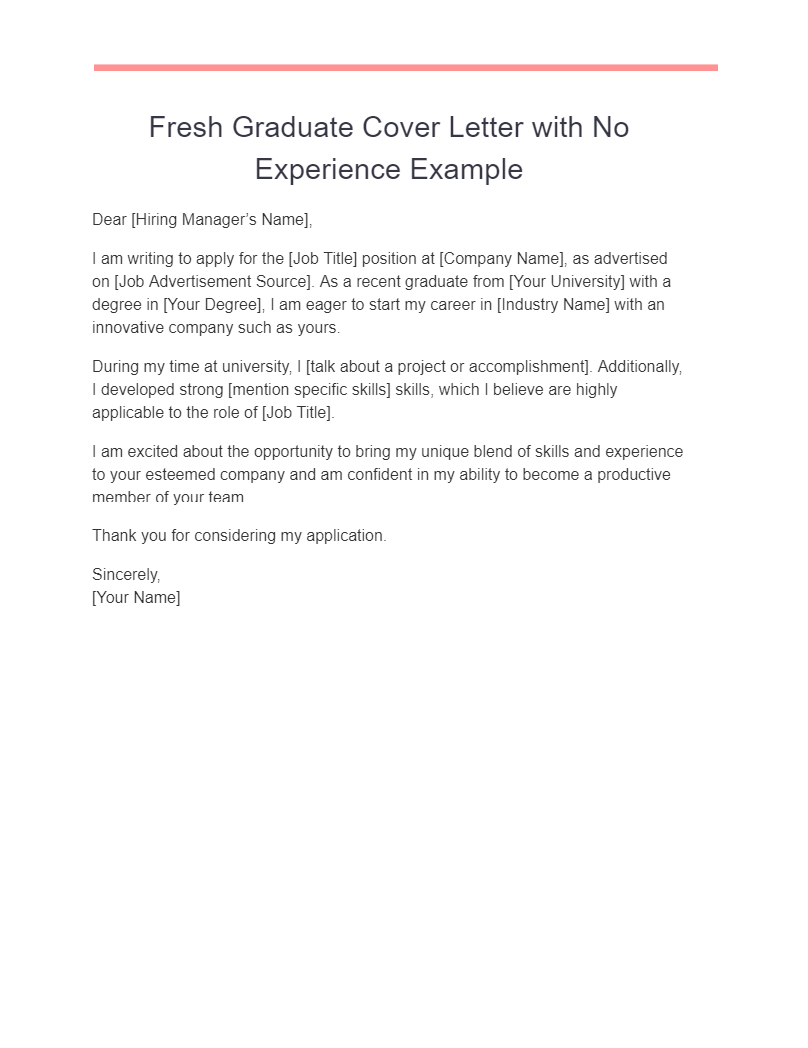
Size: 26 KB
How to Use: Use this template as a guide. Remember to personalize it with your own details, and add specific accomplishments and skills that align with the job description. Tailoring your cover letter to each job application will show the hiring manager that you’re genuinely interested in the position and the company.
Fresh Graduate Cover Letter for Job Application Examples
Crafting an effective cover letter for job application as a fresh graduate for a specific job application requires highlighting your academic achievements, relevant coursework, internships, or projects related to the job. Here is an example to guide you:
I am writing to apply for the [Job Title] position at [Company Name] as advertised on [Job Advertisement Source]. As a recent graduate from [University Name] with a degree in [Degree Name], I believe I am well-equipped to contribute effectively to your team.
In my final year project, I worked on [describe the project and your role briefly]. This experience gave me hands-on exposure to [mention relevant skills or knowledge that are pertinent to the job]. I am eager to apply this knowledge and grow further at [Company Name].
Thank you for considering my application. I look forward to the possibility of discussing my application with you further.
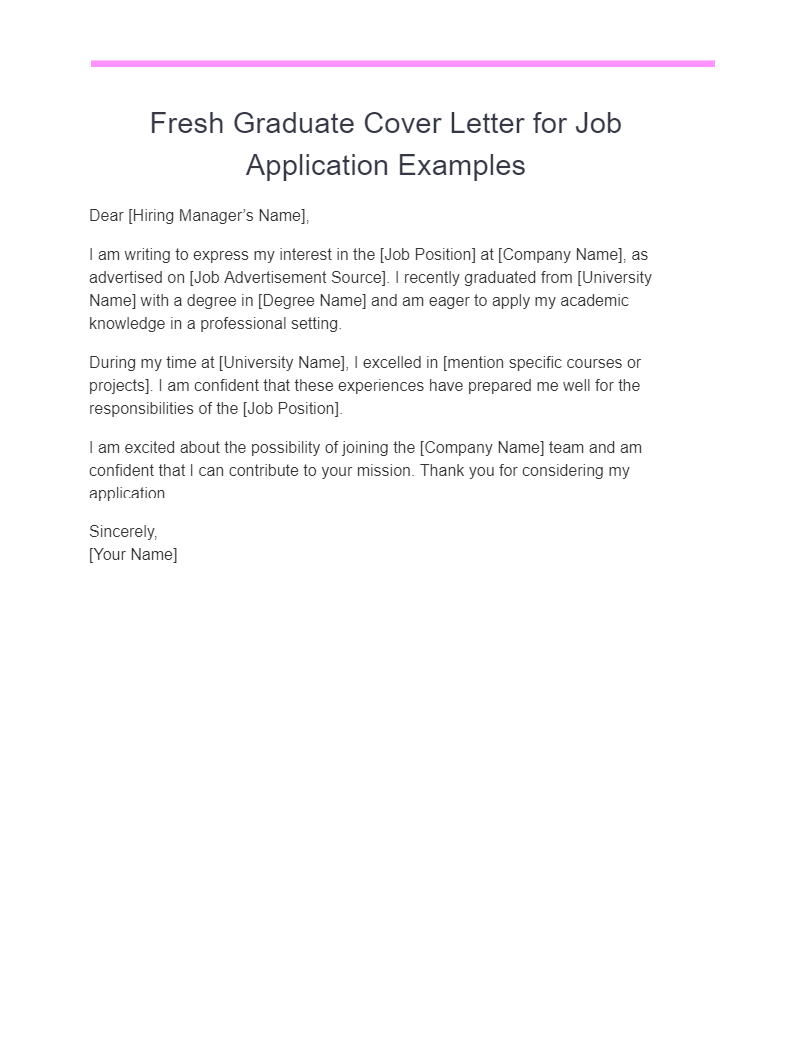
How to Use: Remember to replace the placeholders with your information and tailor the content to match the job requirements and the company’s culture.
Fresh Engineering Graduate Cover Letter Example
As a fresh engineering graduate, your cover letter should highlight technical skills, academic projects, and engineering internships. Here’s an example:
I’m writing to apply for the [Job Title] position at [Company Name], as advertised on [Job Advertisement Source]. I recently graduated from [University Name] with a Bachelor’s degree in [Engineering Discipline].
During my time at university, I worked on a project [describe the project and your role], which helped me develop practical skills in [mention specific engineering skills]. In addition, my internship at [Company Name] allowed me to gain hands-on experience in the field.
I am eager to contribute my energy, dedication, and technical skills to your esteemed company. Thank you for considering my application.
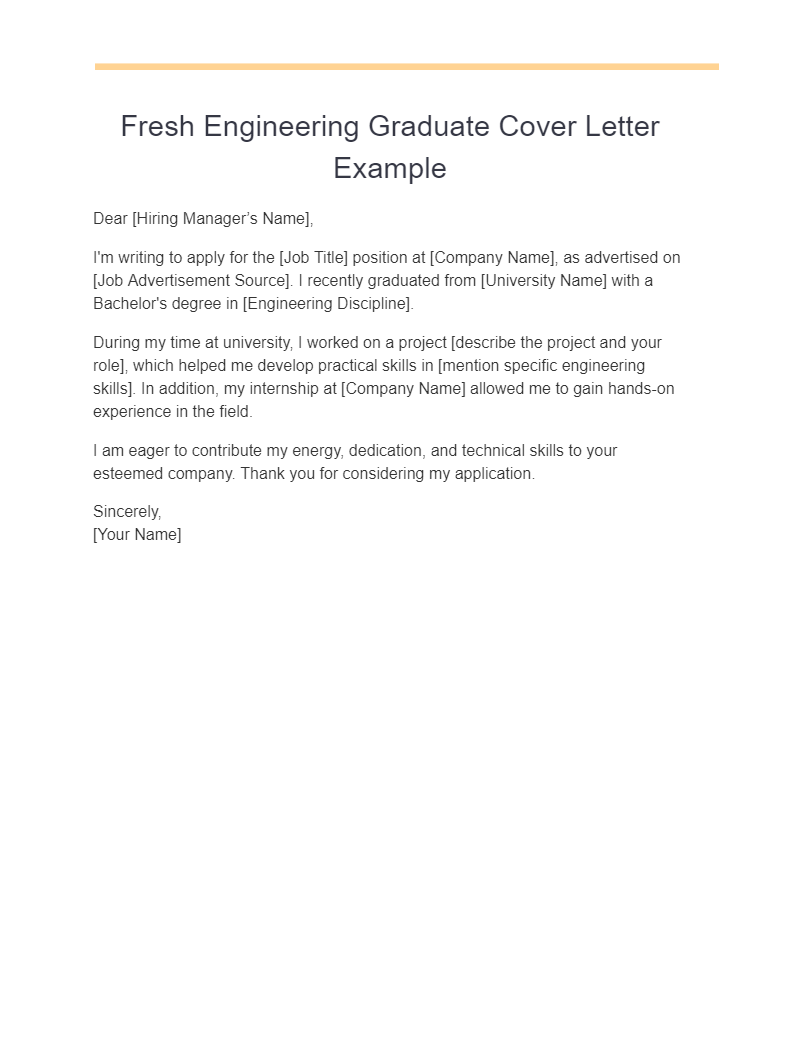
How to Use: Adapt this engineering cover letter to fit your own experiences and achievements. Be sure to highlight engineering projects or internships that align with the job you’re applying for.
Fresh Medical Graduate Cover Letter Example
A cover letter for a fresh medical graduate should focus on clinical experiences, internships, and your passion for medicine. Here’s a suitable example:
I am writing to express my interest in the [Job Title] position at [Company Name], as advertised on [Job Advertisement Source]. As a recent graduate from [University Name] with a [Degree Name], I am eager to begin my career at your respected institution.
During my clinical rotations at [Hospital/Clinic Name], I gained hands-on experience in [specific medical skills]. My experience, coupled with my passion for helping others, makes me a strong candidate for this position.
I look forward to the opportunity to provide compassionate and dedicated care to your patients. Thank you for considering my application.
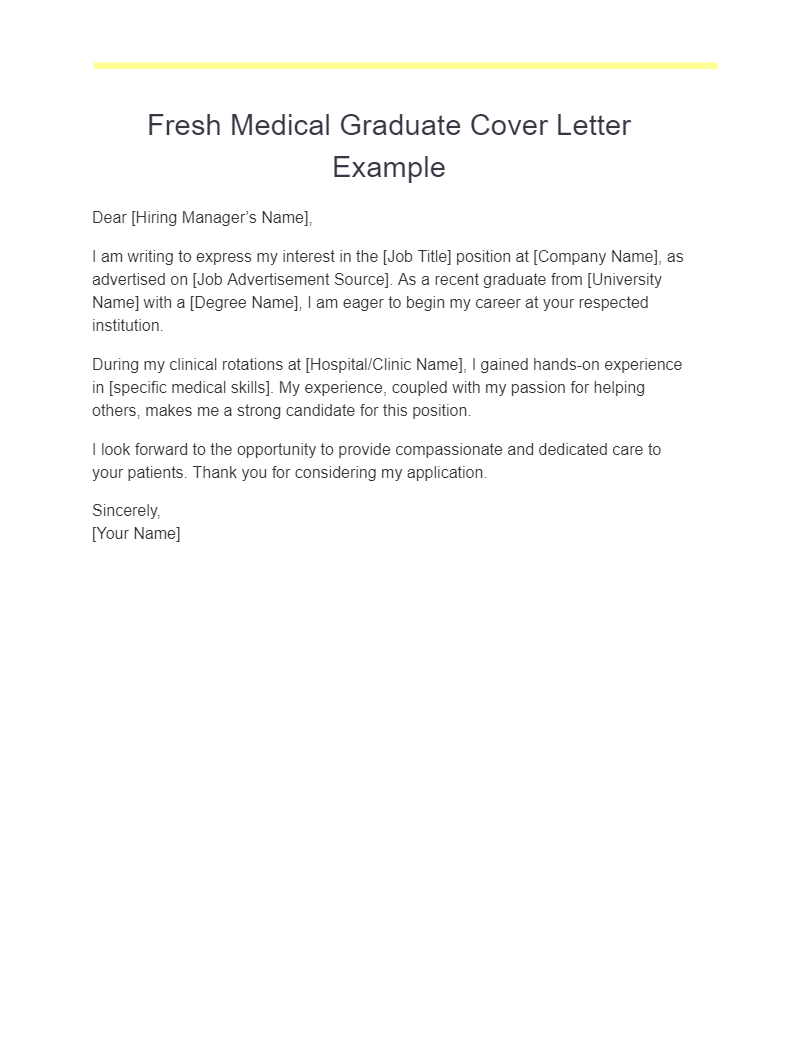
How to Use: Modify this example by inserting your details, the hiring manager’s name, and specific skills or experiences relevant to the job.
Fresh Architect Graduate Cover Letter Example
A fresh architect graduate cover letter should showcase your design skills, technical knowledge, and any relevant projects or internships you’ve completed. Here’s an example:
I’m applying for the [Job Title] position at [Company Name], which I saw listed on [Job Advertisement Source]. I have recently graduated from [University Name] with a Bachelor’s degree in Architecture.
In my final year, I was part of a project [describe the project and your role]. This experience allowed me to develop my design and technical skills in [mention specific skills].
I am excited about the opportunity to contribute to [Company Name] and to grow as a professional. Thank you for considering my application.
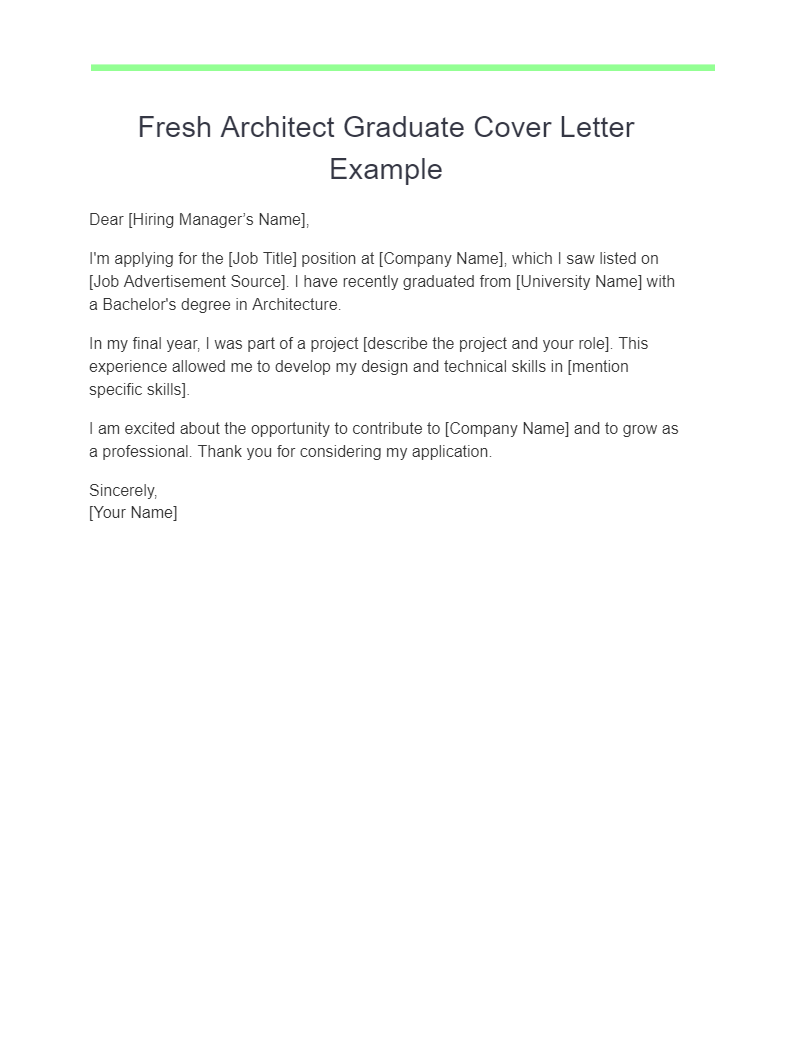
Size: 188 KB
How to Use: Personalize this template by including your specific experiences, skills, and academic achievements related to the field of architecture.
Fresh Graduate Cover Letter for Customer Service Example
As a fresh graduate applying for a customer service position, your cover letter should highlight your communication skills, problem-solving abilities, and any customer service or sales-related experience. Here’s a sample:
I am writing to apply for the [Job Title] position at [Company Name] as advertised on [Job Advertisement Source]. I recently graduated from [University Name] with a degree in [Degree Name], and I believe my skills and experiences align with your needs.
During my part-time role at [Previous Company Name], I developed strong customer service skills and a solution-focused mindset. I also learned to handle customer complaints and maintain a positive customer experience.
I am excited about the possibility of bringing my unique blend of skills and experience to [Company Name]. Thank you for considering my application.
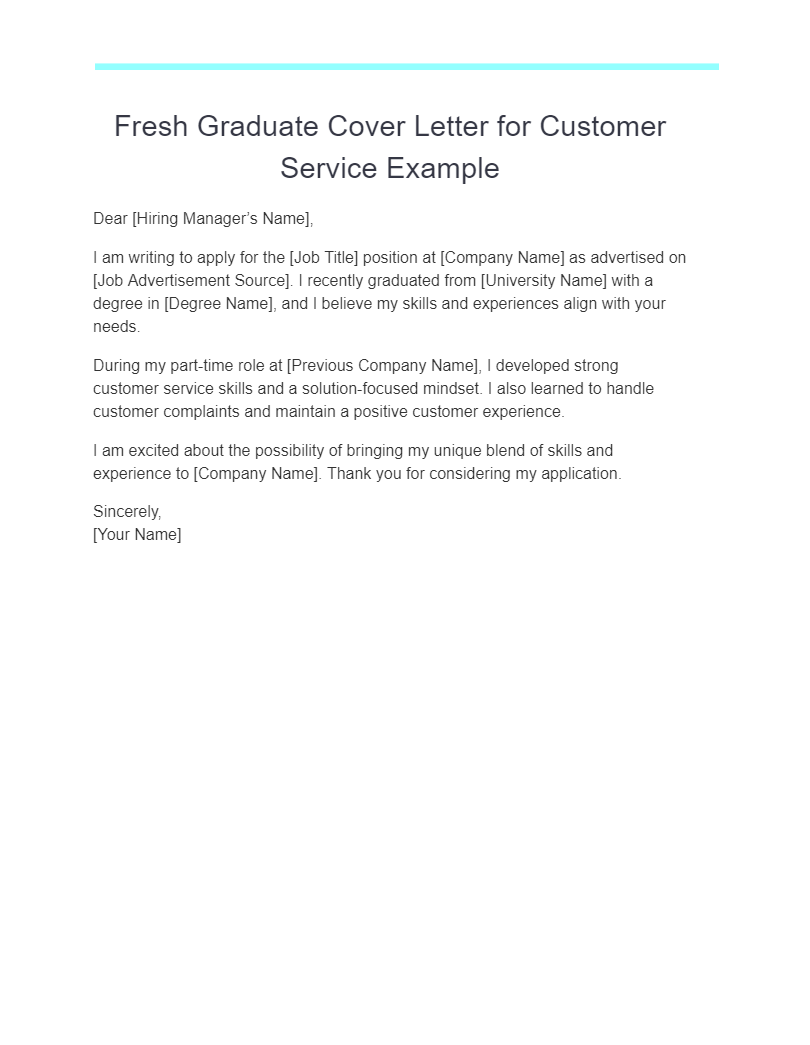
How to Use: Modify this customer service cover letter to include your own experiences, especially any roles or projects where you have demonstrated strong customer service skills.
Fresh Graduate Cover Letter for Internship Example
When applying for an internship as a fresh graduate, your cover letter should highlight your eagerness to learn, relevant coursework, and any academic or extracurricular achievements. Here’s a sample:
Dear [Hiring Manager’s Name],
I’m excited to apply for the internship position at [Company Name] which I discovered on [Job Advertisement Source]. As a recent graduate from [University Name] with a degree in [Degree Name], I’m eager to apply my knowledge in a practical setting.
During my university career, I excelled in [mention specific courses or projects], which I believe will be beneficial for this role. My professors commended my [mention specific skills or attributes], and I’m confident these will be valuable in this internship.
Thank you for considering my application. I am looking forward to the possibility of contributing to [Company Name].
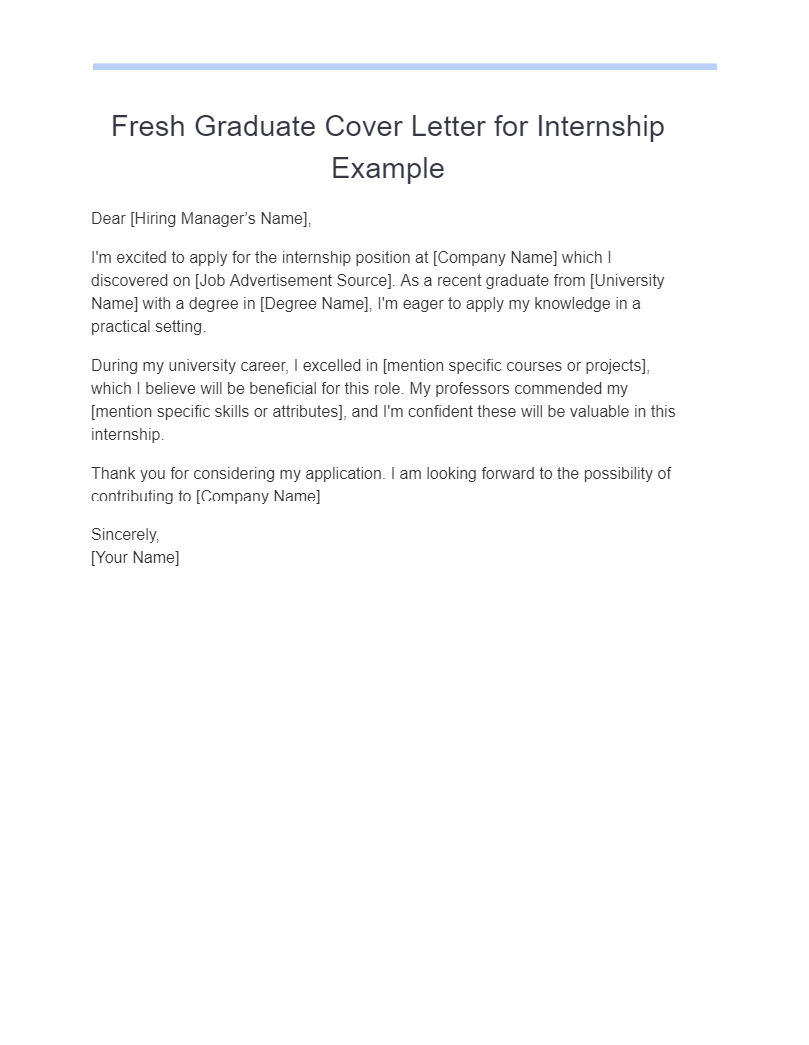
How to Use: Modify this template by including your specific academic and extracurricular achievements. Highlight skills and experiences that align with the internship role.
Fresh Graduate Cover Letter for Bank Teller Example
A fresh graduate cover letter for a bank teller position should showcase your attention to detail, mathematical skills, and any relevant internships or part-time roles. Here’s a sample:
I am writing to apply for the Bank Teller position at [Company Name] that I saw advertised on [Job Advertisement Source]. I recently graduated from [University Name] with a degree in [Degree Name], and I am eager to apply my skills in the banking industry.
During my time at university, I took several courses in banking and finance, which have given me a solid understanding of banking principles. I also completed an internship at [Internship Company Name], where I developed strong customer service skills.
I am excited about the possibility of bringing my dedication and strong work ethic to [Company Name]. Thank you for considering my application.
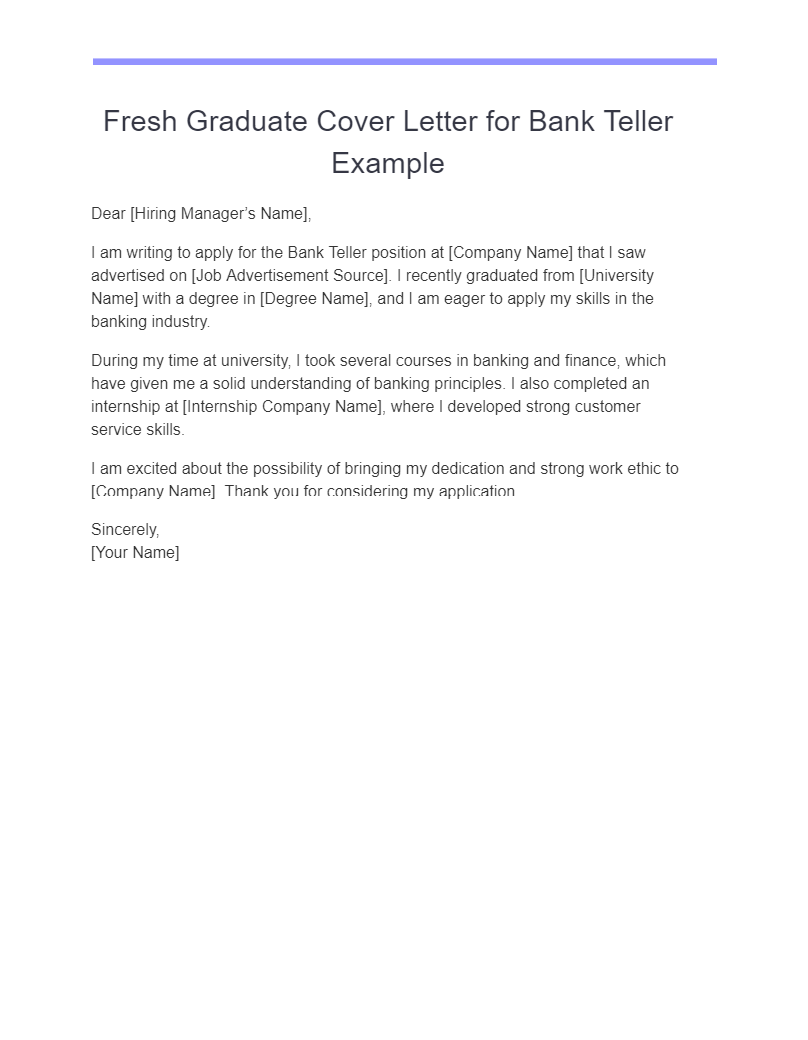
How to Use: Personalize this template by including your specific experiences, especially any roles or projects where you have demonstrated relevant skills.
Fresh Graduate Cover Letter for Finance Management Example
Applying for a position in finance management as a fresh graduate necessitates a cover letter that highlights analytical skills, attention to detail, and knowledge of financial principles. Consider this example:
I am excited to apply for the Finance Management trainee position at [Company Name] that I learned about from [Job Advertisement Source]. As a recent graduate from [University Name] with a degree in [Degree Name], I am eager to bring my financial acumen to your team.
My coursework in corporate finance, investment strategies, and business valuation, along with my proficiency in Excel, makes me a strong candidate for this position. During my internship at [Internship Company Name], I gained hands-on experience in financial reporting and analysis.
I am confident that I can contribute to [Company Name]’s goals and look forward to potentially joining your team. Thank you for considering my application.
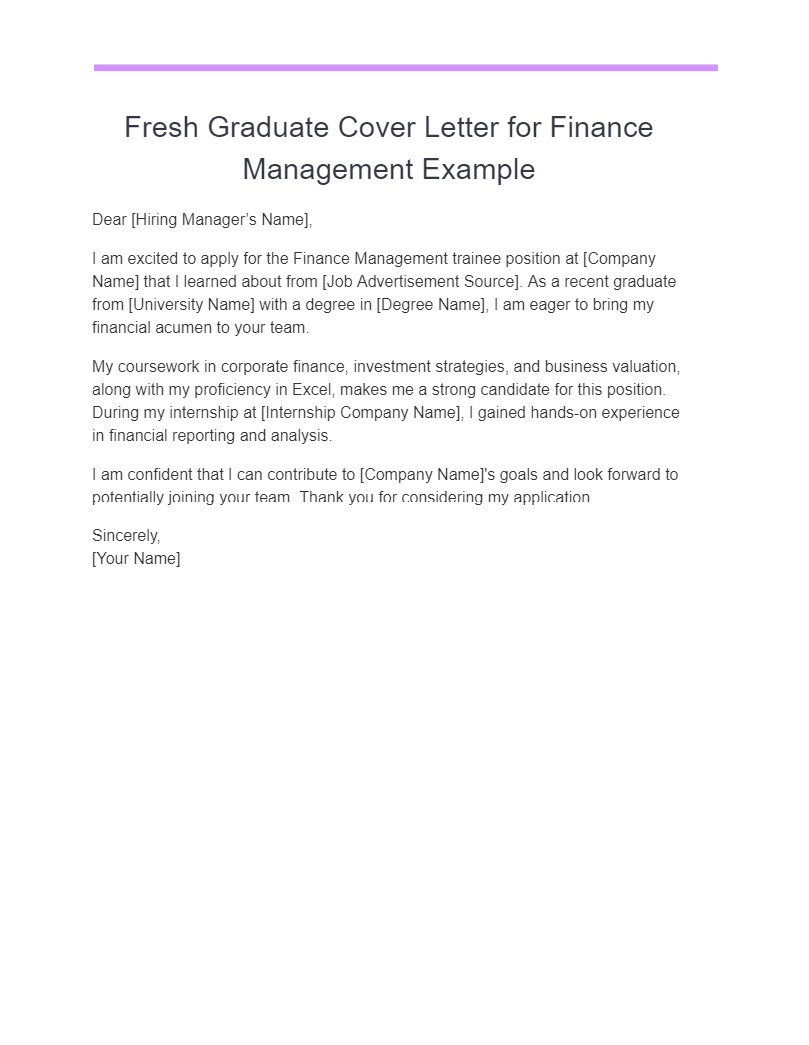
How to Use: Modify this finance cover letter to fit your specific skills and experiences. Highlight academic and internship experiences relevant to finance management.
Fresh Graduate Cover Letter for Job Application Example
For a fresh graduate job application, the cover letter should exhibit transferable skills, academic knowledge, and a willingness to learn. Here is an example:
I am writing to express my interest in the [Job Position] at [Company Name], as advertised on [Job Advertisement Source]. I recently graduated from [University Name] with a degree in [Degree Name] and am eager to apply my academic knowledge in a professional setting.
During my time at [University Name], I excelled in [mention specific courses or projects]. I am confident that these experiences have prepared me well for the responsibilities of the [Job Position].
I am excited about the possibility of joining the [Company Name] team and am confident that I can contribute to your mission. Thank you for considering my application.
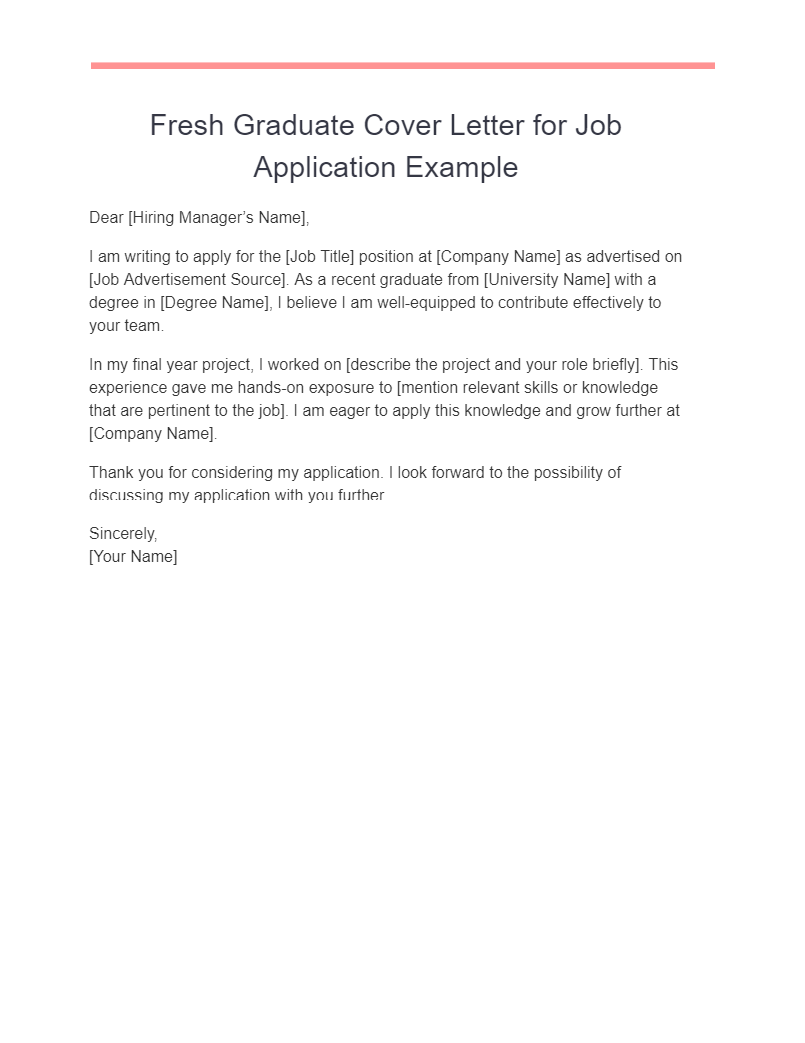
How to Use: This general template can be adapted to any job application. Include specifics about your degree and university experience, and tailor the letter to the job responsibilities.
Fresh Mechanical Engineering Graduate Cover Letter Example
A cover letter for a fresh mechanical engineering graduate should emphasize technical knowledge, hands-on experiences during internships or projects, and problem-solving skills. Here is an example:
I am writing to apply for the Mechanical Engineer position at [Company Name] that was advertised on [Job Advertisement Source]. I recently graduated from [University Name] with a Bachelor’s degree in Mechanical Engineering and I am excited to apply the skills I have acquired in a practical setting.
During my university studies, I undertook a project on [briefly describe a project or achievement], which honed my problem-solving and teamwork skills. My internship at [Internship Company Name] gave me hands-on experience in designing mechanical systems and conducting failure analysis, both of which are critical for the [Job Position].
I am eager to bring my engineering skills to [Company Name] and contribute to your ongoing projects. Thank you for considering my application.
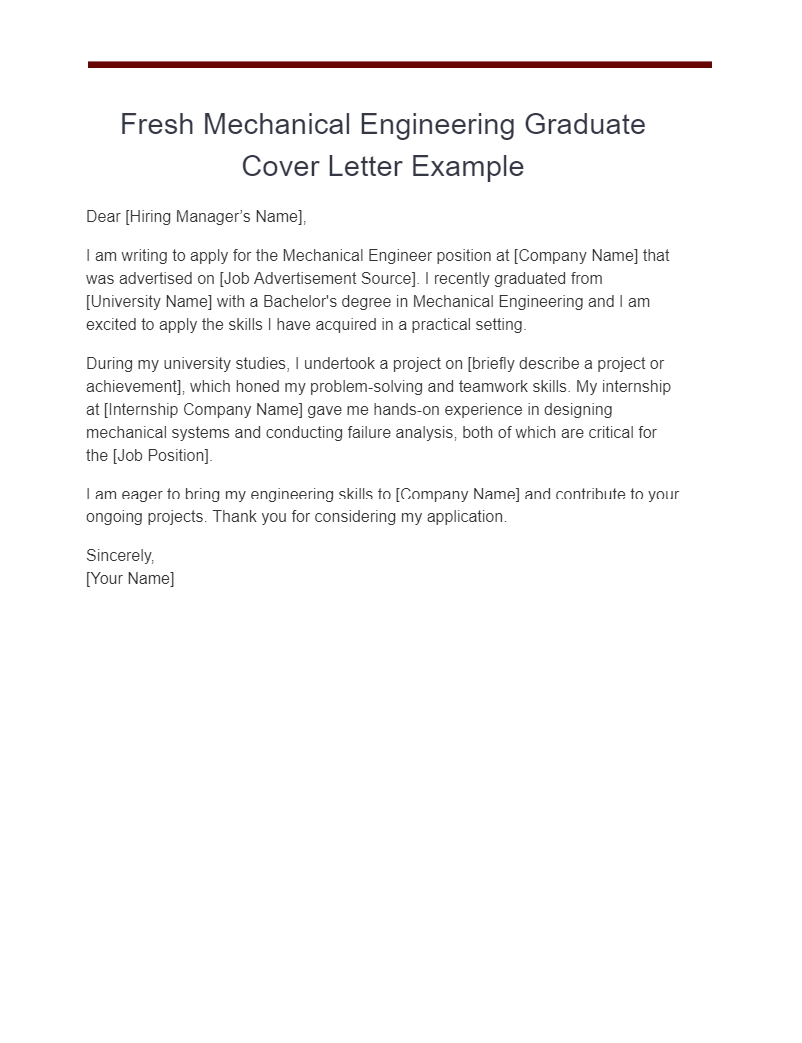
How to Use: Modify this template to fit your specific skills and experiences. Highlight academic and internship experiences relevant to mechanical engineering.
Sample Fresh Graduate Cover Letter Example
A general cover letter sample for fresh graduates across fields may look like this:
I am writing to apply for the position of [Job Position] at [Company Name], as advertised on [Job Advertisement Source]. Having recently graduated from [University Name] with a degree in [Degree Name], I am excited to bring my skills and knowledge to your team.
Throughout my academic career, I have demonstrated [mention specific skills or accomplishments]. These experiences have equipped me with the ability to [describe how these experiences will benefit the job role].
I look forward to the opportunity of discussing my application with you further. Thank you for considering my application.
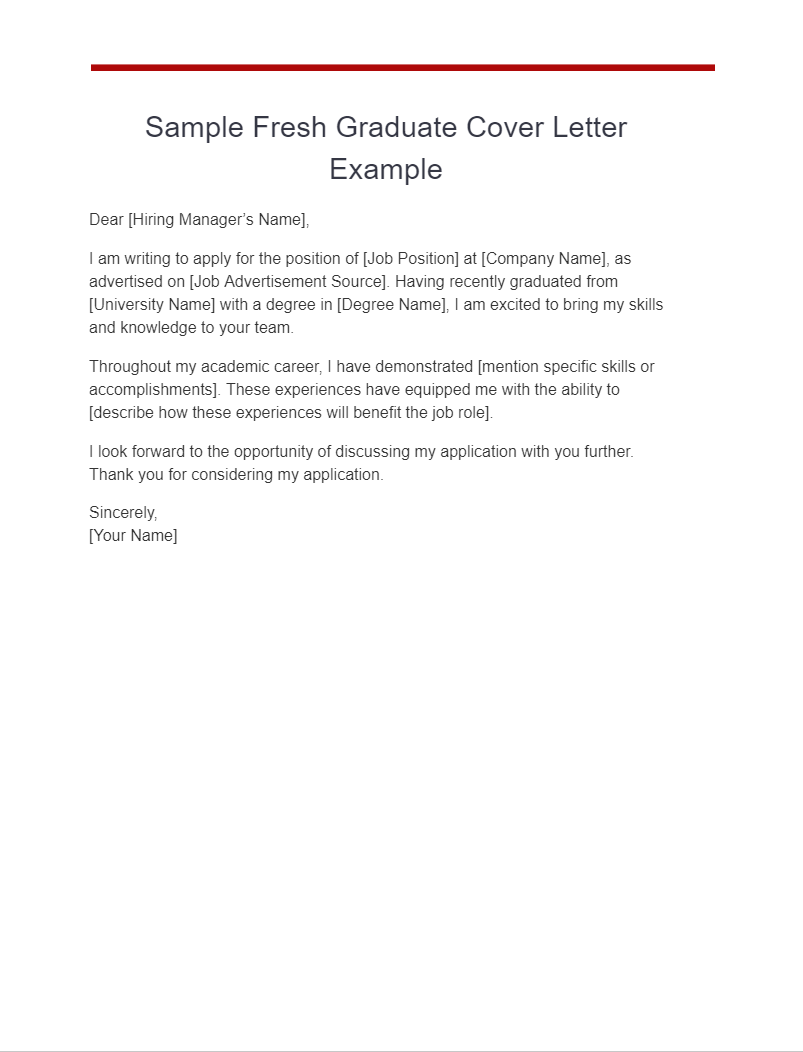
How to Use: This is a broad fresh graduate cover letter template that can be modified to suit any job application. Replace the placeholders with your specific details and tailor the skills and experiences to match the job description.
Fresh Graduate Cover Letter for Human Resource Example
A fresh graduate applying for a position in human resources should highlight their understanding of employee relations, data analysis, and legal regulations. Let’s consider this example:
I am excited to apply for the Human Resource Assistant position at [Company Name] as advertised on [Job Advertisement Source]. I recently graduated from [University Name] with a Bachelor’s degree in Human Resources Management and am eager to start my career in your esteemed organization.
During my final year, I completed an internship with [Company Name], where I gained firsthand experience in employee relations, HR software, and legal compliance. I believe these skills will greatly contribute to your team.
I look forward to the possibility of contributing to [Company Name]. Thank you for considering my application.
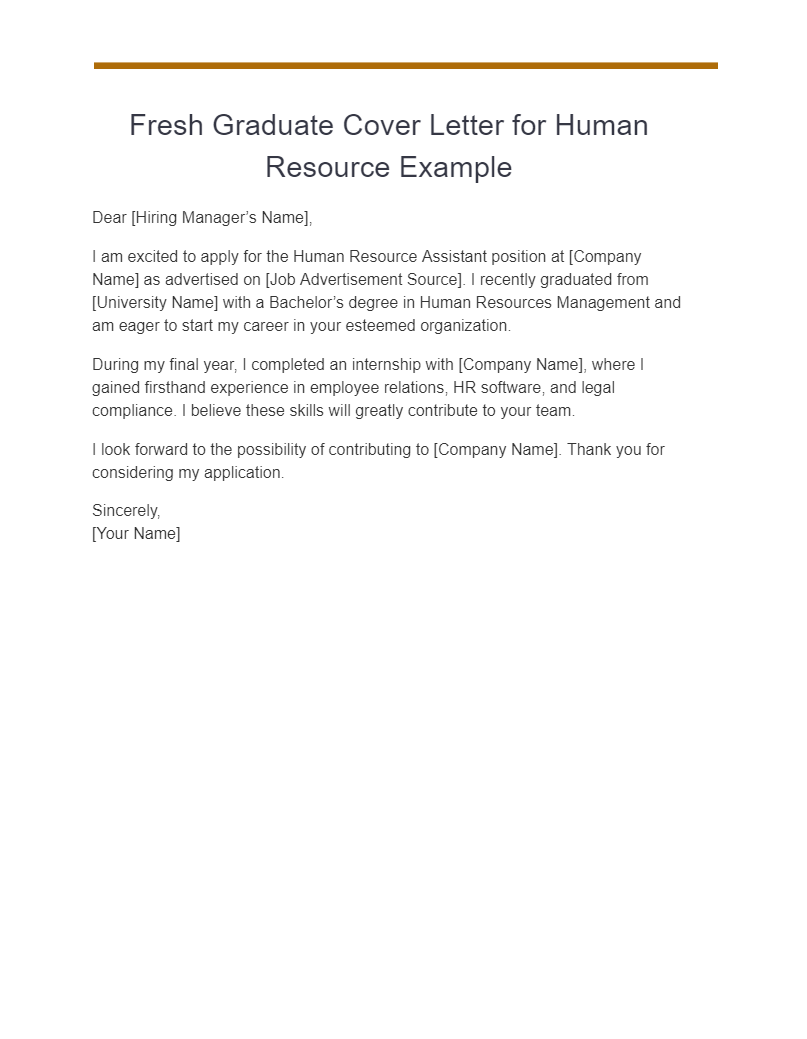
How to Use: Customize this human resource cover letter with your details. Emphasize any internship experiences, HR-related coursework, or capstone projects.
Fresh Graduate Cover Letter for Accounting Example
For an accounting position, a fresh graduate should emphasize their proficiency with accounting software, attention to detail, and understanding of accounting principles. Here’s an example:
I am writing to apply for the Accountant position at [Company Name] advertised on [Job Advertisement Source]. I am a recent graduate from [University Name] with a Bachelor’s degree in Accounting, ready to start my career in the field.
At university, I took part in an intensive Accounting practicum where I developed strong analytical skills and familiarity with popular accounting software, such as QuickBooks and Sage. I am confident that my skills will contribute to [Company Name].
Thank you for considering my application. I look forward to the possibility of discussing it further with you.
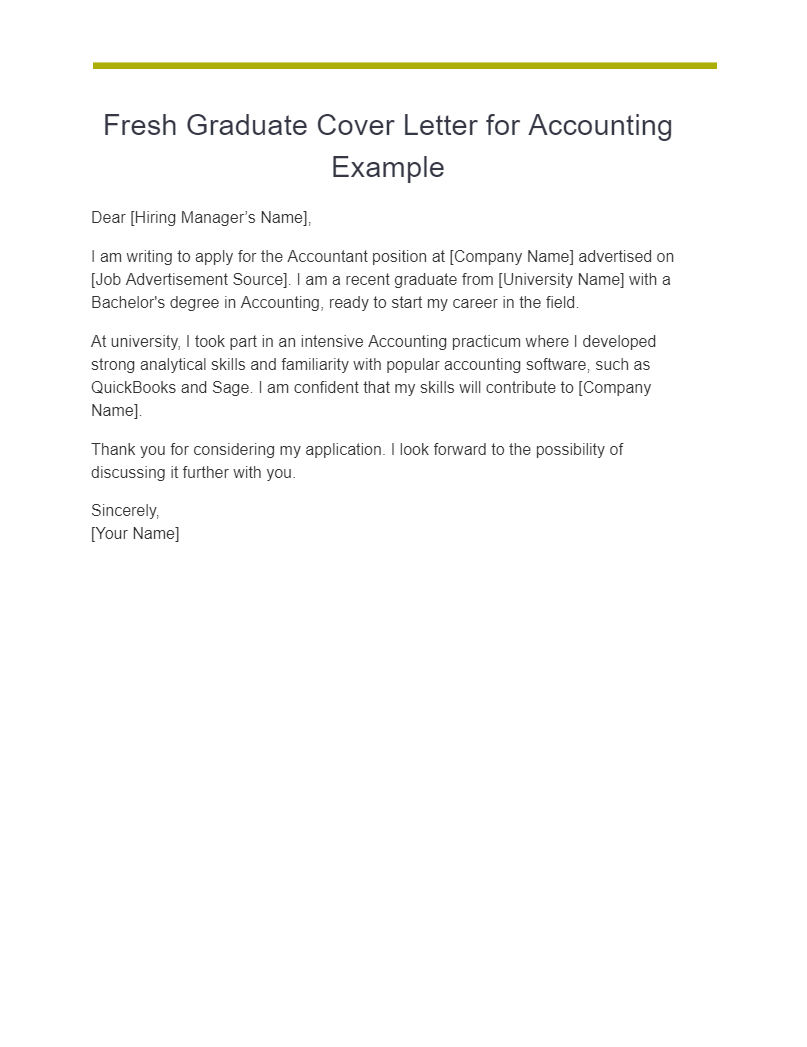
How to Use: Adapt this letter by including specific coursework or projects relevant to the job role. You can also mention certifications (like CPA) if you have any.
Fresh Graduate Cover Letter for Business Administration Example
For a Business Administration role, a fresh graduate can underline their understanding of business processes, organizational behavior, and project management. Here is a great example:
I’m thrilled to apply for the Business Administration Trainee position at [Company Name], as posted on [Job Advertisement Source]. I am a recent graduate from [University Name] with a degree in Business Administration and am keen to apply the knowledge and skills I have acquired in a practical setting.
As part of my course, I have completed projects in areas such as project management, organizational behavior, and business strategy. I believe these experiences will be beneficial to [Company Name] and align with the duties of the position.
I look forward to the opportunity to discuss my application further.
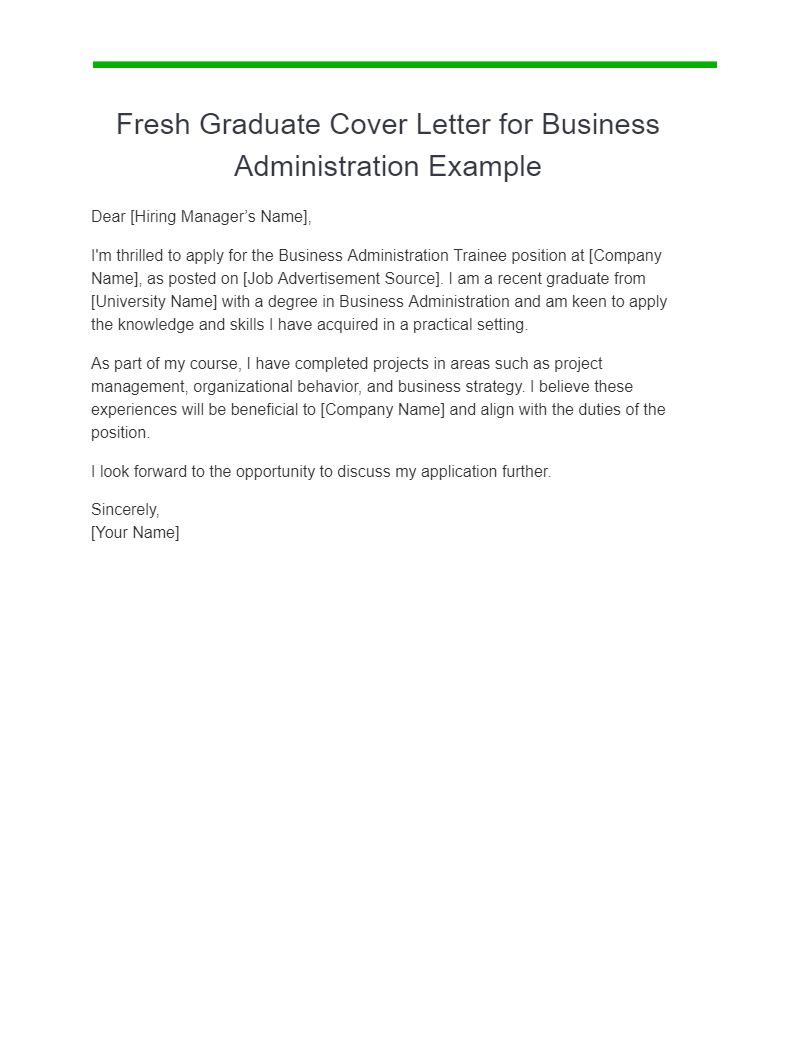
How to Use: Replace the brackets with your own information, and feel free to highlight any specific business administration projects or internships that would make you a strong candidate.
Fresh Graduate Cover Letter for Interior Design Example
A fresh graduate applying for an Interior Design role might want to highlight their creativity, knowledge of design software, and understanding of design principles. Here’s a sample:
I am writing to apply for the Interior Designer position at [Company Name] listed on [Job Advertisement Source]. As a recent graduate from [University Name] with a degree in Interior Design, I am eager to apply my creative skills and education in a practical setting.
I have developed a keen eye for design and a proficiency in [mention design software], which I believe align well with the job description. In addition, my senior year project, which involved redesigning a commercial space, has given me practical experience that I can bring to your team.
Sincerely, [Your Name]
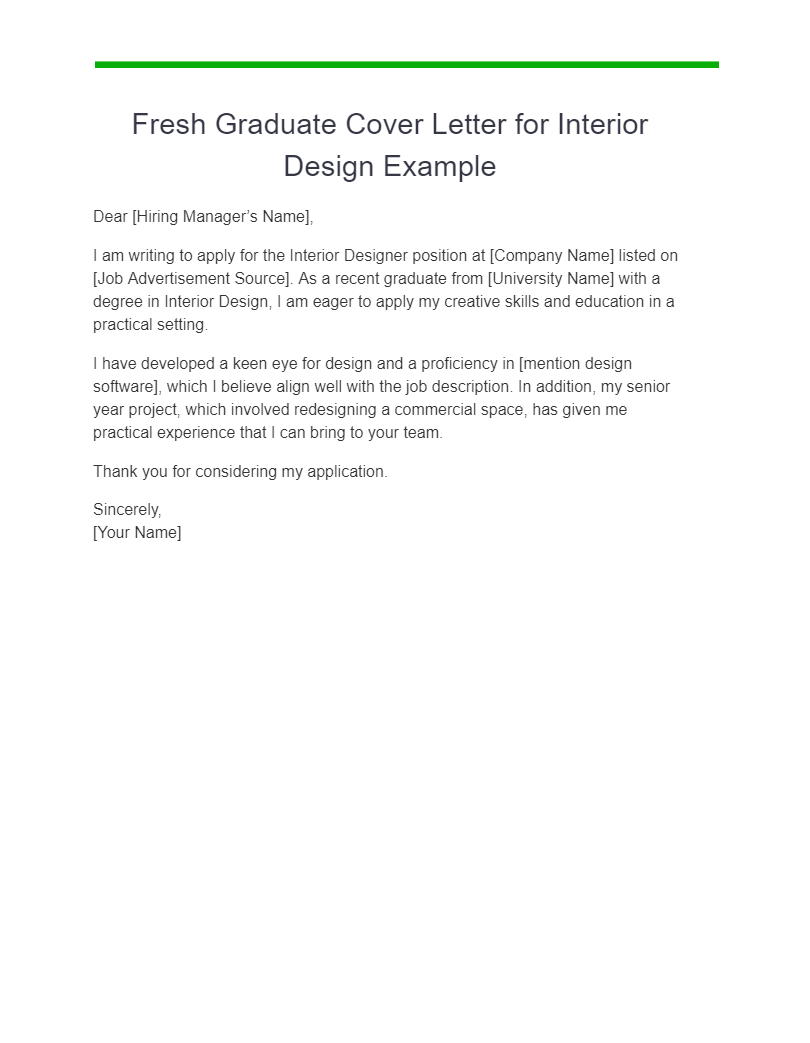
How to Use: Be sure to include details about your design software skills and any hands-on experience from school projects or internships.
Fresh Graduate Cover Letter for Graphic Designer Example
A graphic designer cover letter for fresh graduate can highlight their creative skills, software expertise, and understanding of design principles. Here’s a sample:
I am excited to apply for the Junior Graphic Designer position at [Company Name], as advertised on [Job Advertisement Source]. As a recent graduate from [University Name] with a degree in Graphic Design, I am passionate about visual communication and eager to put my creativity to work.
In my coursework, I honed my skills in Adobe Creative Suite, which I understand is a requirement for this position. My portfolio, which I have included as an attachment, demonstrates a variety of design skills including typography, color theory, and digital illustration.
I look forward to potentially discussing my qualifications further.
How to Use: Replace the placeholders with your details. Make sure to highlight any specific graphic design software skills or projects that you have worked on.
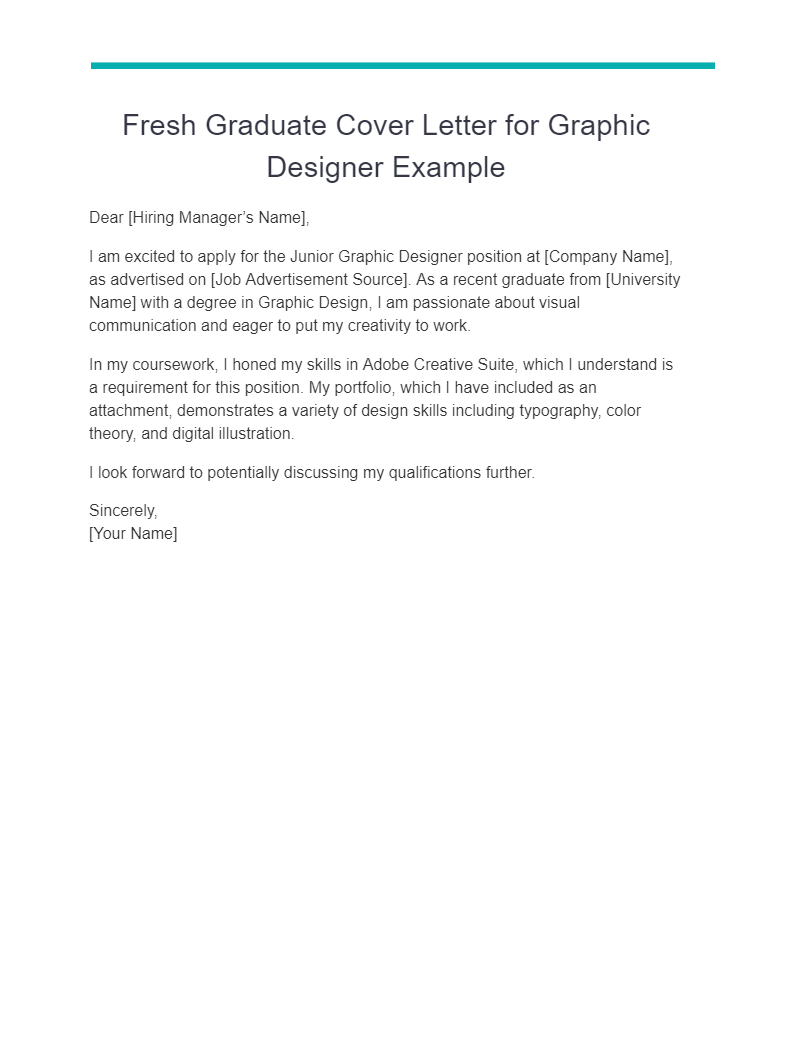
General Fresh Graduate Cover Letter Example
For a more general application, a fresh graduate might highlight transferable skills, academic achievements, and eagerness to learn. Here’s an example:
I am eager to apply for the [Job Title] role at [Company Name], as listed on [Job Advertisement Source]. As a recent graduate from [University Name] with a degree in [Your Degree], I am confident that my academic achievements and passion for learning will make me a strong candidate for this role.
I have honed my skills in research, project management, and teamwork during my time at university and I’m excited to bring these skills to a professional setting.
How to Use: Be sure to include information about your degree and any transferable skills that would be relevant to the role you’re applying for.
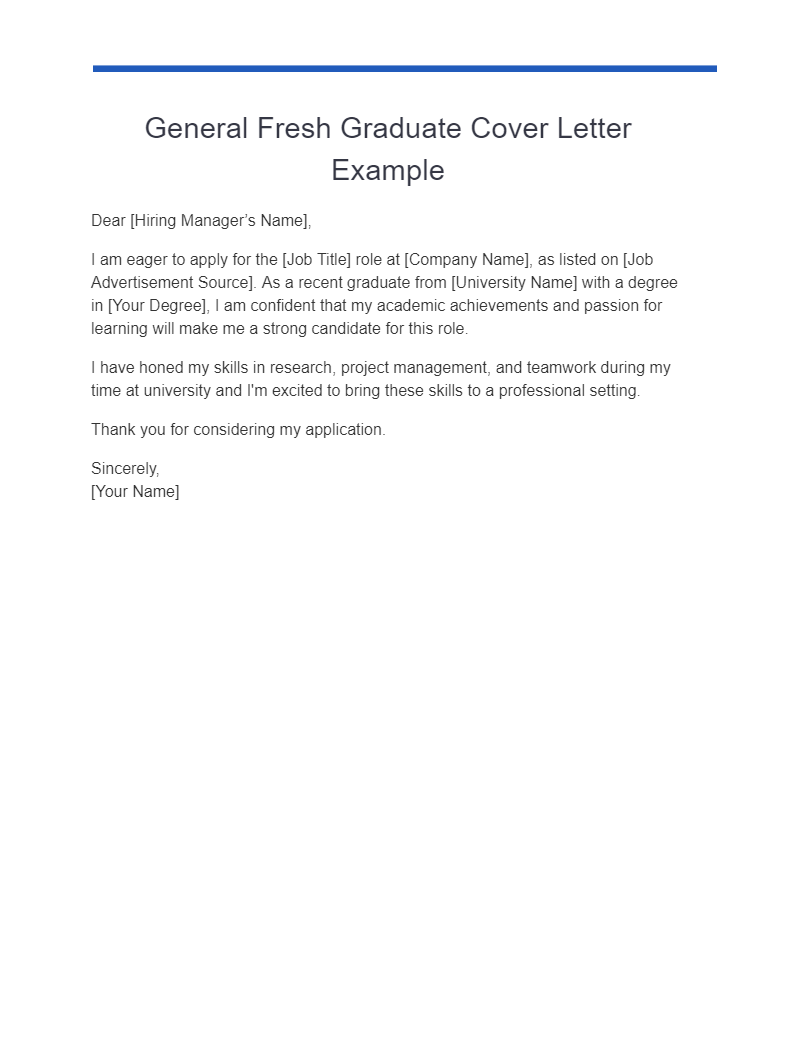
Fresh College Graduate Cover Letter Example
For fresh college graduates, a cover letter might highlight academic accomplishments, internships, and relevant coursework. Here’s a sample:
I’m thrilled to apply for the [Job Title] role at [Company Name] advertised on [Job Advertisement Source]. As a recent graduate from [University Name], I have a strong educational foundation in [Your Major], and I am eager to bring my knowledge and enthusiasm to this role.
During my time in college, I completed an internship at [Internship Company] where I gained experience in [describe what you learned or did]. I believe this experience, coupled with my academic accomplishments, makes me a strong fit for this role.
How to Use: Replace the placeholders with your details. Highlight any internships, relevant coursework, or academic accomplishments that make you a strong candidate for the role.
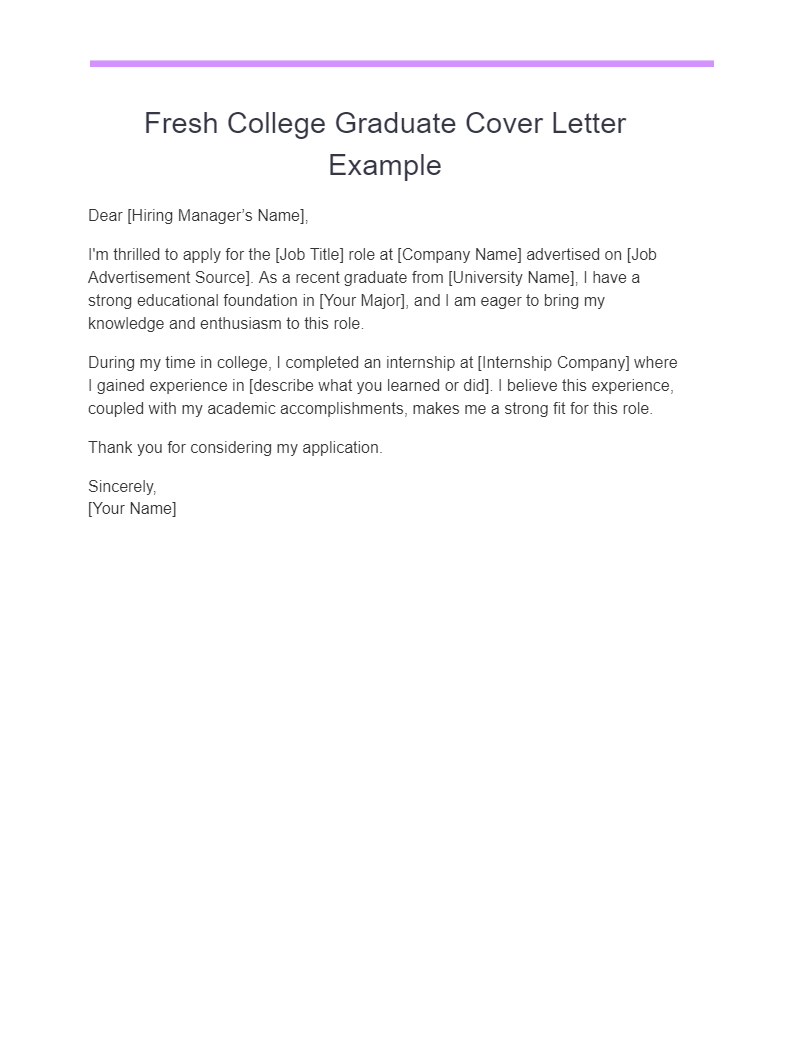
Fresh Graduate Cover Letter for Technician Example
A technician’s cover letter would showcase technical skills, practical experience, and relevant academic knowledge. Here’s a sample:
I am excited to apply for the Technician position at [Company Name], as listed on [Job Advertisement Source]. As a recent graduate of [University/College Name] with a degree in [Your Degree], I am well equipped with the theoretical knowledge and practical training necessary for this role.
During my academic tenure, I gained hands-on experience in troubleshooting, maintaining and repairing various types of equipment, which I believe will serve me well in this role. I am confident in my ability to quickly learn and adapt to new systems and procedures.
How to Use: Personalize this letter by including specific details about the technical skills and experience you possess that align with the job requirements.
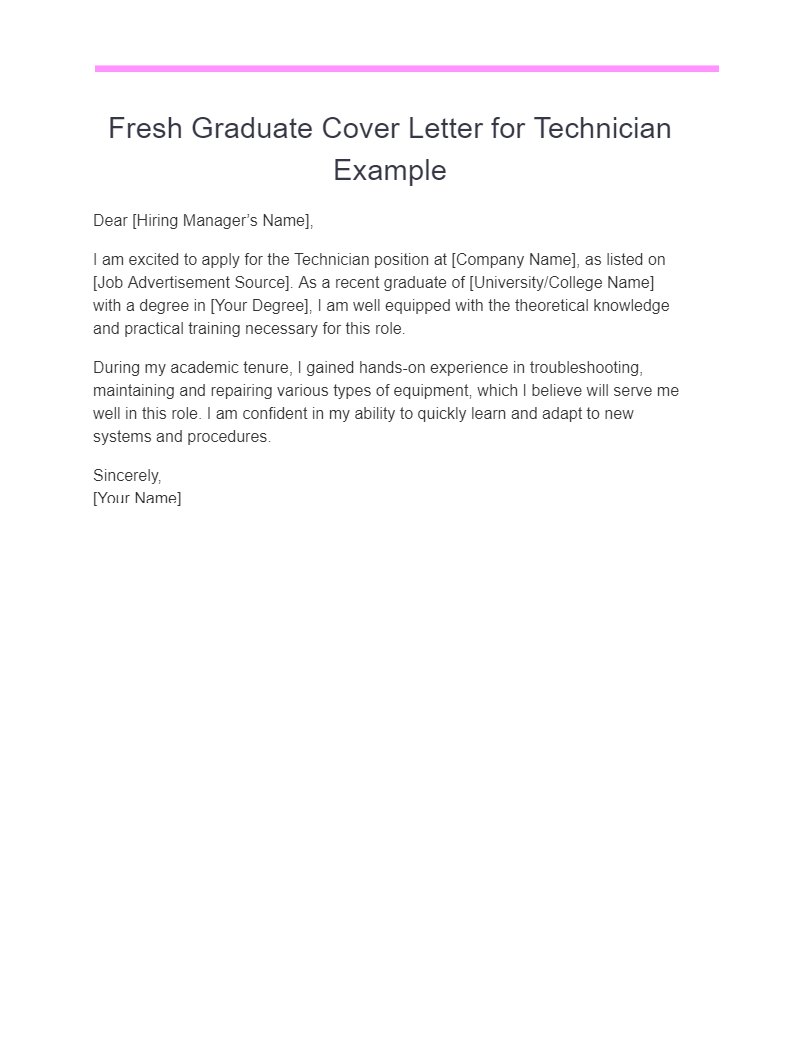
Fresh Graduate Cover Letter for IT Job Example
An IT job cover letter would showcase software and hardware knowledge, problem-solving skills, and relevant academic achievements. Here’s an example:
I am thrilled to apply for the IT Specialist role at [Company Name], as advertised on [Job Advertisement Source]. As a recent graduate of [University Name] with a degree in Information Technology, I am excited to apply my skills in a practical setting.
During my studies, I excelled in my coursework on networks, databases, and user support. I also gained practical experience through an internship at [Company Name], where I honed my problem-solving skills and learned to provide excellent customer service.
How to Use: Replace the placeholders with your specific details. Be sure to emphasize any coursework, internships, or skills that are relevant to the role you’re applying for.
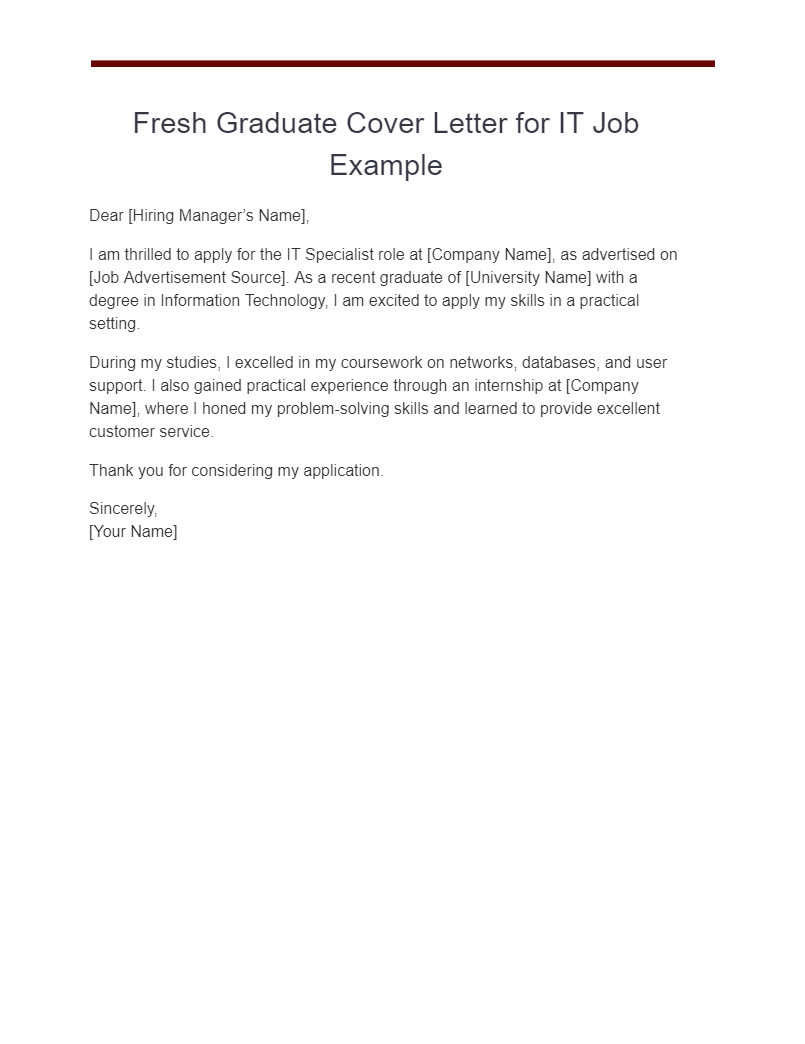
Recent Graduate Cover Letter Example
A recent graduate can highlight their academic achievements, eagerness to contribute, and transferable skills. Here’s an example:
I am excited to apply for the [Job Title] role at [Company Name], as listed on [Job Advertisement Source]. As a recent graduate of [University Name] with a degree in [Your Degree], I am confident in my ability to make a meaningful contribution to your team.
Throughout my academic career, I have consistently demonstrated a strong work ethic, critical thinking skills, and the ability to meet deadlines. I am eager to apply these skills in a professional setting and believe I would make a valuable addition to your team.
How to Use: Fill in the placeholders with your personal details. Be sure to emphasize your strengths and any skills or experiences that make you a strong fit for the role.
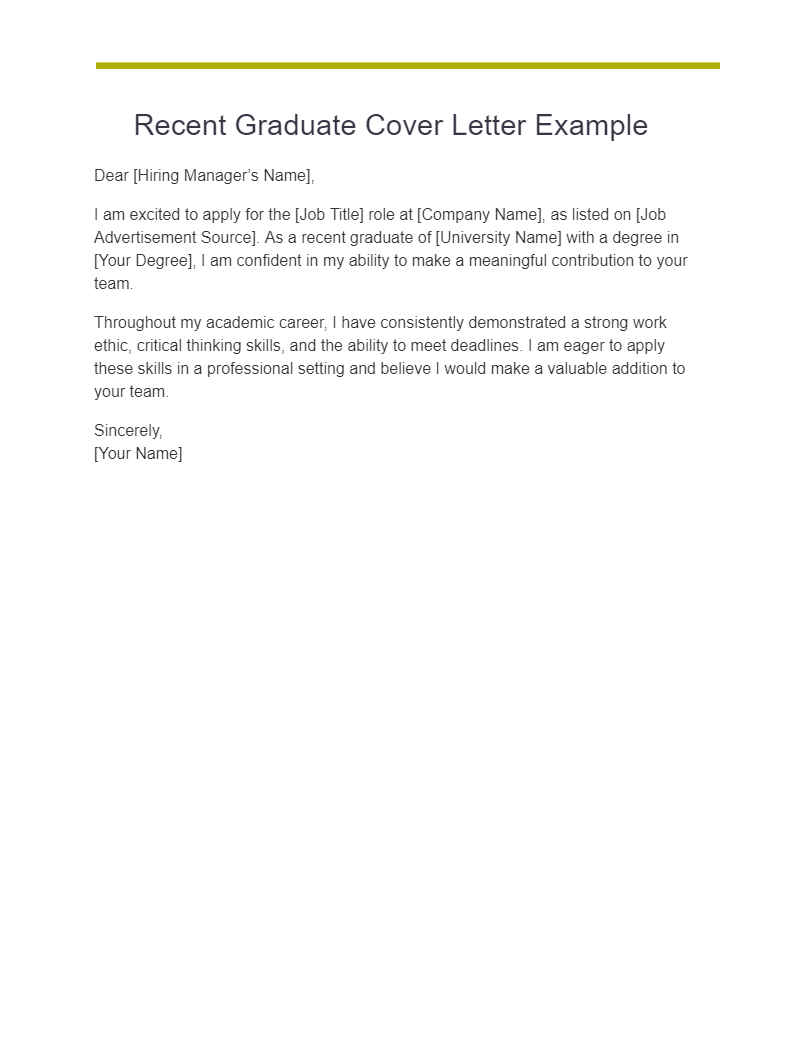
Fresh Computer Science Graduate Cover Letter Example
A cover letter for a Computer Science graduate would highlight programming skills, problem-solving abilities, and project experience. Here’s a sample:
I am writing to apply for the [Job Title] position at [Company Name], as advertised on [Job Advertisement Source]. As a recent Computer Science graduate from [University Name], I have a solid foundation in data structures, algorithms, and software engineering principles.
I have honed my coding skills through a variety of group projects and independent work, using languages like Java, Python, and C++. Additionally, my experience as an intern at [Company Name] allowed me to develop my problem-solving skills and learn to collaborate effectively with a team.
How to Use: Personalize this letter by including the specific programming languages and tools you’re familiar with. Mention any internships or projects that provided practical experience.
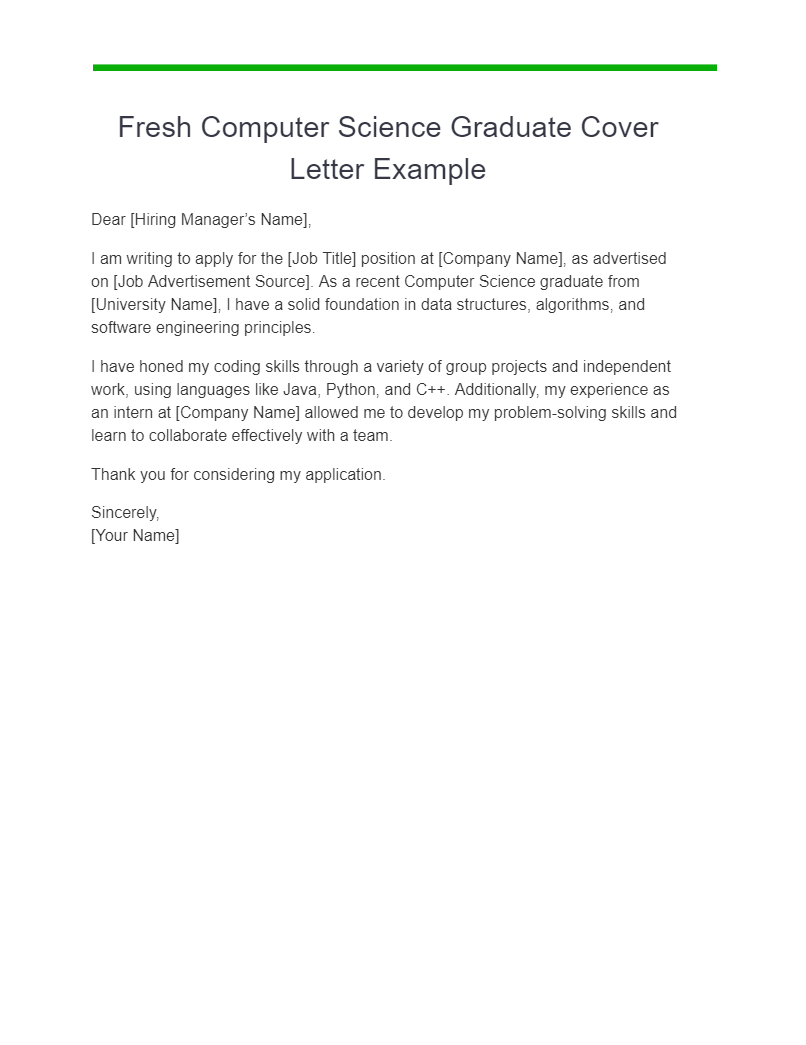
How do you Write a Cover Letter for a Fresh Graduate?
1. Start with a Formal Greeting: Address the hiring manager by their name, if it’s known. Otherwise, use a generic greeting like “Dear Hiring Manager.”
2. Open with Enthusiasm: State the position you’re applying for and express your excitement about the opportunity.
3. Highlight Relevant Skills and Experiences: Discuss your academic achievements, internships, and any skills that make you a good fit for the role.
4. Show Your Knowledge of the Company: Demonstrate that you’ve researched the company and explain why you’re interested in working there.
5. Close with a Call to Action: Thank the hiring manager for considering your application and express your interest in discussing the position further.
Tips for Fresh Graduate Cover Letter Format
1. Keep It Brief: Limit your cover letter to a single page.
2. Use a Professional Tone: Write in a formal, respectful tone. Avoid using slang or overly casual language.
3. Customize Each Letter: Tailor each cover letter to the specific job you’re applying for. Highlight the skills and experiences that are most relevant to the role.
4. Proofread: Ensure your cover letter is free of spelling and grammar mistakes. Consider having someone else read it over as well.
Writing a cover letter as a fresh graduate can be a challenging task. However, by carefully highlighting your academic achievements, skills, and enthusiasm for the role, you can make a strong impression on hiring managers. Remember to tailor each cover letter to the specific job you’re applying for and to proofread carefully.
Text prompt
- Instructive
- Professional
Write a cover letter for a college student applying for an internship at an educational technology company
Form a cover letter for a high school student seeking a part-time job at a local bookstore.
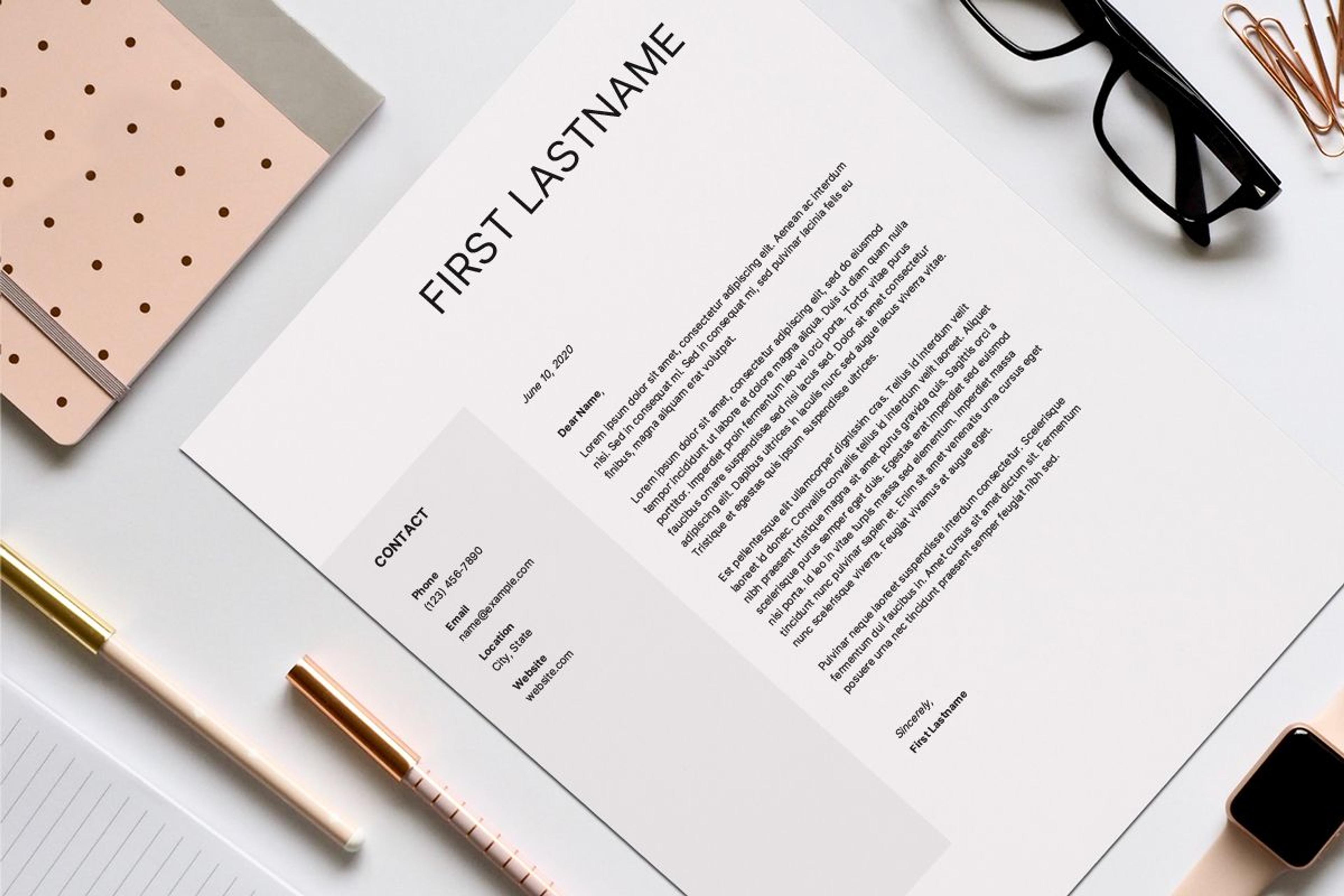
Free cover letter template for students and new grads
Download this professional cover letter template to boost your job applications.
A well-written cover letter will make your job application stand out to employers. But how do you organize a cover letter and what should you include? We’ve created a professional template that you can download to create a letter that will impress recruiters. And be sure to download our corresponding resume template so your application looks seamless.
Want personalized guidance on your cover letter? Don't forget to consult your school's career services center !
The sections of the cover letter are:
Contact information: Include your first and last name, city and state, phone number and email address. You can include an additional link, like an online portfolio, if relevant to the role you’re applying for.
Greeting: A personalized cover letter goes a long way, so try to find the name of the hiring manager and address the letter to them. If you can’t find their name, “Dear Hiring Manager” will suffice.
The introduction: The opening paragraph should get the attention of the reader and make them want to learn more about you. You can briefly explain why you’re excited to apply for the job, or tell a short story that is relevant to the position. Make this as personal as possible, and explain how the role connects to your passions and interests! This is also a great place to mention if you're met the recruiter (or someone else from the company) at a career fair or another networking opportunity.
Your skills and experience: The main section of the cover letter summarizes your relevant skills and experiences . Be sure to include industry-specific or technical skills needed in the role. You can talk about your soft skills like leadership or communication, with examples of times that you’ve demonstrated them. Use the STAR method to tell an effective story about how you've applied your skills. Don't just repeat your resume—use this as a chance to show off your personality as well.
Closing: End your cover letter by thanking the employer for considering your application. Let them know you look forward to discussing your experience, or similar statement of interest in next steps. Sign your letter politely: ”Sincerely” or “Best regards” are common send-offs.
To create your cover letter using the template:
- View the template document here .
- Click File in the upper left-hand corner.
- Select Make a Copy in Google docs or Download as a Word document.
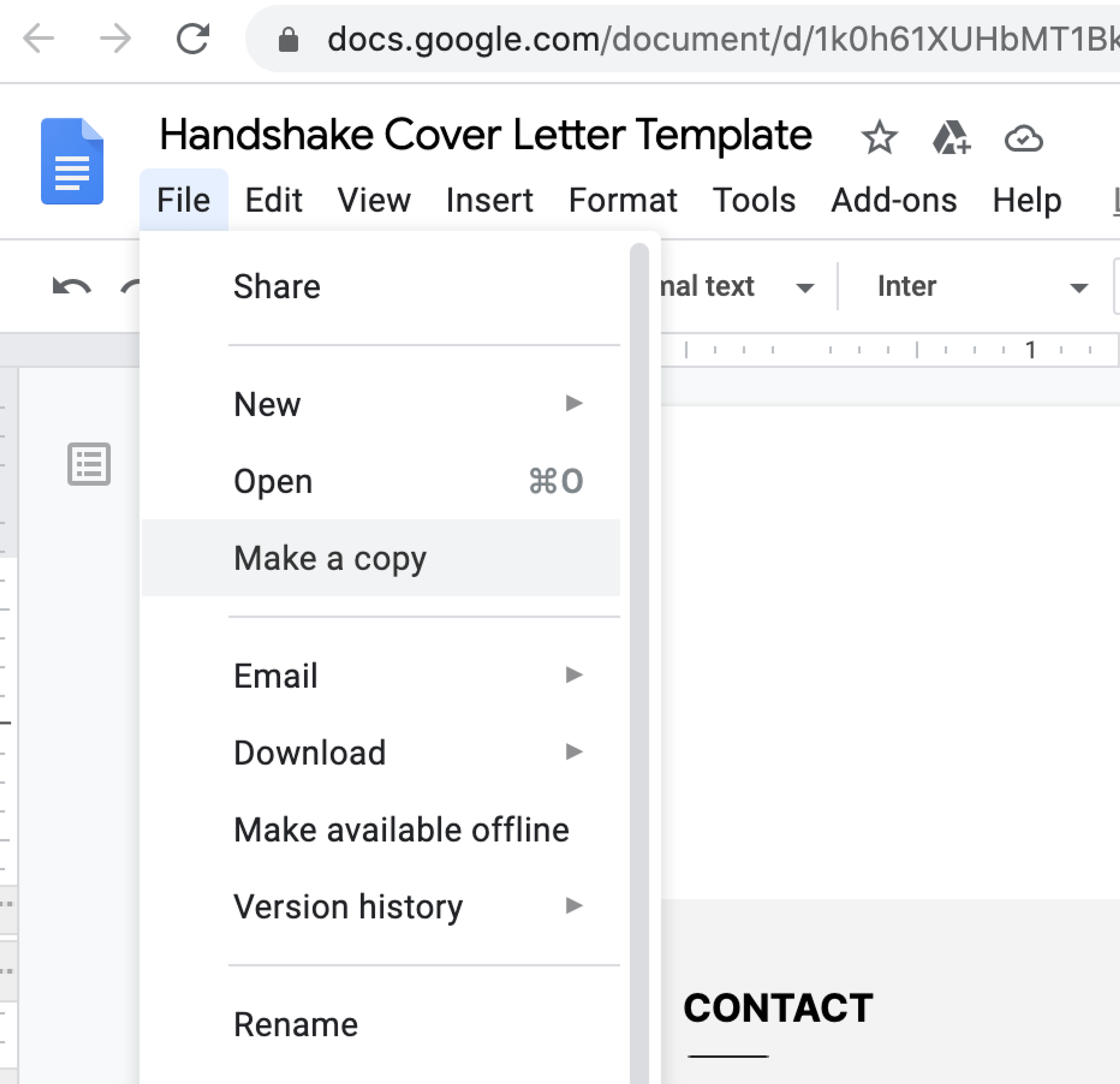
4. If you made a copy, create a name for it and click OK .
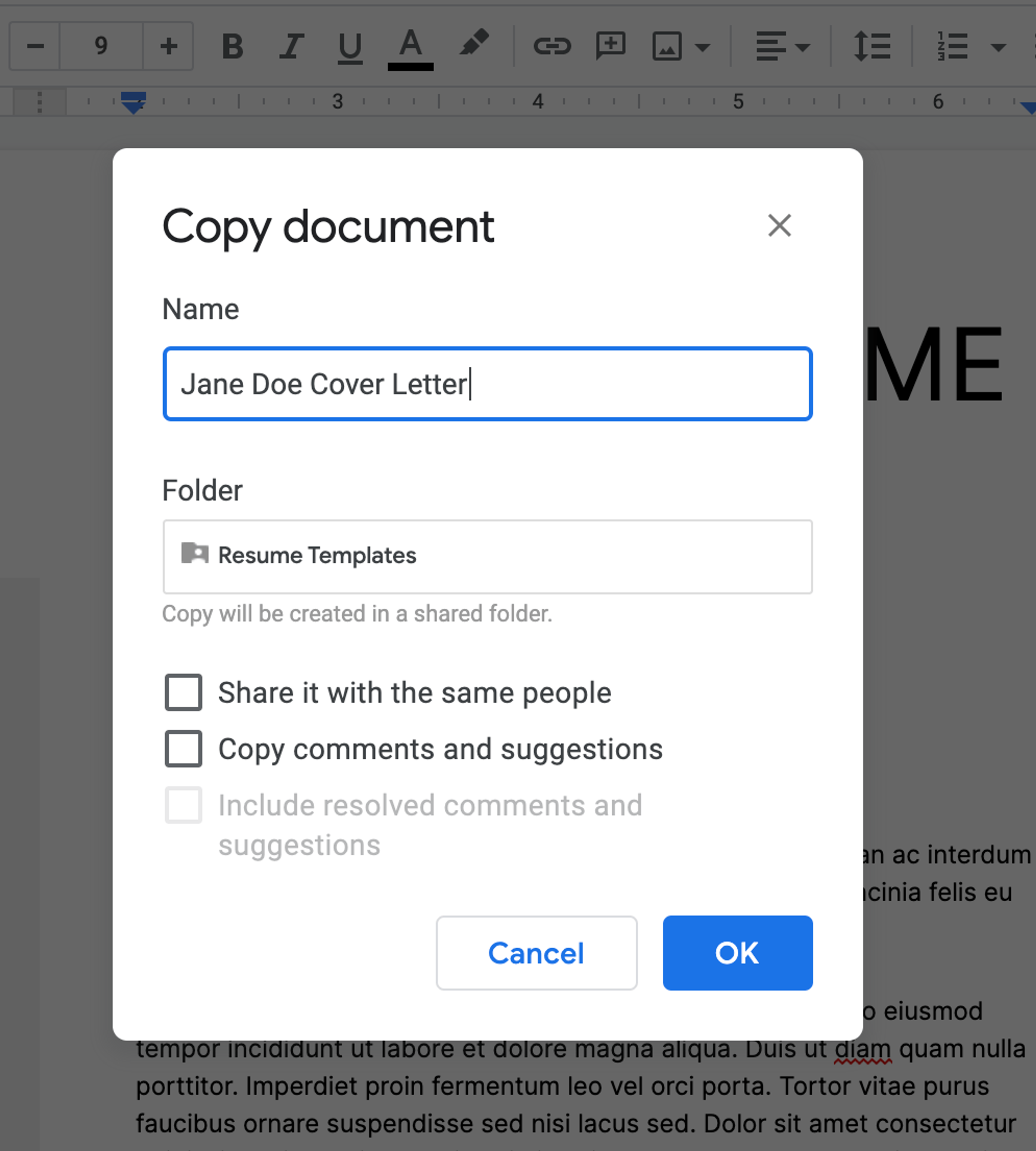
- Write your cover letter, and tailor it for each application. (That includes changing the greeting, job title/company, as well as any examples and stories to make sure they are the most relevant ones for the role). Be sure to use clear file names so you never get your cover letters mixed up.
- Save as a PDF and upload to your Handshake profile to include it in your application!
Find the right jobs for you. Get hired.
Related stories, most recent stories.
- Resume Templates
- Resume Examples
- Free Resume Builder
- How to Write a Resume
- Resume Format
- Resume Packs
- Cover Letter Templates
- Cover Letter Examples
- Free Cover Letter Generator
- How To Write a Cover Letter
- CV Templates
- CV Examples
- Free CV Maker
- Resume Help
- Cover Letter Help
- Job Interview
- Career Advice
Cover Letter for a Recent Graduate: Sample and Tips
You have completed a degree — an impressive accomplishment. Now, it’s time to find that first career position, and you are “ready to roll.”
What you don’t have is work experience to put on that resume and to appeal to it in a potential job interview. So you will have to be creative and focus on your coursework and other activities that relate to any opening you intend to apply for.
Be realistic about the openings you go after. You will need to look for entry-level positions and assess if your core competencies match the describe duties. But we all know that those entry-level jobs are very competitive.
While your resume will look much like that of others applying for those same positions, you can stand out with a cover letter. One that showcases your unique personality, soft skills, enthusiasm, and overall “fit” for the position.
Recent Graduate Cover Letter Example (Word version)
Below is a cover letter example for a recent graduate in accounting.
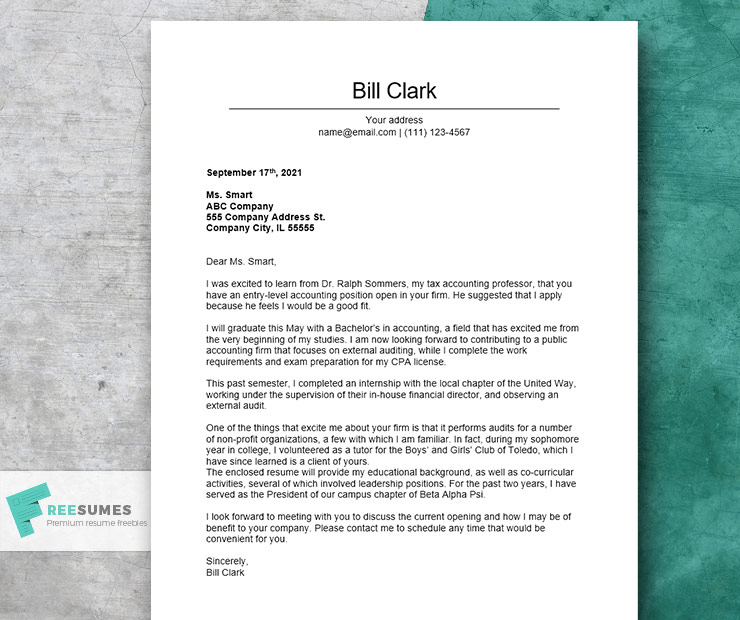
Download cover letter example (.docx)
Sample Cover Letter for a Recent Graduate (text version)
Dear Ms. Smart,
I was excited to learn from Dr. Ralph Sommers, my tax accounting professor, that you have an entry-level accounting position open in your firm. He suggested that I apply because he feels I would be a good fit.
I will graduate this May with a Bachelor’s in accounting, a field that has excited me from the very beginning of my studies. I am now looking forward to contributing to a public accounting firm that focuses on external auditing, while I complete the work requirements and exam preparation for my CPA license.
This past semester, I completed an internship with the local chapter of the United Way, working under the supervision of their in-house financial director, and observing an external audit.
One of the things that excite me about your firm is that it performs audits for a number of non-profit organizations, a few with which I am familiar. In fact, during my sophomore year in college, I volunteered as a tutor for the Boys’ and Girls’ Club of Toledo, which I have since learned is a client of yours.
The enclosed resume will provide my educational background, as well as co-curricular activities, several of which involved leadership positions. For the past two years, I have served as the President of our campus chapter of Beta Alpha Psi.
I look forward to meeting with you to discuss the current opening and how I may be of benefit to your company. Please contact me to schedule any time that would be convenient for you.
Sincerely, Bill Clark
How to Write a Cover Letter as a Recent Graduate
The sample above is short, sweet, yet rather memorable. Why? Because the author mentions specific details about the company and showcases how their experience perfectly matches the company values.
By the time the recipient of your letter has read it, they should know who you are, why you are applying for this position, why you believe you are a fit for this organization, and that you have the skills to fulfill the requirements of the job.
To draft a similar cover letter, take a close look at these great tips.
Do Your Research
You must demonstrate that you have had enough interest in this company to research it and to know a bit about its mission and its major focuses . In the case of the letter above, the applicant knows that the company performs external audits and that it does so for some non-profit organizations. For your letter, try to find a “connecting point” too and bring that up in relation to your personal interests and/or career objectives.
Drop a Name if You Can
Note in the letter above that the candidate learned about the opening from one of his professors. It is quite likely that some people in the firm know this individual, so it is appropriate to drop the name. As a side here — be certain to ask the individual if you can use them as a reference .
Back-Up Statements with Facts
If you state that you have coursework or activities that relate to the position opening, state them specifically, to prove your point. In the cover letter sample for recent graduates above, the internship with a non-profit and the position as an officer with a student accounting association are the perfect details to include.
Refer to Your Resume
Your cover letter should not repeat the information in your resume . The goal of the letter is to engage the reader and generate enough interest that they will be motivated to open up that document and learn more about you. Still, you should point the reader in the direction of your resume for more detail regarding statements you make about your background and qualifications.
Final Thoughts: Perfection is a Must
The smallest error in grammar, sentence structure, or punctuation may seem minor to you, but it isn’t to a reader who is considering job candidates. They want to see the attention to detail and a candidate who has taken the time to review, edit, and ensure that the cover letter is perfectly written. Use basic software editing tools such as Grammarly or Wordtune . Ask a friend, a uni career counselor, or a mentor to review your letter too.
The bottom line is this: Be absolutely certain that letter is perfect before you click that “send” button.

Elena runs content operations at Freesumes since 2017. She works closely with copywriters, designers, and invited career experts to ensure that all content meets our highest editorial standards. Up to date, she wrote over 200 career-related pieces around resume writing, career advice... more
you might also like

CNA Cover Letter Example (+Writing Tips)

Firefighter Cover Letter Example (+Tips)

Production Manager Cover Letter Example And Tips

Compelling Cover Letter For Research Internship: Example & Tips

Veterinarian Assistant Cover Letter: Examples and Tips
Leave a response cancel reply.
- Explore Majors
- Explore Careers
- Become Career Ready: Skills Employers Seek
- Write a Resume, CV, or Cover Letter
- Network with Professionals
- Prepare for an Interview
- Gain Experience
- Find an Internship or Co-op
- Prepare for Graduate School
- Faculty & Staff
- Parents & Families
- Career Champions
- Agriculture, Animals, Food, and the Environment
- Arts, Media, and Communication
- Business, Finance, Sales, and Marketing
- Doctoral Degree
- Education and Sports
- Government, Public Administration, and Law
- Healthcare and Wellness
- Innovation and Entrepreneurship
- Let’s Explore
- Non-profit, Social Service, and other Careers for the Common Good
- Science, Data, and Technology
- Sustainability, Conservation, and Energy
- What are Affinity Communities
- Asian and Asian American Community
- Black Community
- First-Generation Students
- International Students
- Latine Community
- Middle Eastern and North African Community
- Native and Indigenous Community
- Neurodiverse Community
- Religiously Affiliated
- Students with Disabilities
- Undocumented and DACAmented Students
- Veterans and Service Members
- Request a Workshop
- Request Access to a Module
- Career Events
- Career Fairs
- On-Demand Webinars
- Special Events & Series
- Events for Graduate Students
- Outcomes Data Collection
- Undergraduate Student Outcomes
- About Work+
- Work+ for Students
- Work+ for Supervisors
- Our Vision, Mission, and Values
- Awards, Presentations & Memberships
- Professional Staff
- Graduate Assistants
- Student Interns
- Student Ambassadors
- Work at the Center

Graduate Student Résumé & Cover Letter Guide
- Share This: Share Graduate Student Résumé & Cover Letter Guide on Facebook Share Graduate Student Résumé & Cover Letter Guide on LinkedIn Share Graduate Student Résumé & Cover Letter Guide on X
A U.S.-style résumé is typically a document that presents critical and relevant information to the reader or external audience. For current graduate students or recent alumni, a U.S. résumé is typically a one to two-page document that highlights educational background, experience, accomplishments, skills, and knowledge. The length varies from one to two pages depending on the industry and depth of one’s experience. Knowledge of content expectations within your field is critical. Your résumé is the most important document in marketing yourself professionally with a singular goal of getting you an interview.
Office Hours: 8AM – 5PM Career Coaching Hours: 8AM – 5PM * Evening appointments vary by semester. * If you require an accommodation to utilize any resource or to participate in any event, please contact our office.
(860) 486-3013 career@uconn.edu
Center for Career Development Wilbur Cross Building, Rm 202 233 Glenbrook Road U-4051 Storrs, CT 06269
- Explore Your Interests
- Create a Resume or Cover Letter
- Expand Your Network
- Search for a Job or Internship
- Prepare for a Career Fair
- Prepare for an Interview
- Negotiate an Offer
- Professional Readiness
- Prepare for Graduate School
- Find Funding Opportunities
- Fellowships
- Summer Experience Grant
- Agriculture, Food, and Natural Resources
- Architecture, Planning, and Design
- Business and Finance
- Communications, Media, and Entertainment
- Computing, Information Science, and Tech
- Education and Academia
- Energy, Environment, and Sustainability
- Engineering and Manufacturing
- Fashion and Textiles
- Government, Policy, and International Relations
- Healthcare and Medicine
- Hospitality
- Human Resources and Human Capital
- Real Estate
- Science and Biotechnology
- Social Impact
- Asian and Asian American
- Black and Black American
- First Generation
- International
- Latinx and Hispanic
- Neurodivergent
- Students with Disabilities
- Undocumented and DACA
- Women Identifying
- For Employers
- Undergraduate
- Undergraduate Students
- Graduate Students
- Faculty and Staff
- Parents and Families
- Colleges & Schools
- Central Career Team
- Central Career Student Team
- Employer Relations
- Diversity Commitment
- Accessing Services
- Campus Liaison Program
Cover Letters Module and Templates (Toolkit)
- Share This: Share Cover Letters Module and Templates (Toolkit) on Facebook Share Cover Letters Module and Templates (Toolkit) on LinkedIn Share Cover Letters Module and Templates (Toolkit) on X
In this Cover Letters module, you will learn:
- How to identify different types of cover letters.
- How to make a positive impression through your correspondence.
- Guidelines and tips for writing strong letters.

This page has been archived and is no longer being updated regularly.
How to write an impressive cover letter
Great cover letters are key to getting your job application to the top of the candidate pile. Here's how to make yours shine.
By Laura Zimmerman, PhD
Print version: page 32

Your curriculum vitae might showcase your incredible accomplishments, but it won't help you land your dream job if no one reads it. It takes an enticing cover letter to make you stand out as the best applicant.
"Cover letters tend to be the first thing people read. It may be the only thing they read carefully," says Elizabeth Morgan, PhD, assistant professor of psychology at Springfield College in Massachusetts. "Job ads don't always ask for a cover letter, but applicants should always send one, even if it is not required."
"The cover letter is a great opportunity to make a first impression," says R. Eric Landrum, PhD, professor of psychology at Boise State University. Landrum and Morgan co-authored the book, "You've Earned Your Doctorate in Psychology … Now What?" (2012) a guide for graduate students seeking jobs in academic and professional settings. They devote an entire chapter to creating the perfect cover letter.
While students are usually ready to leave graduate school with a professional and polished CV, they might be unclear about how to write a cover letter, says Landrum.
A few simple guidelines can help students get their applications to the top of the applicant pile instead of tossed in the trash:
Show you are a good fit.
"A good cover letter is one that clearly addresses the job ad and shows the applicant's qualifications," says Morgan. Another good quality of cover letters, she says, is conveying genuine interest and enthusiasm in the institution and the work.
"Don't just say ‘I'm interested in your position, attached is my CV,'" says Landrum. "That's a wasted opportunity." Instead, take the time to research the position and the university or organization and create a cover letter that makes it clear you are qualified for the requirements listed in the job ad.
"If a school is looking for a social psychologist experienced in cultural issues, but you are a cognitive psychologist who specializes in memory processes, you probably won't get far," says Morgan. "But, if you specialize in memory and also have experience with cultural research, put that in the cover letter."
Also, mention every job ad requirement that matches your experience, even if it is also mentioned in your CV, says Nabil El-Ghoroury, PhD, associate executive director of APAGS. "If you don't have a particular skill, don't mention it. But, don't wait for a 100 percent match to apply. Employers know that most people won't meet all the requirements."
Get past the gatekeepers.
Your cover letter may be read first by a human resources professional or a department staff member who is looking for key words from the job ad. "Literally, take the words right from the ad," says El-Ghoroury, and weave them into your cover letter. Without the key words, your application may not get passed along to the hiring decision-makers.
Because staff members without psychology backgrounds might be the first to look at your cover letter, it is important to write it for nonacademic audiences, says El-Ghoroury. "Have a friend who works outside the field of psychology read it, to see if it is understandable."
It's also important to tailor your cover letter to your specific audience. "One size does not fit all," says Landrum. Cover letters differ based on the type of job opening, so it's important to customize it to fit academic, clinical, government or other professional positions. "Have a professional in the field to which you are applying review the letter and tell you the conventions for that field," advises Morgan.
Professionals can also provide advice about acceptable cover letter page lengths for their particular field. "Cover letters can range from a quick introduction to four or five pages," says Morgan. "It's the one item with the most variability."
For instance, industry cover letters generally should not exceed one page, while academic cover letters can range from two to five pages; however, many websites advise not going over two pages.
Even when applying to universities, the focus of the cover letter depends on whether the university has a research or teaching focus, says Mitch Prinstein, PhD, distinguished professor and director of clinical psychology at the University of North Carolina at Chapel Hill.
For research institutions, applicants should include a paragraph that explains their research programs.
"The research should have clear follow-up research questions that could last for decades," says Prinstein, who regularly gives talks and has written extensively about professional skills development for graduate students. "Universities don't want to hire an applicant for one or two years, but for decades. Research programs need to have legs."
Almost every job in academia also wants teaching experience, says Prinstein. "Saying you've taught courses isn't good enough." Instead, he says, "Describe what kind of teacher you will be, what your teaching philosophy is, how your teaching will benefit the students."
Mind the details.
Be sure to proofread your cover letter. Read it aloud and have an advisor review it. This can help prevent such errors as missing punctuation or naming the wrong school or organization when sending out multiple cover letters.
Some selection committee members may stop reading a cover letter if the applicant botches the name or location of the school, Landrum says. "If you can't get the place I work correct, how can I trust you with other details?"
"Also, double check other facts about the school," he adds. "For instance don't say you are looking forward to teaching in a university's undergraduate and graduate programs if they only have undergraduates."
Take care to use the correct title when addressing the letter's recipient. "Don't address the administrative assistant as doctor," says Morgan. "Look up the person online and find their title."
Don't get too personal.
While it is important to tell your story in your cover letter, be careful not to share too much information, says Morgan. For example, don't say, "My wife and I just divorced and I want to move as far away from her as possible." But some personal information can help you. If an applicant says, "We have family in Massachusetts, so we are excited to move there," this would explain why an applicant wants to move from Hawai'i to the Massachusetts area, and shows their interest in the location as well as the job, she says.
Overall, a key goal in cover letters is to show you can meet the employers' needs and bring something new and exciting to their university or organization, says Prinstein. "A good cover letter connects your past to your future and tells the story of how your past will influence your future."
Cover letters are your chance to "tell the story of your CV," says El-Ghoroury. "If your research has evolved over time, you can tell that story in your cover letter. Make it easy for employers to see that you are a good fit for the job."
Letters to the Editor
You are using an outdated browser. Please upgrade your browser to improve your experience.
The Cover Letter
The “berkeley” factor, introduction, closing/enclosures.
The reception your cover letter will receive is more varied and unpredictable than the other elements of your application packet. Some readers, especially at large research universities, will skip it entirely, and focus instead on more direct indicators of your academic achievements and potential: the CV, letters, and writing sample. Most often, however, your cover letter works in tandem with your CV, and represents your best opportunity to communicate directly with your target audience prior to an interview.
The cover letter should not simply repeat the information contained in the CV; rather it should elaborate and frame the aspects of your academic training and background that you want search committee members to have uppermost in their minds as they consider your candidacy. At a minimum, it should contain a clear statement of your research and teaching interests, and how your qualifications match the requirements of the job description. Many disciplines have their own conventions and protocols for application materials including the cover letter. Be sure to show a draft of your letter to your chair or the department’s placement advisor.
There is no perfect or even preferred style of cover letter save that tone should be that of a confident professional. Departments aren’t interested in hiring graduate students (they already have enough of those). They are looking for serious scholars/teachers who will make interesting, congenial, and productive colleagues. While it is probably not a good use of your time to tailor your letter for each opening, you will probably need at least two base versions that emphasize different elements (You would not want to use the same cover letter to apply to Oberlin as UC Irvine). You may want to customize the letters for the three to five jobs most attractive to you.
Your cover letter should not exceed a page and a half or two at the most. No one will read a four-page letter, and your apparent inability to communicate your credentials in a concise manner is not to your advantage. Every line of your letter should serve a demonstrable purpose. Some people have gotten excellent jobs with a brief, boilerplate letter containing no more than a short intro, a paragraph on their research, and a couple of sentences on their teaching. Others use letters that discuss in very specific terms how they, their research, and their teaching would “fit” within the existing department and institutional setting. The choice of style is up to you, and should reflect what makes you feel most comfortable and most positive about your credentials.
There are, however, circumstances where a longer, more annotated version is more likely to be helpful. The issues you should take into account when making this decision are:
- The size of the department/institution
- The extent to which your research is mainstream and its significance readily apparent
- The extent to which your qualifications diverge from those mentioned in the job ad
- The extent to which the institution to which you are applying differs from UC Berkeley and the relative importance of teaching versus research
- Unusual circumstances or career paths
Size matters. The larger the department, the less detailed your letter needs to be. If there are already six people working in your sub-field, they can assess and translate the significance of your work to others in the department. If, however, you will be the only history of science person or the only physical anthropologist in the department, the search committee and others will likely need more help from you to understand the import of your work. Remember, if they are searching for your specialty they are understaffed in your area, and even if there is more than one person in your sub-field she/he may be on leave or otherwise uninvolved in the search.
Similarly, smaller departments are more likely to be concerned than larger ones about the specific courses you are prepared to teach. If there are certain core courses your position needs to cover, make it unambiguously clear that you are prepared to do so even if you haven’t taught them already.
As a rule of thumb, the more your profile diverges from the specifics of the job description (or the norm, such that it exists), the more likely you will want to say more about why you are nonetheless a strong candidate. By doing so you can turn a question mark into an advantage. Highlight your strengths, and if you have time perform a little research on the department (see below) so you can explain how you would add to the department in ways that they might otherwise not have considered. Job descriptions are not always etched in stone. Share your list of college/university openings (along with the names of search committee chairs) with your faculty. If they know someone in the department, they may feel comfortable reaching out, either to give you an added plug, or learn more about where their colleague believes the department is headed and what they’re looking for in an ideal candidate. They may well be willing to sacrifice a course in an area that the ad specified in order to get the extra teaching experience or innovative research that you have to offer, but only if you give them the opportunity and explain what they’d get in return.
If you’ve taken an unusually long time to finish because you spent three years learning a new language in order to prepare for two years of original research or some other factor that enriches what you have to offer as a teacher or a scholar, let them know about it. Learning a new language, for example, is an indicator of your commitment to serious scholarship. Think of a way to put a positive valence on an aspect of your CV that you believe is likely to raise questions or doubts.
As hard as it may be for not-yet-employed-but-soon-to-be academics like yourselves to believe, there are some individuals and departments that are intimidated by you and your institutional pedigree. There are many fine schools and departments that are convinced that every Berkeley graduate student and postdoc is only interested in a position at Harvard, Princeton, or (hold your nose) Stanford. If it is a small liberal arts college, they may also assume that you view teaching and advising undergraduates strictly as a necessary evil. Ergo, why interview someone who will either look down their nose at us, and/or desert us for greener pastures as soon as their third book has been published and Yale comes calling. They often don’t seem to realize that many Berkeley graduate students and postdocs are sincerely interested in a wide range of academic settings for a variety of reasons (personal and professional), and, perhaps more to the point, Yale rarely “comes calling.” An even greater burden of proof exists if a quick scan of your CV reveals that all of your experience in higher education has occurred in a large, elite, research-oriented setting. How can you overcome this potential obstacle especially if you’re very interested in a school that you have reason to believe may be suspicious of Berkeley PhDs?
It’s probably not advisable to write in a cover letter that they shouldn’t be intimidated by lil’ old you (i.e., “I’m really not very good; in fact, my advisor says I’m her worst graduate student in twenty years.”), but there are ways to indicate a sincere interest in their department. One means is to do a little research, and briefly discuss how you might fit into the department and the institutional community-at-large. There are numerous articles written by faculty about the search process that state explicitly the positive impact it can have on their impression of a candidate to see evidence that he/she has taken the time to learn something about them. Researching a department and its associated programs/research centers has never been easier.
A second way to address fears of imminent flight is to provide evidence of ties to the area, the university, or lifestyle. If you are from the Midwest, have family nearby, or even if you just spent an enjoyable summer there, add a line about it and your desire to return to your cover letter for Purdue or Wayne State. If you did your undergraduate work at a similar type of institution, draw their attention to that link. Don’t assume that they will notice where you got your BA on your CV, and make the connection.
If you are applying to small, liberal arts colleges, don’t just list the courses you’ve taught with a line of boilerplate about how important you take your teaching responsibilities to be. These days, a good, small college has a list price of about $35,000-$75,000 a year, and close contact with people like you is one of their key selling points to parents and potential students. You are expected to be more than a lecturer, and your ability to convey your recognition of that fact and a sincere interest in working closely with students matters. Advising, participating in non-academic activities, watching your students grow and mature inside the classroom and out (and having an influence on that process) can be among the most rewarding aspects of the profession. If you value these broader elements of being a professor, let them know. In particular, if your own experience has been limited to large universities, think about describing an episode where you had a positive impact on the development of a student and the satisfaction you derived from helping him or her. At many small colleges, and large universities (including Berkeley) as well, one of the most significant pedagogical trends is fostering greater student involvement in faculty research. If you can articulate how this might occur for you and their students in a brief but thoughtful manner, it can alleviate some of the concerns occasioned by your Berkeley background.
Your letter typically will have four segments: the introduction, research, teaching, and the closing.
Be sure to identify the position you are applying for by rank and sub-field in the first sentence or two. It is not uncommon for departments to be engaged in more than one search in a given year, and large departments may have more than one in your sub-field. If it is an open rank position and you are applying as an assistant professor, in most cases you and your record of accomplishments will not be directly compared with those of more experienced candidates applying for it at the associate or full professor level. Rather, applicants are assessed based on where they are in their career path, and you have every chance of successfully competing against them.
In addition to identifying the job for which you are applying, the first paragraph serves as an introduction – your “speed dating” commercial: what are the three broad aspects of your background that you want to be clear in their mind as they make the decision whether or not to devote more time and attention to your application?
The first aspect is that you come from Berkeley, and hence one of the strongest programs in your discipline (e.g., I am in the final stages of completing my dissertation at UC Berkeley). The other two aspects that you can briefly highlight are those elements that you believe represent your strongest qualifications for the position and that, potentially, differentiate you from other candidates in the pool. For example, if the ad specifies that they are looking for someone whose research is interdisciplinary and who will strengthen a new research center focused on conservation biology, let them know in this initial paragraph that you fit the bill. Conversely, if you are applying to a small liberal arts college and you attended a similar type of institution as an undergrad, point that out here.
Ask yourself what are the three things I want a search committee member to know about me before she/he decides whether or not my file stays in the active pile, and describe them briefly in this first paragraph. Briefly; you will have space to elaborate more fully in the paragraphs below. Here, you just want to catch their attention and provide them with cause to pay closer attention to the text that follows.
If you’ve finished, mention it up front. If not, state when you expect to file – no later than the June before you would start the position. Many readers will view your optimistic prediction with a skeptical eye, and anything you can say that makes the claim appear more credible (e.g., “I have written and my chair has reviewed four of the six chapters.”) can help mitigate their concerns. You can put such a statement in the introduction or wait until you discuss the dissertation itself.
If your discipline holds its annual meeting in the summer or early fall (i.e., before application deadlines) and you had an excellent conference interview, make reference to it in the cover letter including the names of the faculty with whom you spoke. By the time people actually start to read files, months may have passed and even the strongest of impressions can fade. But they can be rehabilitated and revived, especially if you can remind them of a specific strength, ability, or issue that seemed particularly salient during the interview.
Unless you are applying to a school that cares only about your teaching (increasingly rare), a description of your research generally follows next. The challenge here is not simply to describe your research, but to frame it in terms of your sub-field and discipline. The search committee hasn’t lived, eaten and breathed Post-Edwardian Hermeneutics for the past five years the way you have. And they haven’t been there every step of the torturous process like your friends and significant others. So forgive them for not immediately recognizing your research at first blush for the path-breaking work that it is.
Departments want to know that in hiring you, they are adding someone who will make a future contribution to the discipline and enhance the reputation of the department. However, they are often ill-equipped to understand exactly how that will be true in your particular case. Many disciplines are sufficiently broad that leading or cutting-edge research in one sub-field is barely intelligible to those in others. In addition, when you become a candidate for the short list, your file will be read by department members outside your specialty, and, oftentimes later on in the process, by individuals outside your discipline as well. You need to describe the forest in which your tree resides, and explain why it matters in terms of the broader trends and issues within your discipline. Obviously, if your work is focused on one of the classic conundrums of your field, much less in the way of providing perspective is necessary than if you are addressing an emergent issue or employing an unconventional approach.
If your research is particularly novel or cutting-edge, any markers of broader acceptance by other, more established scholars or scholarly organs in your field can ameliorate possible concerns about its relevance and potential importance. In discussing your work, note the recognition it has received in the form of competitive grants, awards, publications in refereed journals, and/or presentations at major conferences.
It is also important to mention where you expect your research to go after the completion of your dissertation and the publications that will flow from it. They, especially at research-oriented institutions, want to know at least in broad terms where you expect to go from here. They want to see evidence of a scholarly agenda that extends beyond the dissertation or postdoc project. You don’t need to have pages written or titles blocked out, but you need to tell them in a paragraph, (two at the most) about what questions intrigue you, and how you expect to go about finding the answers to them. These questions for future research may have been generated by the findings of your dissertation, unusual data uncovered during your fieldwork, or interesting side issues that you were forced to put off in order to keep your dissertation taut and focused. Think twice about mentioning future projects that appear entirely unrelated to your current work. Departments will want you to be firmly established in one area before you go off into another.
The relative importance of teaching versus research is a continuous and not a discrete variable. Even schools that emphasize teaching in their job listing will generally want evidence of scholarly engagement and publishing potential. It is a very competitive market for undergrad and grad students out there, and virtually all institutions are under pressure to sell themselves via the quality of their faculty to the limited number of good students in the applicant pool. A good marker for the relative importance of teaching versus research is the teaching load. An institution with a 3-2 teaching load (a total of five courses taught per two-semester year) will expect more in the way of and value research more highly than one with a 3-3 load.
If you work in a capital-intensive area, mention your track record of gaining grants and other sources of external funding.
In a similar fashion, the more the institution you are applying to diverges from Berkeley and the more your profile differs from the job description, the more expansive you should be in talking about your teaching and what you have to offer their students. If you have won a teaching award at Berkeley, don’t make them wait until they read your CV to discover that fact.
For letters sent to large universities where you will be expected to teach large lecture courses and graduate seminars, little is needed except to convey that you have the necessary experience and/or background. Since the dominant pedagogical style is the same as that found at Berkeley, it will be assumed that you will be able to do the same for them. Still, rather than list off a series of courses you are prepared to teach (which should be included in an Areas of Teaching Interests section of your CV), devote a couple of sentences to demonstrating in qualitative terms how you are thoughtful and effective in your teaching. Instead of just stating: “I want all of my students to be able to utilize the concepts in class to better understand the world around them (not untrue, but still a cliche).” Provide a concrete illustration: for example in an intro to sociology class, I had my students observe X and Y in downtown SF and draw inferences about Z.
If you have TA’d some of the courses that (based on the job description) you would be expected to offer, let them know. If you have not had that opportunity, but your fields and research fall within the domain of the job description, you may want to add a line about how well prepared you are to teach such courses based on your training and research.
If your profile does not correspond exactly to the description found in the job announcement, but you believe that you could nonetheless teach the required courses, explain the basis for your confidence. What strength would you bring to the department that would more than make up for your “otherness”? Departments may decide that they don’t “need” another conventional European historian if you can convince them that you can handle the core courses and offer something new that they don’t currently cover as well. In this case especially, think about doing some research so you can speak in more specific terms about how you would fit into and enhance the department’s offerings. Help them visualize how you would strengthen them as a department.
Small colleges will want to know that you are able to teach on a more intimate basis and are prepared to take the time to do it well. If you give them three generic lines about how “important” you consider your teaching responsibilities, don’t expect much of a positive response. Spend a couple of paragraphs describing your teaching experience and philosophy, and how you would take advantage of the opportunity to create your own courses.
If you’ve had the opportunity to design and teach your own course, tell them, briefly, how you went about it and the choices you made. Don’t just say you’re a good teacher, show them why. Look over your teaching evaluations and pick out one or two consistent strengths to highlight. Drawing on your experience, talk about how you engage students and enhance their skills (especially writing) and intellectual development.
For good, small colleges, the quality of the teaching offered to students is their stock-in- trade. Even the most research-oriented, small colleges take teaching undergraduates very seriously. You need to demonstrate that you take it seriously as well, and can talk about it using more than vague generalities and shop-worn cliches.
Wrap it up quickly. If you are going to be traveling for any significant portion of the job search season, be sure to let them know how they can contact you (email, cell phone etc.).
Before closing, include a sentence where you list the materials you have uploaded/included (e.g., CV, dissertation abstract, transcripts, teaching statement/portfolio, writing samples, etc.) and are having sent separately (letters of recommendation). You will often be assembling multiple packets at the same time (as in midnight October 14th, midnight November 14th, etc.) for jobs that ask for different combinations of enclosures. In addition to telling them what they should have received, it serves as a handy list for you to check before metaphorically “sealing the envelope.”
Should you send a writing sample, even if they haven’t asked for one? Unless the norm in your discipline is to never send more than they ask for, and you feel the sample represents you and your work to your advantage, by all means send it. That way it’s in the file should someone become interested in you and want to read more.
Berkeley Career Engagement UC Berkeley, CA 94720
- Accessibility
- Nondiscrimination
Privacy preference center
We care about your privacy
When you visit our website, we will use cookies to make sure you enjoy your stay. We respect your privacy and we’ll never share your resumes and cover letters with recruiters or job sites. On the other hand, we’re using several third party tools to help us run our website with all its functionality.
But what exactly are cookies? Cookies are small bits of information which get stored on your computer. This information usually isn’t enough to directly identify you, but it allows us to deliver a page tailored to your particular needs and preferences.
Because we really care about your right to privacy, we give you a lot of control over which cookies we use in your sessions. Click on the different category headings on the left to find out more, and change our default settings.
However, remember that blocking some types of cookies may impact your experience of our website. Finally, note that we’ll need to use a cookie to remember your cookie preferences.
Without these cookies our website wouldn’t function and they cannot be switched off. We need them to provide services that you’ve asked for.
Want an example? We use these cookies when you sign in to Kickresume. We also use them to remember things you’ve already done, like text you’ve entered into a registration form so it’ll be there when you go back to the page in the same session.
Thanks to these cookies, we can count visits and traffic sources to our pages. This allows us to measure and improve the performance of our website and provide you with content you’ll find interesting.
Performance cookies let us see which pages are the most and least popular, and how you and other visitors move around the site.
All information these cookies collect is aggregated (it’s a statistic) and therefore completely anonymous. If you don’t let us use these cookies, you’ll leave us in the dark a bit, as we won’t be able to give you the content you may like.
We use these cookies to uniquely identify your browser and internet device. Thanks to them, we and our partners can build a profile of your interests, and target you with discounts to our service and specialized content.
On the other hand, these cookies allow some companies target you with advertising on other sites. This is to provide you with advertising that you might find interesting, rather than with a series of irrelevant ads you don’t care about.
Graduate Cover Letter Example
Get more job offers & find inspiration for your new cover letter with our free, customizable Graduate cover letter example. Download this cover letter example at no cost or revise it in our powerful cover letter builder.

Related resume guides and samples
How to craft a job-winning instructor resume?
How to craft a compelling professor resume
How to build a professional school counselor resume?
How to write a great special education teacher resume?
How to craft a job-winning teacher resume?
How to build a jaw-dropping teacher assistant resume?
How to write an impressive tutor resume?
How to write a professional youth advisor resume?
Graduate Cover Letter Example (Full Text Version)
Tyler Vader
Dear Hiring Manager,
I am excited to express my interest in the Associate Sourcing Manager position at Terryw, Inc. advertised on LinkedIn.com. With a background in business administration, a strong work ethic, and a commitment to achieving goals, I am confident in my ability to contribute effectively to your team.
My name is Tyler Vader, and I recently graduated with a master's degree in Supply Chain and Operations Management from the University of Wisconsin – Milwaukee. I have been actively involved in various extracurricular activities and received recognition for academic excellence. Through my involvement in group projects and leadership roles, I have honed my teamwork and problem-solving skills.
During my internships in Business Development, I gained valuable experience in implementing new business processes and collaborating with industry professionals. I am a dedicated professional with a passion for technology and science, and I believe that my education, experience, and personal qualities align well with the requirements of the position.
I am eager to discuss how my background and skills can benefit Terryw, Inc. Please feel free to reach out if you need any further information. Thank you for considering my application.

Milan Šaržík, CPRW
Milan’s work-life has been centered around job search for the past three years. He is a Certified Professional Résumé Writer (CPRW™) as well as an active member of the Professional Association of Résumé Writers & Careers Coaches (PARWCC™). Milan holds a record for creating the most career document samples for our help center – until today, he has written more than 500 resumes and cover letters for positions across various industries. On top of that, Milan has completed studies at multiple well-known institutions, including Harvard University, University of Glasgow, and Frankfurt School of Finance and Management.
Edit this sample using our resume builder.
Don’t struggle with your cover letter. artificial intelligence can write it for you..

Similar job positions
Procurement University Student Instructor Teacher Teacher Assistant Social Sciences Student Tutor Entrepreneur / Business Owner Account Manager School Counselor Professor Youth Advisor
Related student resume samples

Related business cover letter samples

Let your resume do the work.
Join 5,000,000 job seekers worldwide and get hired faster with your best resume yet.

- Arts, Design & Media
- Career Exploration
- Government, Policy & Social Impact
- Graduate Business (MBA & SMP)
- Health Care & Sciences
- Technology, Data & Engineering
- Career Assessments
- Career & Major Exploration
- Resumes, Cover Letters & Application Materials
- Graduate & Professional School Preparation
- Job & Internship Search Strategies
- Negotiation & Offer Evaluation
- Professional Conduct
- Bear Treks – Explore Industries
- Chancellor’s Career Fellows Program
- Pershing Fellowship in Non-Profit Leadership
- Stipends for Unpaid Summer Internships
- Schedule a Career Coaching Appointment
- Faculty & Staff
- Attend an Event
- Engage with Students
- Post a Position
- Hiring International Talent
- International Employer Resources in Asia
- Recruiting Calendar
- Recruitment and Offer Policy
- Visiting the Center for Career Engagement
- Hire WashU: Annual Employer Forum
- Career Outcomes
- Center for Career Engagement Leadership
- Academic Partnerships Team
- Career Development Team
- Employer Engagement Team
- Events, Operations & Programs Team
- Student Career Peer Team
Cover letter for students interested in Business

Your cover letter is kind of like the body holding hands with the job description and your resume. It goes between the two to show how you can bring your experiences to do what is expected and add value in the role you seek.
As you construct your cover letters, keep the following in mind:
- Think in terms of THEM: You can think about your cover letter in three parts: why THEM, why YOU for THEM, and next steps. In each of these, you are constantly connecting and tailoring to the role and the organization.
- Build a connection by aligning your values: In the first paragraph, show them that you’ve done your research about them by identifying what resonates with you about their organization and who you’ve connected with to get the “inside scoop” about the culture. Make a personal connection quickly to differentiate your application.
- Show them you’re ready to contribute: In the second section, make your case by identifying how your skills and experience can add value immediately at their organization. Your descriptions should not be the statements from your resume converted into sentence form. Rather, elevate up a level and describe what you got from the experience that equips you to do the responsibilities of the job you seek. Connect your past experiences to the requirements of the job description to make your case explicitly clear.
- Give it your last hurrah: Close the cover letter with the next steps. Appreciate being considered, point them to your resume for a more thorough representation of your experience, highlight why you’re excited about the role, and express your enthusiasm for talking soon. You don’t need to include contact information in this paragraph because it’s included at the top of your page.
There are a lot of opinions and rumors that swirl around cover letters. Some of them may lead you to question if you even need to do one or if you can simply substitute the organization’s name and then reuse the same cover letter for every application. Given that you don’t know how someone will use your cover letter, always make sure you put your best foot forward and make a good first impression. Often, AI scans your cover letter for keywords. Other times, interviewers read your cover letter just before the interview to get a sense of the story you’re trying to tell. So, take the opportunity to advocate for yourself. Make sure your cover letter is free from typos and shows your commitment to the process for that organization uniquely.
Schedule an appointment with a Career Coach to talk about your cover letter in more detail!
Cover letter overview
Sample cover letters.

IMAGES
COMMENTS
A graduate cover letter is a professional document that recent college graduates use when they apply for jobs or graduate degree programs. A graduate cover letter acts as an extension of an individual's resume and includes details about college activities and previous professional experiences. Related: Cover Letter for Graduate School: Tips and ...
Follow these steps to write a cover letter for graduate school: 1. Begin by addressing your cover letter. The first step to writing any cover letter is addressing it properly. You should begin by writing your full name and address. You may also include your phone number or email address on an additional line, but this is optional.
I am available for an interview at your earliest convenience. Kind regards, Mason Harley ¦ 07777777777 ¦ [email protected]. Writing an impressive cover letter is a crucial step in landing a Graduate job, so taking the time to perfect it is well worth while.
Below, we'll walk you through each step of building your recent graduate cover letter: 1. Contact information and salutation. List all essential contact information at the top of your recent graduate cover letter, including your name, phone number, email, and LinkedIn URL. Be sure to address the hiring manager by name — Mr. or Ms.
2518 Lilac Ave. North Charleston, SC, 29405. (803) 847-1043. [email protected]. Dear Ms. Johnston, My name is James Amore, and I'm excited to apply for the position of Junior IT specialist at the French Central Inn, Charleston. I'm a recent graduate (June 2023) in Management Information Systems (MIS) from Charleston Southern ...
Here are some tips you can use to write a compelling cover letter for graduate school: Address someone specifically: Your cover letter should always address a specific individual. Look on the university website or on job-related social media networks to find the name of the graduate program administrator and address your letter to them directly ...
Here are seven tips along with an example of what a recent college graduate cover letter could look like. 1. Tell Them Who You Are. ... or you were in charge of recruiting new students to your student club and increased the membership. Perhaps you had a job where you had to be a data whiz in a fast-paced and collaborative environment and that ...
2. Create a good recent grad cover letter header. Create a cover letter heading with your name and contact information identical to the one on your resume. Include your basic contact details: phone number, email address, and LinkedIn profile. Your home address is optional, put it there only if applying for stiff corporate jobs.
Graduate Cover Letter examples Write the best Cover Letters in 5 minutes 300+ samples and expert guides used by millions of users. ... But there's also some positive news: More and more students are opting to major in creative fields and fields that interest them. And people with college degrees are much better protected against economic ...
Many recent graduate cover letters end up in the bin. Not yours. In this guide you'll find: A recent graduate cover letter example that gets the interviews. A guide on the business cover letter format. A quick new grad cover letter template with blanks that you can have ready inside 15 minutes. Save hours of work and get a cover letter like this.
Write the best graduate cover letter with our perfect graduate cover letter example. Download our cover letter example for graduates and write yours now. ... skill requirements, and career paths for 18-24-year-old students entering the workforce. Read more Why STEM Graduates Should Consider a Career in Teaching. 31/05/2024 Graduate ...
Tips for Writing a Recent College Graduate Cover Letter . Use keywords. Take a careful look at the job description, noting any skills or experiences that the description indicates. Try to include some of those keywords in your cover letter. This will show the employer a connection between your experiences and the job.
As a student, the information you should emphasize in your cover letter will vary depending upon your level of education. Here are examples of effective cover letters created for students at the high school, college, and graduate levels. Recent College Graduate Sample #1. Recent College Graduate Sample #2. Response to Job Posting.
Step 3: Open with a salutation. Once again, because this is a formal letter, you want to open your letter with the appropriate greeting or a personal salutation. If you have the name of a specific recipient, you can use the most common salutation for graduate school cover letters, which is "Dear [recipient's name]."
A fresh graduate cover letter for a bank teller position should showcase your attention to detail, mathematical skills, and any relevant internships or part-time roles. ... Form a cover letter for a high school student seeking a part-time job at a local bookstore. Free Download. Free Interactive Teacher Resources ©2024 Examples.com. All rights ...
To create your cover letter using the template: View the template document here. Click File in the upper left-hand corner. Select Make a Copy in Google docs or Download as a Word document. 4. If you made a copy, create a name for it and click OK. Write your cover letter, and tailor it for each application.
Sample Cover Letter for a Recent Graduate (text version) Dear Ms. Smart, I was excited to learn from Dr. Ralph Sommers, my tax accounting professor, that you have an entry-level accounting position open in your firm. He suggested that I apply because he feels I would be a good fit. I will graduate this May with a Bachelor's in accounting, a ...
Graduate Student Résumé & Cover Letter Guide. A U.S.-style résumé is typically a document that presents critical and relevant information to the reader or external audience. For current graduate students or recent alumni, a U.S. résumé is typically a one to two-page document that highlights educational background, experience ...
In this Cover Letters module, you will learn: How to identify different types of cover letters. How to make a positive impression through your correspondence. Guidelines and tips for writ…
"The cover letter is a great opportunity to make a first impression," says R. Eric Landrum, PhD, professor of psychology at Boise State University. Landrum and Morgan co-authored the book, "You've Earned Your Doctorate in Psychology … Now What?" (2012) a guide for graduate students seeking jobs in academic and professional settings.
Your cover letter should not exceed a page and a half or two at the most. No one will read a four-page letter, and your apparent inability to communicate your credentials in a concise manner is not to your advantage. Every line of your letter should serve a demonstrable purpose. Some people have gotten excellent jobs with a brief, boilerplate ...
STEM letters should not exceed one page. Humanities and social sciences letters may extend up to two pages. Check with faculty in your department. Address to the individual named in the job posting, or with "Dear Members of the Search Committee." The cover letter is a writing sample. It must be good. Proofread and spell check! TIPS
Graduate Cover Letter Example. Get more job offers & find inspiration for your new cover letter with our free, customizable Graduate cover letter example. Download this cover letter example at no cost or revise it in our powerful cover letter builder. This cover letter was written by our experienced resume writers specifically for this profession.
Often, AI scans your cover letter for keywords. Other times, interviewers read your cover letter just before the interview to get a sense of the story you're trying to tell. So, take the opportunity to advocate for yourself. Make sure your cover letter is free from typos and shows your commitment to the process for that organization uniquely.
How to Apply Please indicate your interest by submitting a cover letter and resume electronically using the umjobs.org w... See this and similar jobs on Glassdoor